It seems we can’t find what you’re looking for. Perhaps searching can help.
Sign Up for newsletter!
Subscribe to get the latest eBook!
Hotline






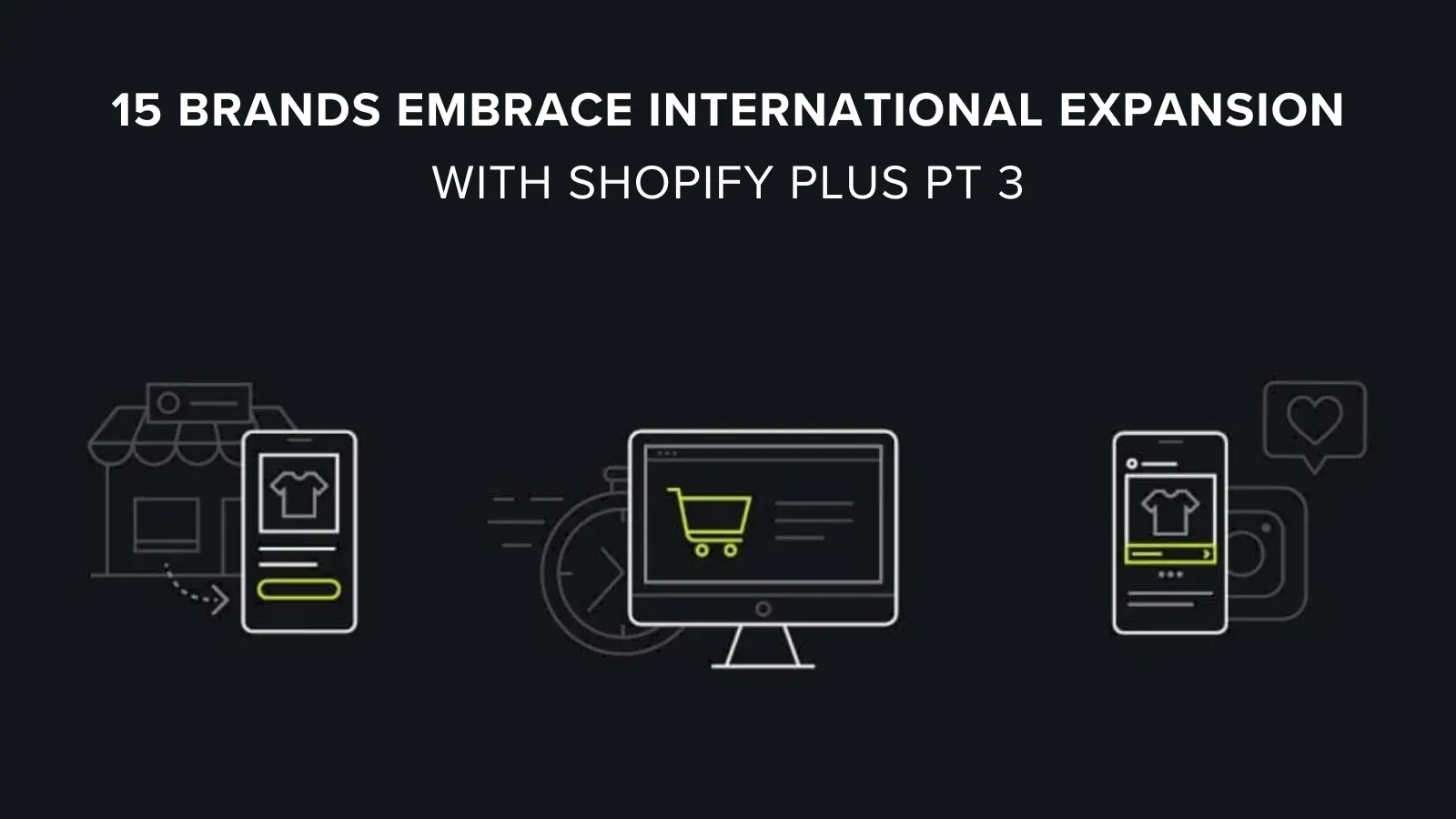
Welcome to the final installment of our three-part series on brands that have successfully embraced international expansion with Shopify Plus. In the previous parts, we explored the journeys of ten dynamic brands that leveraged Shopify Plus to navigate the complexities of global growth. In this concluding chapter, we turn our attention to five more outstanding brands: Ellana Cosmetics, Dollar Shave Club, Daniel Wellington, BONIA, and AIMER.

Dollar Shave Club (DSC) is a renowned American company that revolutionized the personal care industry with its subscription model for razors and personal care products.
Initially, DSC built its own custom eCommerce platform, which provided flexibility and high customization. While this allowed DSC to shape its business model in the digital landscape, managing and maintaining it became complex and resource-intensive over time. As technological solutions like Shopify emerged, offering features and tools that DSC could leverage, the company explored available solutions to integrate them into its existing system. After careful consideration, DSC transitioned to Shopify Plus to better support its profit growth and international expansion goals.
Through Shopify Plus, DSC operates and manages its subscription business model more effectively, integrating multiple applications within the Shopify ecosystem to optimize marketing campaigns and customer care. As a result, DSC reduced system maintenance resources by 40%, reached over 100 million global consumers through ShopApp, swiftly converted international stores to Shopify Plus within weeks instead of months, and increased conversion rates using Shopify’s applications.
Website: dollarshaveclub.com
Industry: Men Health
Traffic: 3.148M/month
Rank: #9,907 (USA) & #50,278 (Global)
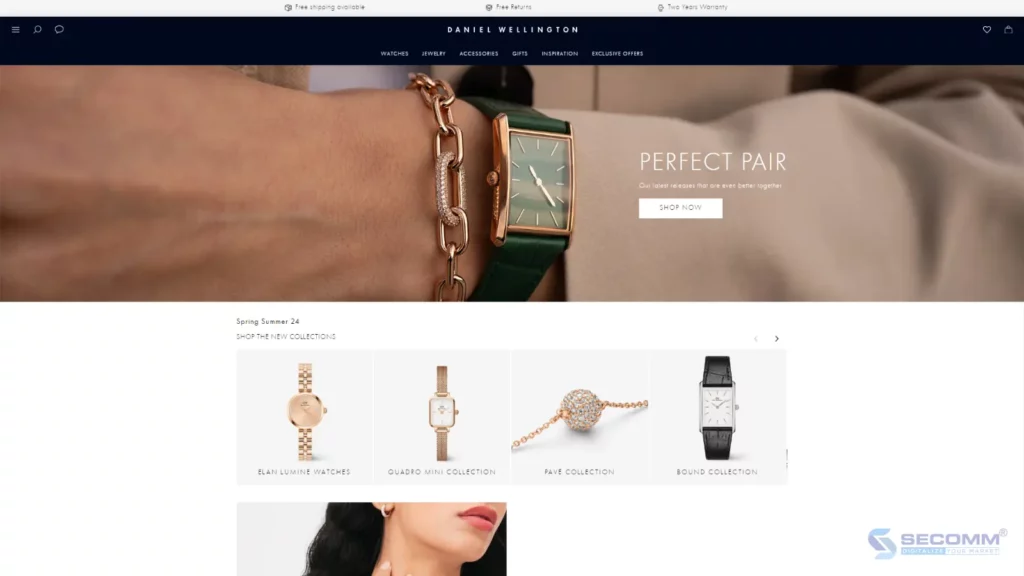
Launched in Sweden in 2011, Daniel Wellington is known for its elegant, minimalist watch designs and superior quality. Before Daniel Wellington adopted Shopify, they faced significant operational challenges, particularly the complexity and cost of their current technology systems, which included an e-commerce platform lacking user interface from CommerceTools and Contentful as their chosen CMS platform. The development and rollout of new features were time-consuming and cumbersome, consuming substantial resources. Additionally, Daniel Wellington used an on-premise ERP system, which increased costs and complexity. With multiple stores and integrated systems, product changes took months or even years to implement, resulting in delayed time-to-market.
Since transitioning to Shopify Plus, all these issues have been thoroughly addressed. Website features that previously took months or even years to develop and launch now take only days or weeks. This practical approach allows for quicker decision-making and agile response based on market dynamics. Other notable outcomes include the rapid launch of 12 expansion stores, a 50% reduction in platform fees, and fewer resource expenditures on maintenance and development compared to before.
Website: https://global.danielwellington.com/
Industry: Fashion
Traffic: 2.773M/month
Rank: #78,900 (USA) & #63,785 (Global)
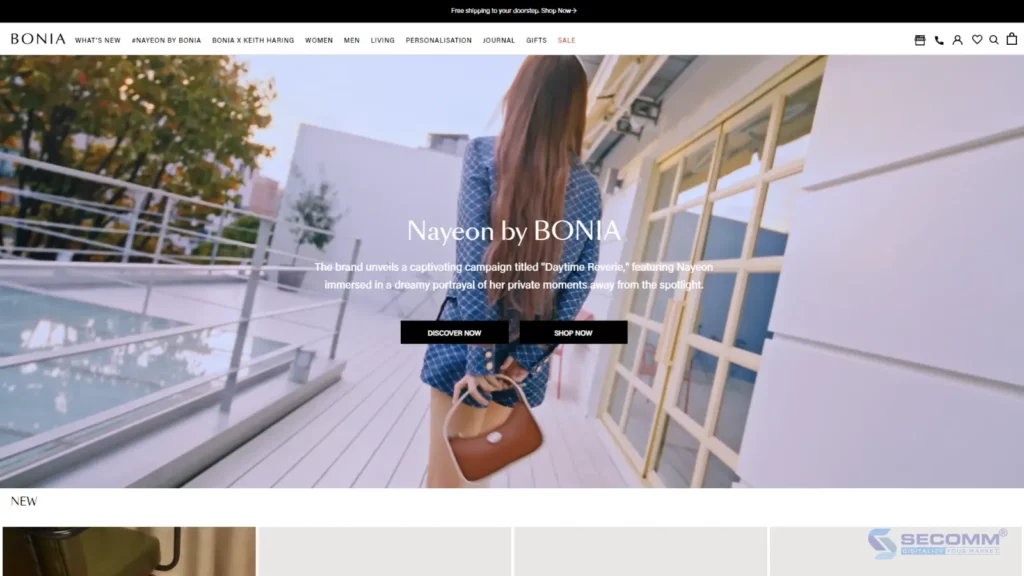
Established in 1974, BONIA has gradually become a prestigious and irreplaceable fashion brand in Southeast Asia. After making the strategic decision to transition from Adobe Commerce to Shopify due to previous challenges with product launch speed and website responsiveness, BONIA aimed to leverage its online presence for international expansion. Recognizing the need to provide personalized experiences for customers while maintaining a consistent brand identity across different markets, BONIA also sought to ensure that managing multiple websites wouldn’t burden its team with excessive time and costs.
Therefore, BONIA upgraded to Shopify Plus. This strategic move enabled BONIA to harness the expansive capabilities of Shopify Plus storefronts, allowing them to establish multiple online storefronts alongside their flagship Malaysian website. Leveraging this capability, BONIA seamlessly integrated themes and layouts from its Malaysian store while ensuring each new store exudes its own distinct charm and is localized to specific locations. This localization was achieved through customized adjustments tailored to each specific region. Shopify Plus’s organizational admin also played a crucial role, providing BONIA with a centralized command center for all its stores.
As a result, BONIA increased its overall revenue by 10% through expansion into Singapore and saw a 25% annual increase in website traffic.
Website: https://bonia.com/
Industry: Fashion
Traffic: 108,842/month
Rank: #27,473 (Malaysia) & #1,510,285 (Global)

In 2007, Ellana Cosmetics was founded with the goal of helping global consumers achieve better skin and improve their skincare knowledge. Recognizing the opportunity to reach more customers online, the brand initially started with a basic HTML website, then moved to Adobe Commerce and later WooCommerce. However, Ellana Cosmetics was dissatisfied with the results these platforms provided. The lack of robust data management tools made it difficult to personalize customer experiences across different markets, resulting in significant online sales losses.
Ellana Cosmetics switched to Shopify when their e-commerce marketing efforts were still in their infancy in the Philippines. This allowed Ellana to strengthen its technological foundation and accelerate growth and efficiency by upgrading to Shopify Plus shortly thereafter. The company leveraged various solutions to optimize managing multiple expanded storefronts, including Shopify Flow. As a result, the average order value increased by 17%, payment failure rates decreased by 40%, and online revenue increased by 50%.
Website: https://www.ellanacosmetics.com/
Industry: Cosmetics
Traffic: 88,075/month
Rank: #61,563 (Philippines) & #2,754,014 (Global)

Founded in 1993, AIMER is one of the leading lingerie brands in China. With over 20 years of experience in designing and creating premium and luxurious lingerie, AIMER takes pride in its continuously evolving creative design team, which has developed more than 400 new products under its five main brands: AIMER, imi’s, LA CLOVER, AIMER Men, and Aimer Kids. Supported by these innovative products, AIMER has established an international presence far beyond its homeland, including regions such as North America, Europe, and the Middle East.
International sales are a crucial part of AIMER’s development strategy. However, the brand faced challenges regarding customization, taxation, and compliance with tax rules. AIMER migrated its platform to Shopify Plus, leveraging its customization capabilities to meet the needs of customers in international markets.
Additionally, utilizing Shopify Plus’s Avalara tax automation feature helped AIMER automatically calculate taxes based on the customer’s international address. Instead of manually calculating taxes, Shopify Plus accurately computed taxes for each order based on the latest tax regulations of the target market and automatically added taxes to the final checkout page, ensuring transparency in tax costs for consumers.
As a result, AIMER saw a 105% increase in monthly site visits, a 57% increase in monthly conversion rates, and a 62% increase in monthly page views.
Website: https://aimeronline.com/
Industry: Fashion
Traffic: 32,449/month
Rank: #51,992 (Hong Kong) & #1,948,207 (Global)
Final Words
In this final part of our series, we’ve delved into the inspiring journeys of Ellana Cosmetics, Dollar Shave Club, Daniel Wellington, BONIA, and AIMER. These brands exemplify how leveraging Shopify Plus can transform the challenges of international expansion into opportunities for growth and success.
As we conclude our series, it is evident that the journey to international expansion is complex but highly rewarding with the right tools and strategies. For brands looking to embark on this path, the experiences of 15 success stories will provide valuable insights and inspiration.
Need a deep consultation? Contact SECOMM for free!
 2
2
 191
191
 0
0
 1
1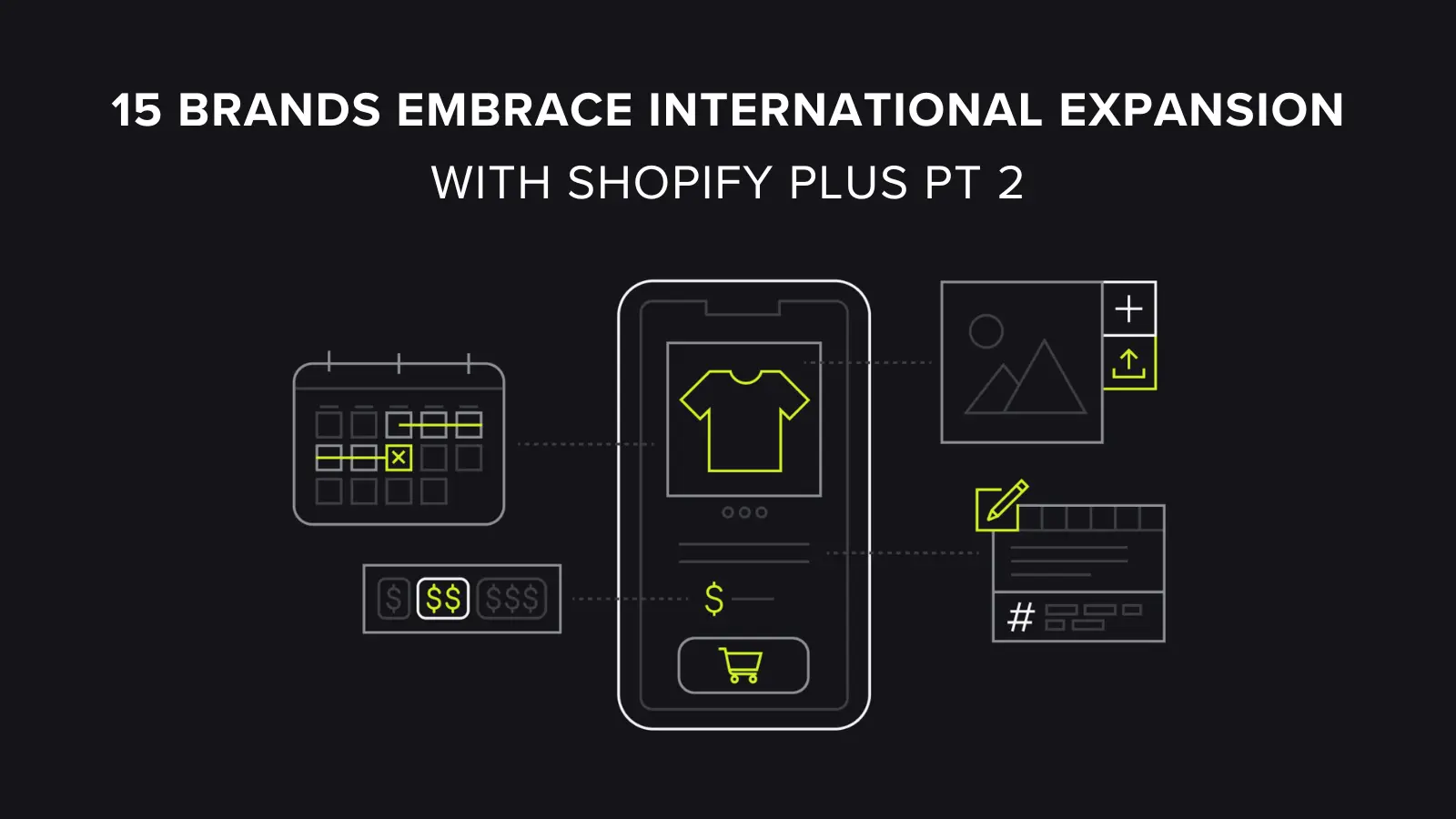
In Part 2 of our series, we delve into the journeys of Oh My Cream, Koh, LSKD, Glamlite, and GIVA. Each of these brands brings unique offerings to the global market, from skincare and household products to activewear and gourmet cosmetics. We explore how these companies have navigated the complexities of international expansion, overcoming challenges and seizing opportunities with the support of Shopify Plus.
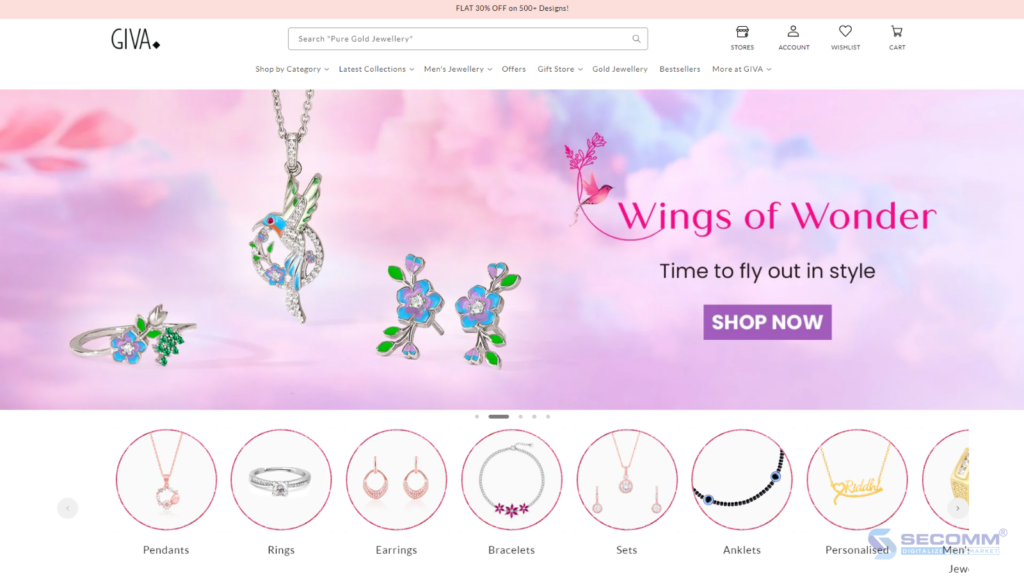
GIVA is India’s leading brand for providing luxurious and elegant gold and silver jewelry at affordable prices. Since its launch in 2019, the brand has been loved by both domestic and international customers. Consequently, within just four years, the company achieved remarkable growth, leading to the need for a more robust eCommerce system.
Initially, GIVA’s D2C system operated on Shopify, but to handle the large and increasing volume of transactions, the company upgraded to Shopify Plus. Through Shopify Plus, GIVA quickly launched additional stores in the USA and Sri Lanka, and also set up an expansion store for its sub-brand, AVNI.
GIVA leveraged the exclusive Shopify Plus feature, organizational admin setting, to seamlessly and efficiently perform actions across multiple stores, rather than managing each store individually. As a result, GIVA experienced a 100% year-over-year revenue increase compared to 2021, a 193% increase in its global customer base from April 2021 to April 2022, and reached customers in three different geographical regions.
Website: https://www.giva.co/
Industry: Jewelry
Traffic: 7.160M/month
Rank: #1,523 (India) & #21,585 (Global)

Founded in 2007, LSKD (short for ‘Loose Kid’) is an Australian-based apparel brand specializing in high-quality athletic wear with a street style and a focus on fitness functionality. Although LSKD began as a wholesaler, it has since reinvented itself as a vibrant consumer-oriented brand with online retail at the core of its operations. The company has also made a name for itself in physical retail, opening several stores both domestically and internationally.
As LSKD planned its international expansion into the United States, the brand aimed to ensure a highly personalized customer experience. Despite having a system capable of serving shoppers in multiple countries, LSKD needed a more flexible and easily manageable system. Consequently, LSKD transitioned to Shopify Plus and used the expansion store feature to quickly and easily create a new store targeting the US market. Using the online store in the US as a springboard, LSKD opened a physical store in San Diego and pop-up shops at sports events nationwide. All these operations were smoothly run on Shopify POS.
Website: https://www.lskd.co/
Industry: Fashion
Traffic: 2.112M/month
Rank: #1,182 (Australia) & #70,075 (Global)
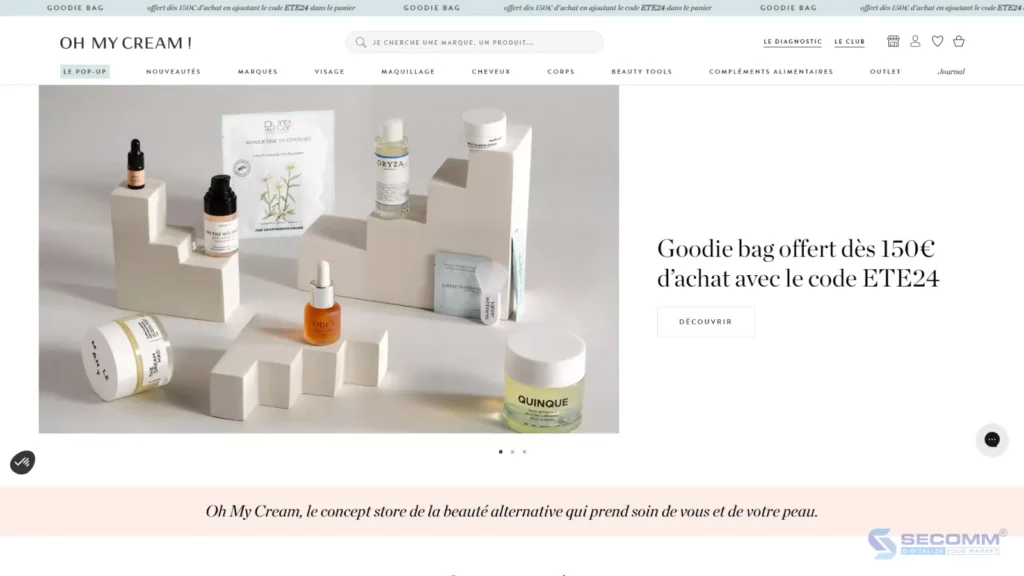
Oh My Cream is a French cosmetics brand founded in 2012, with an omnichannel strategy as its core focus. Oh My Cream currently operates both physical stores and an eCommerce website. As of now, the company has expanded internationally with over 20 retail stores, including two in London, and a bilingual website.
To customize and optimize the omnichannel experience, Oh My Cream implemented Shopify Plus. The unique and superior omnichannel features of Shopify Plus met Oh My Cream’s expectations. Additionally, Oh My Cream transitioned its outdated payment system to Shopify POS to collect more comprehensive customer data. After optimizing the omnichannel experience with Shopify Plus, Oh My Cream increased the average customer lifetime value by 50%, the average basket value by 25%, and enhanced data collection to implement a loyalty program.
Website: https://www.ohmycream.com/
Industry: Cosmetics
Traffic: 602,976/month
Rank: #7,537 (France) & #180,940 (Global)
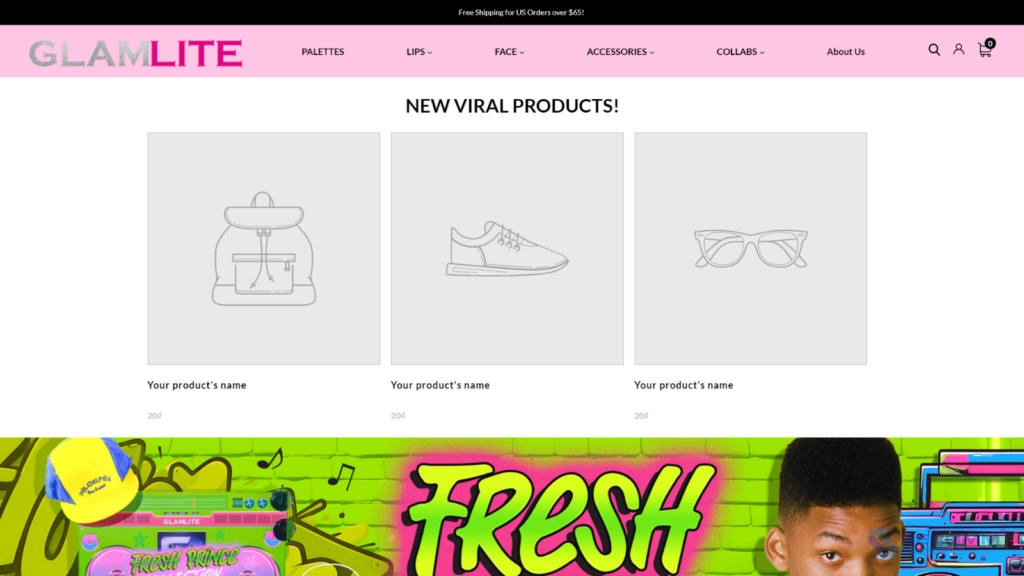
Glamlite, a cosmetics brand founded in 2018 in Los Angeles, is renowned for its colorful lipsticks and eyeshadow palettes. Glamlite launched its e-commerce website using Shopify Plus from the beginning and initially sold products internationally. However, their growth rate was not promising due to high USPS shipping costs, long delivery times, and the inability to track international packages.
The lack of international tracking by USPS left Glamlite and their customers unaware of the whereabouts of shipments, with some customers never receiving their orders. Unsurprisingly, Glamlite’s customer retention rate and international sales were significantly lower than expected. However, after implementing Shopify Market Pro, Glamlite overcame these issues, resulting in:
Website: https://glamlite.com/
Industry: Cosmetics
Traffic: 376,734/month
Rank: #56,604 (USA) & #316,746 (Global)
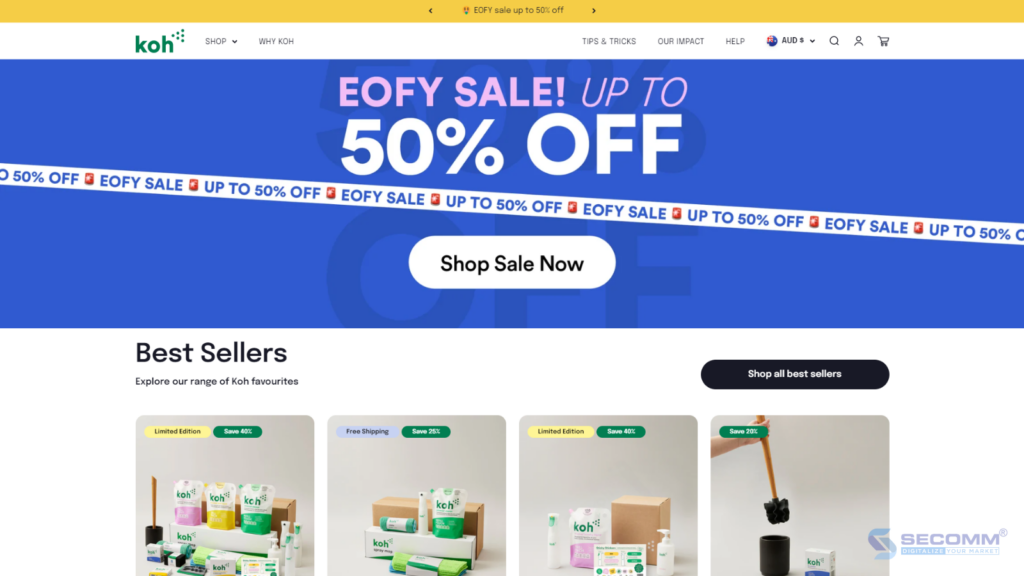
Koh is a brand specializing in producing and supplying chemical-free, eco-friendly cleaning products. Two years after its establishment, Koh achieved $50 million in revenue. The eCommerce website was converting well but started to look outdated. The product line was also expanding, creating opportunities for upselling, cross-selling, and promotions that were not being fully utilized. Global expansion was also on the agenda, and Koh’s founder, Alexander, wanted a solution that would allow Koh to grow without limitations.
After operating on Shopify for some time, Koh decided to upgrade to Shopify Plus. The expansion store feature of Shopify Plus enabled Koh to scale seamlessly into new regions with custom payment tools to improve conversion rates. For example, Koh could customize the checkout process using third-party apps like Rebuy for comprehensive personalization, upselling, and cross-selling with A/B testing, and Klaviyo for better product recommendations. Finally, the Launchpad scheduling tool allowed the team at Koh to quickly set up and schedule promotional and sales events.
Website: https://koh.com/
Industry: Home and Garden
Traffic: 371,270/month
Rank: #5,902 (Australia) & #310,539 (Global)
Final Words
The stories of Oh My Cream, Koh, LSKD, Glamlite, and GIVA showcased in Part 2 of our series exemplify the dynamic possibilities that emerge when innovative brands embrace Shopify Plus for international growth. From pioneering new markets to enhancing customer experiences through tailored eCommerce solutions, these brands have demonstrated resilience, creativity, and strategic foresight in their expansion efforts.
Stay tuned for Part 3 of our series, where we’ll uncover more success stories and strategies as brands continue to thrive with Shopify Plus on their path to global expansion.
 2
2
 171
171
 0
0
 1
1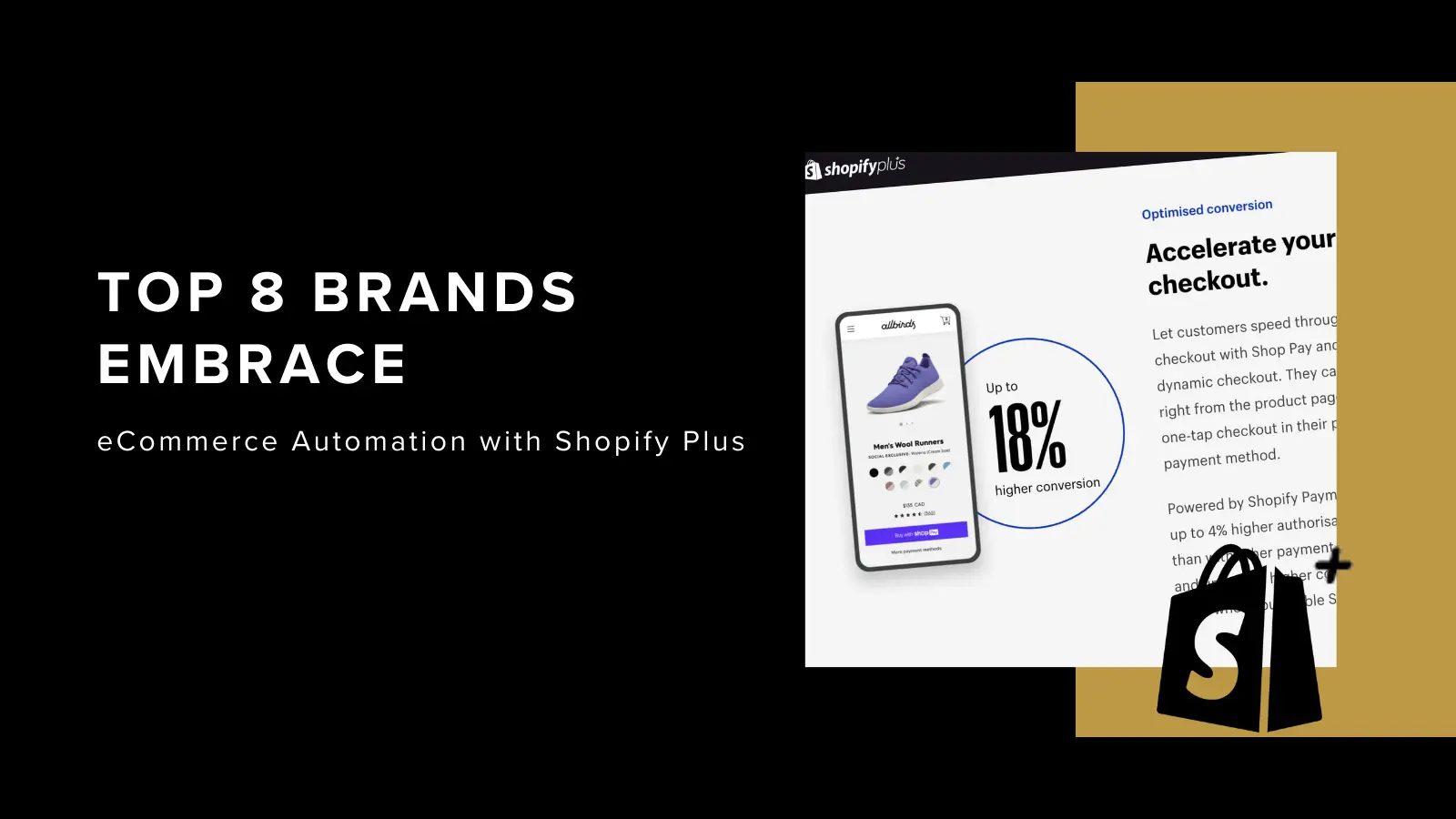
In today’s digital age, eCommerce automation not only helps businesses optimize their sales processes but also creates a seamless shopping experience for customers. Shopify Plus has become one of the most popular SaaS eCommerce platforms, helping both large and small brands automate and enhance their business efficiency. Below is a list of leading brands that have successfully automated their eCommerce with Shopify Plus.

Good American, the renowned fashion brand co-founded by Khloé Kardashian, achieved $1 million in sales on the first day of operating its sales system on the Shopify Plus platform. Building on this success, the brand established multiple automated processes to eliminate manual tasks, allowing its team to focus on providing customers with a rich shopping experience and excellent support services.
Good American utilized Shopify Flow to automatically tag products as “Out of Stock” on their website for items that are sold out and “Low Stock” for items that have reached a certain inventory threshold. This not only improved inventory management but also encouraged customers to purchase items that were running low. Additionally, for out-of-stock products, customers could sign up to be notified when the items were back in stock, helping Good American reclaim potential lost sales.
With Shopify Flow, Good American was able to create nine automated processes in less than a day, significantly contributing to the overall efficiency of their eCommerce operations.
Website: https://www.goodamerican.com/en-vn/
Industry: Fashion
Traffic: 2.9M/month
Rank: #9,462 (USA) & #48,565 (Global)

Boody is an Australian brand specializing in eco-friendly clothing, founded in 2012. After operating on the complex Magento platform for several years, the brand decided to switch to Shopify Plus for its specialized solutions and user-friendly interface. This transition allowed Boody to easily customize and provide their customers with a more engaging and seamless online shopping experience while expanding into international markets.
After switching platforms, Boody leveraged Shopify Flow to automate several key eCommerce processes, including order processing, email marketing, payments, and inventory management. This automation enabled Boody’s team to focus more on business strategies and market expansion. As a result, Boody has expanded to 10 different international stores and increased its online revenue share from 0% to 70%.
Website: https://www.boody.com.au/
Industry: Fashion
Traffic: 1.1M/month
Rank: #1,420 (Australia) & #85,881 (Global)

Paperlike is known for producing and supplying accessories for iPads. Given the small team and limited technological resources at Paperlike, operational efficiency is a top priority for their eCommerce activities. After running their eCommerce website on the standard Shopify platform for a long time, Paperlike switched to Shopify Plus to find solutions to handle their increasing sales volume.
Despite having a small team, Paperlike successfully operates their Shopify Plus store thanks to unique automation tools such as Flow, LaunchPad, and Script.

Since its establishment in 1971, Mandaue Foam has become an indispensable name in the furniture industry in the Philippines. After four years of using the standard version of Shopify, Mandaue Foam upgraded to Shopify Plus to seek solutions for expansion and customization.
The brand utilized LaunchPad—a feature exclusive to Shopify Plus—to schedule marketing campaigns and automate product price updates and discounts. Since LaunchPad allows real-time tracking of each campaign’s performance, the Mandaue Foam team could understand customer behavior and adjust their campaigns accordingly.
Additionally, using Shopify Flow, Mandaue Foam automated their order management process. They created a workflow where, once an order is placed, one of their 28 physical locations with inventory for that product is notified to process the order. This ensured swift order fulfillment while eliminating the need for manual order tracking.
The platform switch and the implementation of eCommerce automation helped Mandaue Foam achieve a 200% increase in order volume, a 151% year-over-year increase in total sales, and a 16% increase in customer return rate.

Fathead is a provider of decorative products and decals featuring famous cartoon characters, superstars, and top athletes. The eCommerce system at Fathead encountered numerous issues over time, including frequent errors, poor performance, and time-consuming manual processes.
To address these challenges, Fathead decided to migrate to Shopify Plus for its easy and flexible customization options on a user-friendly interface. Fathead leveraged Shop Pay to simplify the checkout process, providing a streamlined shopping experience and boosting conversion rates. The brand also utilized Shopify Flow to set up multiple automated processes, including optimizing order processing. As a result, Fathead increased average order value by 46%, conversion rates by 10%, and overall revenue by 50%.
Website: https://fathead.com/
Industry: Sport
Traffic: 478,683/month
Rank: #45,624 (USA) & #268,411 (Global)

Doe Beauty is a beloved Korean cosmetics brand across Asia. From the early days of eCommerce, Doe Beauty built its website on the Shopify platform. Later, witnessing rapid growth and the need for system expansion, Doe Beauty decided to switch to Shopify Plus. Since then, 80% of the operations on their Shopify Plus store have been automated.
Thanks to Shopify Flow, Doe Beauty’s team can focus on creative and strategic business aspects. The order processing and inventory management are optimized and automatically monitored, enabling faster delivery. As a result, Doe Beauty provides customers with a smooth and convenient shopping experience. E-commerce automation with Shopify Plus has helped the Doe Beauty team save an average of 4 hours and increase the average order value by 5%.

For over 60 years, Jack Rogers’ sandals and shoes have been loved by generations of consumers across the United States. Dissatisfied with their existing eCommerce system, Jack Rogers switched to Shopify Plus. This move provided access to a comprehensive infrastructure and outstanding solutions, optimizing inventory management—a persistent issue for Jack Rogers over the years.
After transitioning to the Shopify Plus store, the brand leveraged Shopify Flow to automate several operational processes, freeing their team from time-consuming manual tasks. The intuitive and user-friendly interface of Shopify Plus allowed the Jack Rogers team to easily add and edit products and categories, set up sales campaigns, and run advertisements. This led to remarkable growth in a short time, with website traffic increasing by over 60% and conversion rates by more than 30%.

Cozykids is a popular destination for children’s products in Greece. The old WordPress-based system at Cozykids faced numerous issues due to manual operations and inadequate performance. As a result, Cozykids switched to Shopify Plus in search of a solution for performance and automation problems.
By using Shopify Flow, Cozykids automated inventory management for out-of-stock and low-stock products, eliminating the need for staff to manually monitor inventory levels. Additionally, Cozykids used Flow to automate customer interactions with out-of-stock products, allowing customers to pre-order at a discounted price and sign up for notifications when the products were back in stock. This automation was particularly important for the marketing team, as it helped them know when to stop promoting low-stock items and focus on other products.
For launching and promoting new products, Cozykids used Shopify LaunchPad to automate these processes. With both Flow and LaunchPad, Cozykids increased eCommerce website traffic by 40% and revenue by 80%. Additionally, the automated processes significantly reduced the time staff spent monitoring inventory levels, decreased errors from manual operations, and enhanced operational efficiency.
Website: https://cozykids.gr/en
Industry: Children’s products
Traffic: 61,781/month
Rank: #12,177 (Greece) & #1,386,032 (Global)
Final Words
eCommerce automation not only helps brands optimize their operational processes but also creates a better shopping experience for customers. The aforementioned brands have successfully used Shopify to enhance business efficiency and build customer trust. Shopify has proven to be a powerful and flexible tool, supporting businesses of all sizes and across various industries.
Need advice on implementing eCommerce automation with Shopify Plus? Contact SECOMM today!
 2
2
 157
157
 2
2
 1
1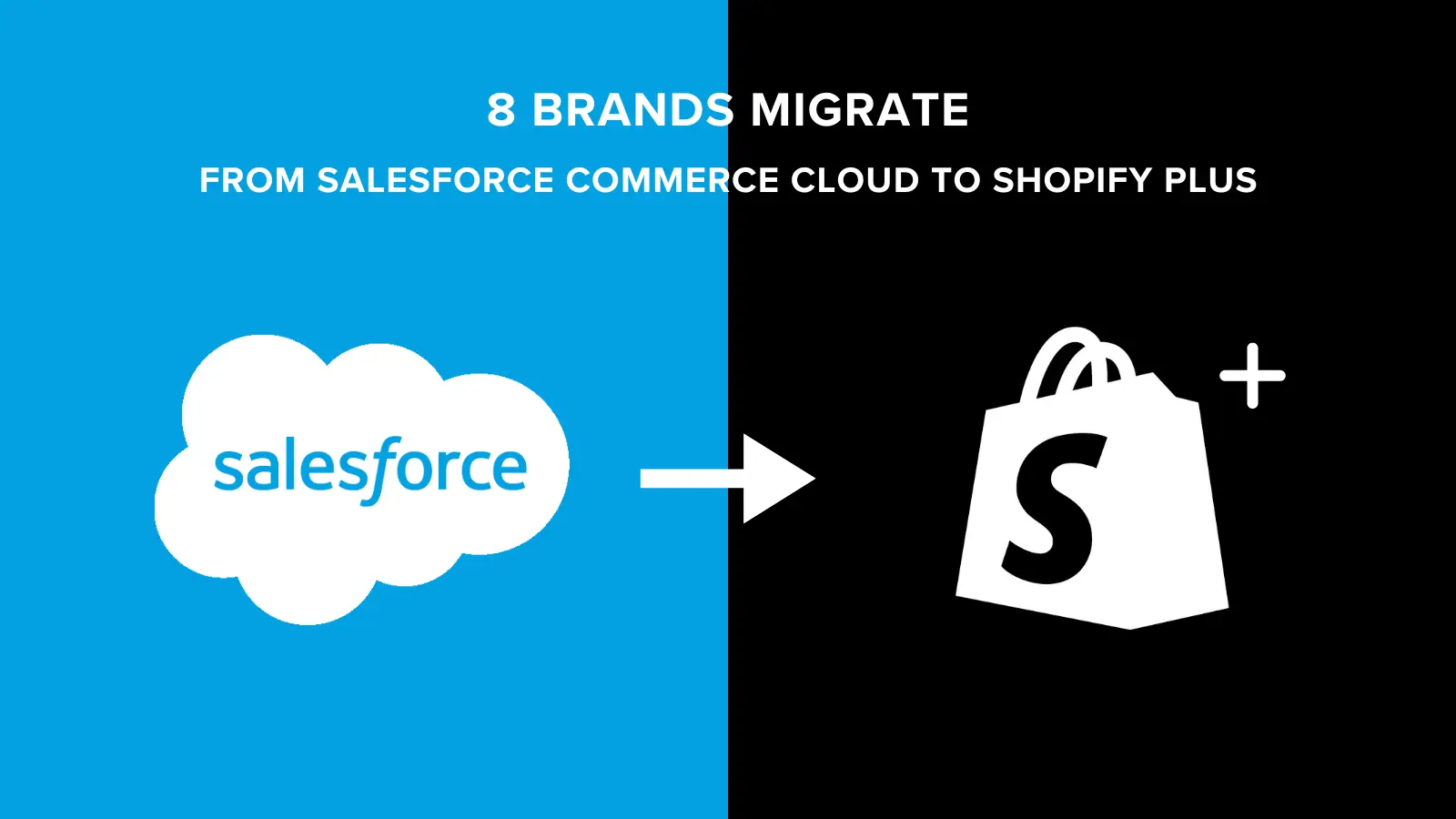
Replatforming is not only a business decision but also creates a leap to help businesses optimize operations and create a competitive advantage in the market. In this article, let’s dive into the journey of 8 iconic brands that have switched platforms from Salesforce Commerce Cloud to Shopify Plus. Not only that, the platform transformation has impacted the development and growth of these brands in the ever-changing eCommerce market.

Established in 1989, famous Italian fashion brand Slam Jam has served many fashionistas around the world. Slam Jam has implemented Omnichannel very successfully on the Shopify Plus platform. However, previously on the Salesforce Commerce Cloud platform, trying to reach an omnichannel approach caused Slam Jam to incur a lot of costs and technical difficulties.
After about a year after transitioning to the Shopify Plus platform, Slam Jam decided to use Shopify POS to increase omnichannel efficiency and build a longer-term omnichannel strategy. This has helped this fashion brand increase its average daily orders by 15%, reducing setup and operating costs by 50%.
Website: https://slamjam.com/
Industry: Fashion
Traffic: 2.3M/month
Rank: #40,182 (USA) & #54,510 (Global)

NYDJ, the fashion brand known for its premium denim and womenswear products, decided to make a big pivot in its eCommerce strategy by migrating from Salesforce Commerce Cloud to Shopify Plus. This decision comes from the desire to optimize the online shopping experience and better meet customer needs.
Migrating to Shopify Plus gave NYDJ access to many unique features and a robust and mature infrastructure for eCommerce growth. This helps NYDJ quickly respond to market changes and expand its business without encountering technical limitations. Thanks to that, NYDJ has enhanced the shopping experience, increased customer satisfaction and promoted sustainable sales growth.
Website: https://nydj.com/
Industry: Fashion
Traffic: 1.5M/month
Rank: #15,226 (USA) & #64,453 (Global)

MZ Wallace is a brand famous for its high-end handbags and accessories. After a period of operating the eCommerce system, this brand found that Salesforce Commerce Cloud (SFCC) was difficult to manage as well as development and maintenance costs were quite high, and customizing new features was also difficult. .
After considering many platforms, MZ Wallace decided to switch to Shopify Plus because this solution helps save a lot of development and maintenance costs. As a result, when operating on Shopify Plus, MZ Wallace can customize many new powerful features and functions to optimize operational efficiency. Moving to Shopify Plus freed up time and resources, allowing MZ Wallace to grow quickly and proactively focus on attracting, converting, and retaining customers, rather than overcoming growth and development barriers. budget constraints.
Website: https://www.mzwallace.com/en-vn
Industry: Fashion
Traffic: 1M/month
Rank: #18,292 (USA) & #108,437 (Global)
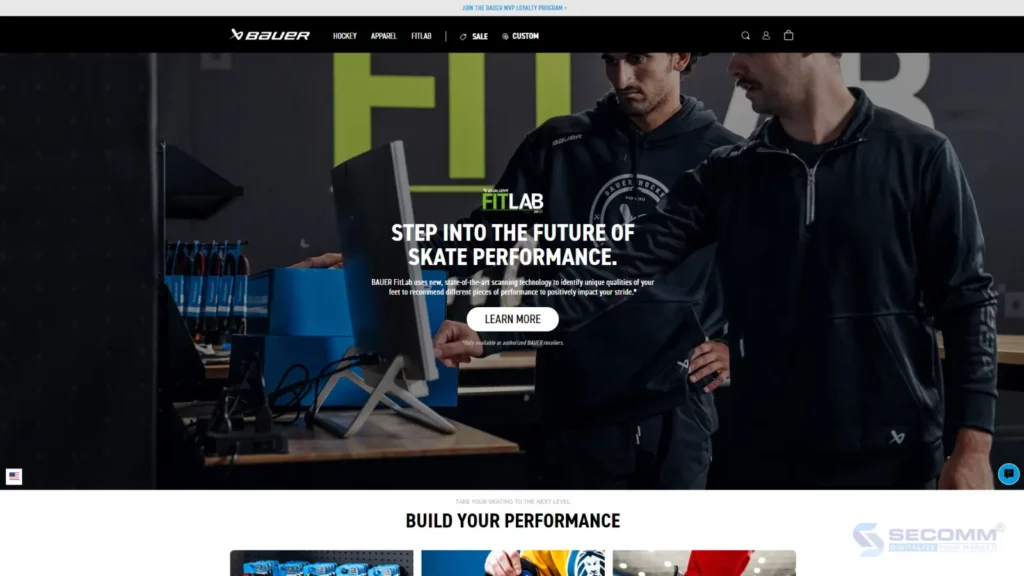
Since its founding in 1927, Bauer has gradually become a tycoon in manufacturing and selling products for the sport of hockey. After operating an eCommerce system on the Salesforce Commerce Cloud platform, Bauer realized they needed more than what their current platform could give them to expand and customize.
With many growth goals such as expanding international markets, customizing hockey warranties, and implementing a loyalty program, Bauer converted to Shopify Plus to find the best solution for its needs. Since moving to Shopify, Bauer has been able to save on technology costs and redirect those dollars toward improvements that drive results for the business. They can also bring new features to market faster than before. Shopify’s checkout feature was also strong for Bauer, especially on mobile, contributing to an 18% increase in conversion rate and 30% increase in orders.
Website: https://www.bauer.com/
Industry: Sport
Traffic: 765,322/month
Rank: #44,392 (USA) & #134,184 (Global)
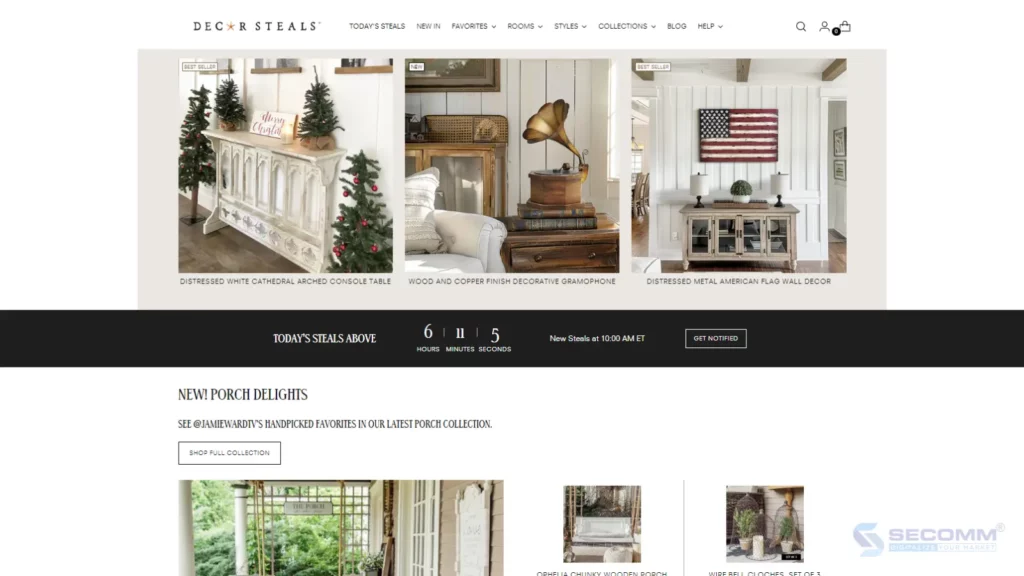
Decor Steals is an online store based in the US specializing in selling home decoration products with a variety of designs, beautiful and on-trend. At 10 am every day, Decor Steals will introduce on the website 3 carefully selected products at affordable prices and will be sold within 24 hours until sold out.
This strategy helps keep inventory flowing and creates an engaging experience for customers looking for decorative items at more accessible prices. At the same time, this helped Decor Steals’ online sales skyrocket and it was time for them to customize more in-depth features and integrate more sales channels, but the current SFCC system did not meet their needs. this bridge. As a result, Decor Steals converted to the Shopify Plus platform and launched the website in less than 6 months.
The brand only has a lean team for operations consisting of an internal manager and several external contractors, which helps them save more than $300,000 in implementation costs compared to operating with Salesforce Commerce Cloud.
Website: https://www.decorsteals.com/
Industry: Home Decor
Traffic: 745,010/month
Rank: #40,759 (USA) & #218,245 (Global)

The Cambridge Satchel Company, the prestigious British brand known for its exquisitely crafted leather briefcases, has decided to make a major move by migrating from Salesforce Commerce Cloud to Shopify Plus. The reason is because the company finds that the investment to reach new customers is more than the revenue each new customer brings. As a business that always places its value on product quality and business ethics, The Cambridge Satchel Company fell into a cycle of burning more money on the technology than on the product itself.
Not long after switching to Shopify Plus, technology investment costs were significantly reduced and Satchel’s specialized team could operate well with very little development support from third parties. The Cambridge Satchel Company also uses Shopify to provide AR experiences to customers with the “Try On” feature via smartphones.
Website: https://www.cambridgesatchel.com/
Industry: Fashion
Traffic: 411,724/month
Rank: #143,743 (USA) & #329,411 (Global)
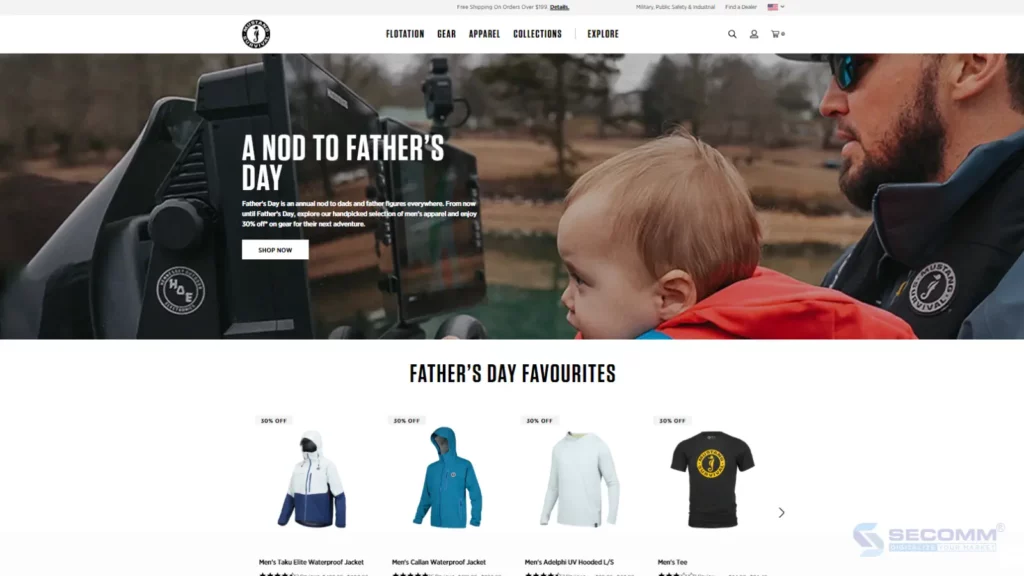
Established in Canada for more than 50 years, Mustang Survival specializes in designing, manufacturing and supplying products for water rescue professionals, military personnel, and water recreation enthusiasts.
As eCommerce websites become the dominant sales channel, gradually replacing the remaining sales channels in their business strategy, Mustang Survival needs a platform that provides a higher level of customization and expansion. As a result, Mustang Survival moved its entire operations from Salesforce Commerce Cloud to Shopify Plus.
The brand quickly took advantage of the platform’s two most cutting-edge automation solutions, Flow and LaunchPad, to save time and costs and increase accuracy and efficiency. This helped Mustang Survival increase conversion rates by 172% and reduce average page load time by 50% in just under 3 months of switching to Shopify Plus.
Website: https://mustangsurvival.com/
Industry: Sport
Traffic: 157,988/month
Rank: #144,575 (Canada) & #626,414 (Global)

Rémy Cointreau is a famous French luxury spirits group, owning more than 14 different brands. But as shopping moved online during the pandemic, traditional in-store and on-premise purchases stagnated – while online deliveries soared. Rémy Cointreau recognized the urgent need to rapidly expand its eCommerce capabilities and continue serving customers online across multiple channels over the long term.
This brand has converted to Shopify Plus and uses the Shopify POS solution, allowing the implementation of an effective sales process on many different channels such as eCommerce websites, traditional stores and direct sales through personal sales managers. This seamless omnichannel approach gives Rémy Cointreau unprecedented flexibility. The platform transformation has helped this giant grow incredibly, and eCommerce operations have become a pillar of Rémy Cointreau’s sales strategy.
Website: https://www.remy-cointreau.com/en/
Industry: Wine & Spirits
Traffic: 50,768/month
Rank: #88,991 (France) & #1,704,449 (Global)
Final Words
The transition from Salesforce Commerce Cloud to Shopify Plus is not only a technological change, but also an important strategy that helps brands like Bauer, Slam Jam, Rémy Cointreau, NYDJ, MZ Wallace, Mustang Survival, Decor Steals and The Cambridge Satchel Company enhance customer experience and optimize business operations. The right choice of foundation not only brings immediate results but also lays a solid foundation for sustainable development and prosperity in the future.
Need advice on switching platforms from Salesforce Commerce Cloud to Shopify Plus? Contact SECOMM now!
 2
2
 147
147
 0
0
 1
1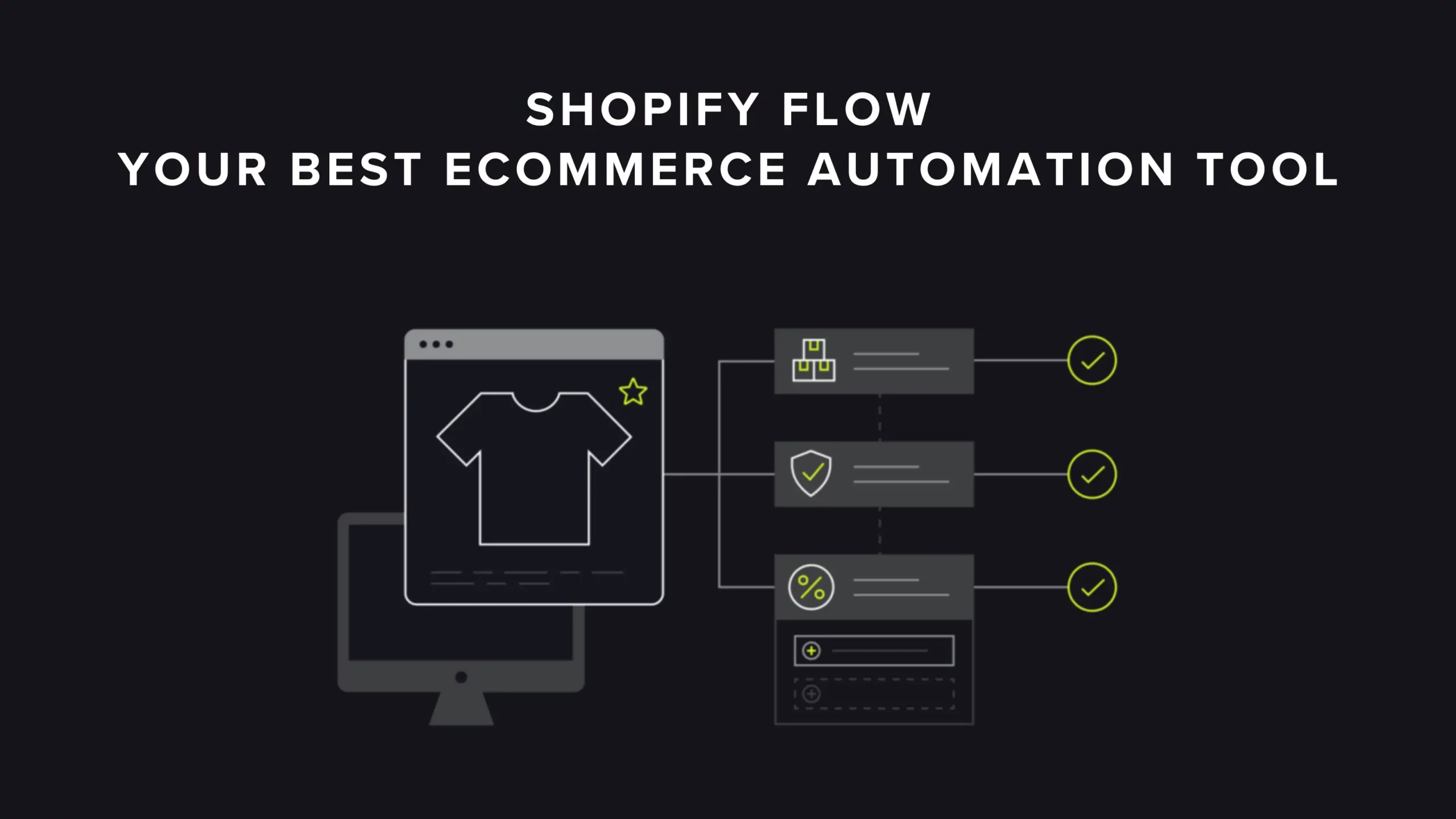
In the fast-paced digital world, eCommerce automation and efficiency are key to staying ahead of the competition. With countless tasks to manage, from inventory updates to customer engagement businesses need reliable tools to streamline their operations. Enter Shopify Flow, a powerful automation tool designed specifically for Shopify users. Shopify Flow allows merchants to automate repetitive tasks, freeing up valuable time and resources to focus on growing their business.
In this blog, we’ll explore how Shopify Flow works, its key features, and the benefits it can bring to your eCommerce operations. Whether you’re a seasoned Shopify user or new to the platform, understanding how to leverage Shopify Flow can be a game-changer for your business.
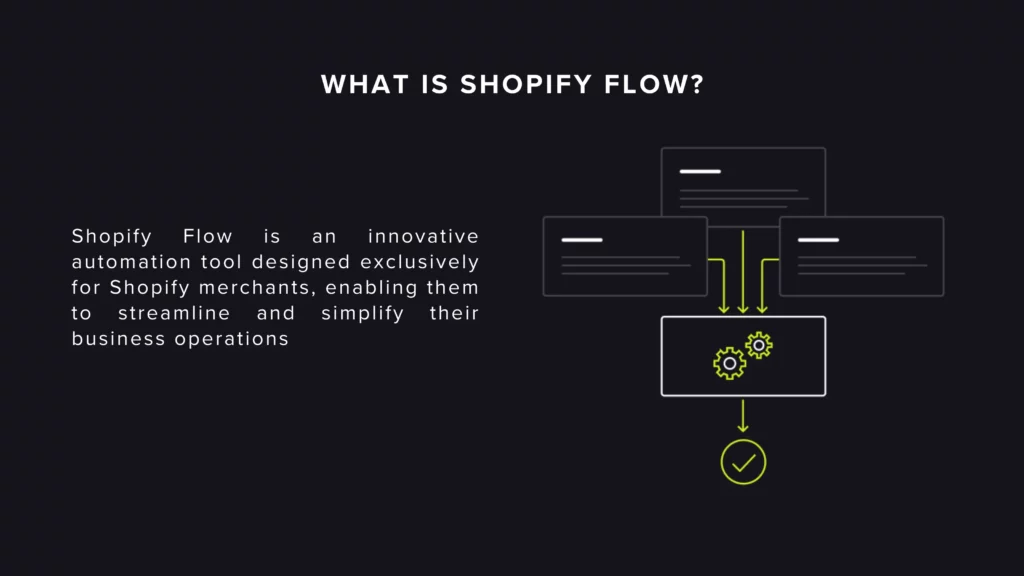
Shopify Flow is an innovative automation tool designed exclusively for Shopify merchants, enabling them to streamline and simplify their business operations. It provides a visual interface where users can create custom workflows to automate repetitive and time-consuming tasks without the need for any coding skills.
Shopify Flow is available at all plans: Basic, Shopify, Advanced and Plus.
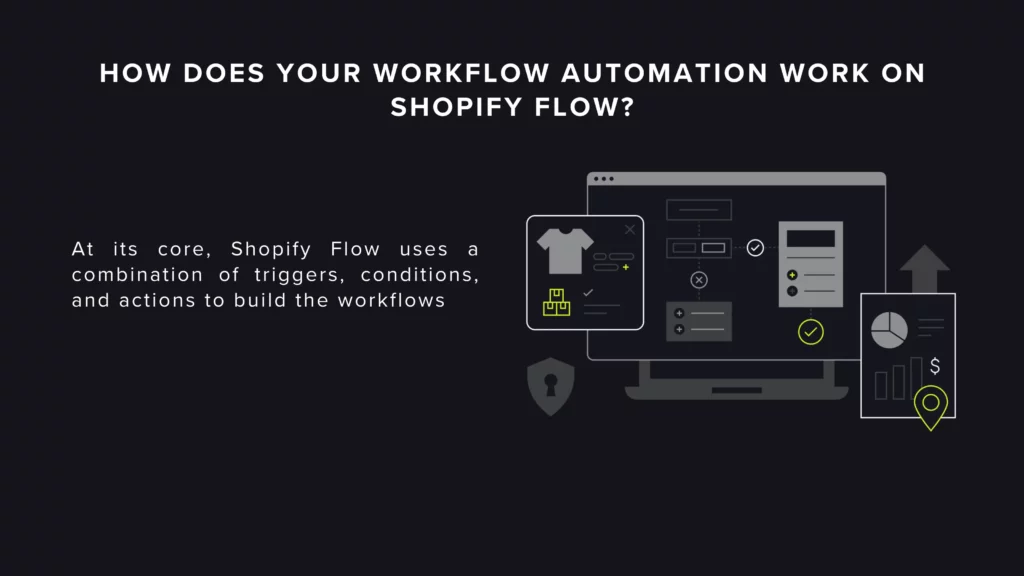
At its core, Shopify Flow uses a combination of triggers, conditions, and actions to build the workflows. A trigger initiates the workflow, a condition specifies criteria that must be met, and an action defines what happens when the criteria are met.
For example:
This tool is particularly valuable for automating processes such as inventory management, fraud prevention, loyalty and retention, fulfillment management and marketing campaigns. By automating these tasks, Shopify Flow helps businesses improve efficiency, reduce human error, and ensure consistent execution of key operations.
Shopify Flow also integrates seamlessly with a variety of Shopify apps and third-party tools, making it a versatile solution for businesses looking to optimize their workflows. Whether you’re running a small online store or managing a large eCommerce enterprise, Shopify Flow offers the flexibility and scalability to meet your automation needs.
Creating and managing workflow automation with Shopify Flow is a straightforward process that can significantly enhance your eCommerce operations.
Step 1: Open up the Shopify Flow editor, then select “Create workflow”
Step 2: Click “Select a trigger” from a searchable list of native triggers of Shopify or those from 3rd-party apps to start the workflow.
Step 3: Click on the Blue button to choose to add either condition or action
Step 4: Select “Condition” to set rules to determine if the action executes.
Step 5: Click “Then” to set action for the true condition. Or “otherwise” to set action for the false condition.
Step 6: Click “turn on”, the button in the top right corner will turn green and show is on.
You can also leverage the templates library. Here, you’ll find the pre-made workflows that you can use right away or edit to fit your business needs.
Step 1: To add new action items by clicking on any blank space in the editor, select the “Action” button. All of available options will appear
Step 2: Search specific action on the search bar and simply select the action
Step 3: Connect the new action to the existing workflow by selecting the “Then” button from your condition and linking it to your new action.
Step 1: Click on remove the action
Step 2: Some actions now no longer connected. You’ll need to link them back to the rest of your workflow.
Step 3: You can link them to the condition or to other actions.
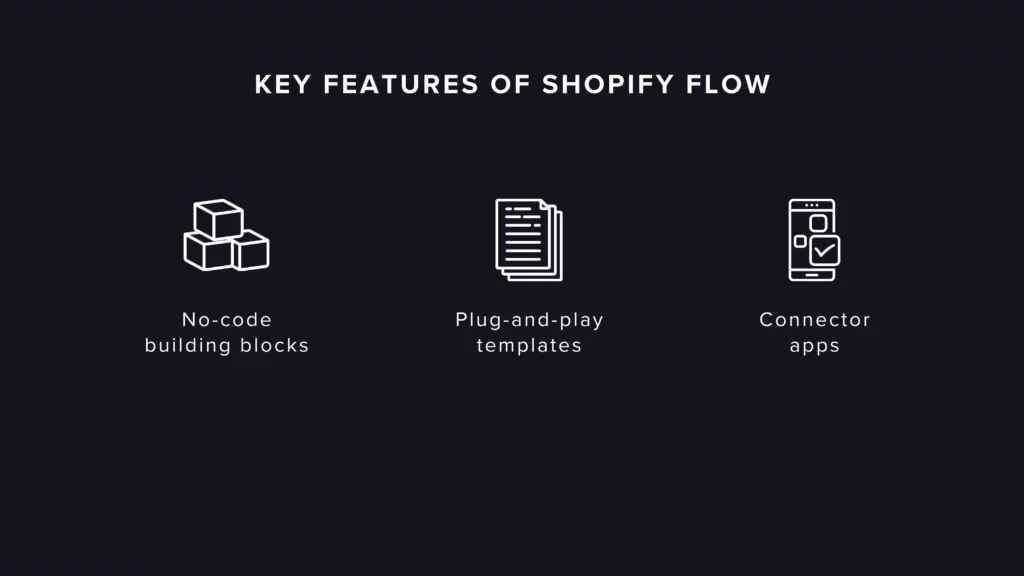
Shopify Flow is packed with features that make it a powerful tool for eCommerce automation. Here are 3 core features you should notice
At the heart of Shopify Flow are its intuitive building blocks: triggers, conditions, and actions, which allows you to create your custom eCommerce automation processes. Triggers initiate workflows based on specific events, conditions set criteria that must be met for the workflow to proceed, and actions define what tasks will be executed. This modular approach helps you create highly customized workflows tailored to your unique business needs, enabling precise automation of complex processes without any coding knowledge.
Shopify Flow offers a variety of pre-built templates that cover common eCommerce scenarios such as inventory management, customer segmentation, and order processing. These templates provide a quick and easy way to implement automation, allowing you to get started with minimal effort. Each template can be customized to fit specific requirements, making it an excellent starting point for those new to automation.
To extend its capabilities, Shopify Flow allows you to integrate seamlessly with numerous third-party apps. This feature allows you to automate workflows that span multiple tools and platforms. For example, you can connect Shopify Flow with email marketing apps, CRM systems, and inventory management software to create comprehensive, cross-functional automations. This integration capability ensures that all aspects of your eCommerce operations are synchronized and efficient.
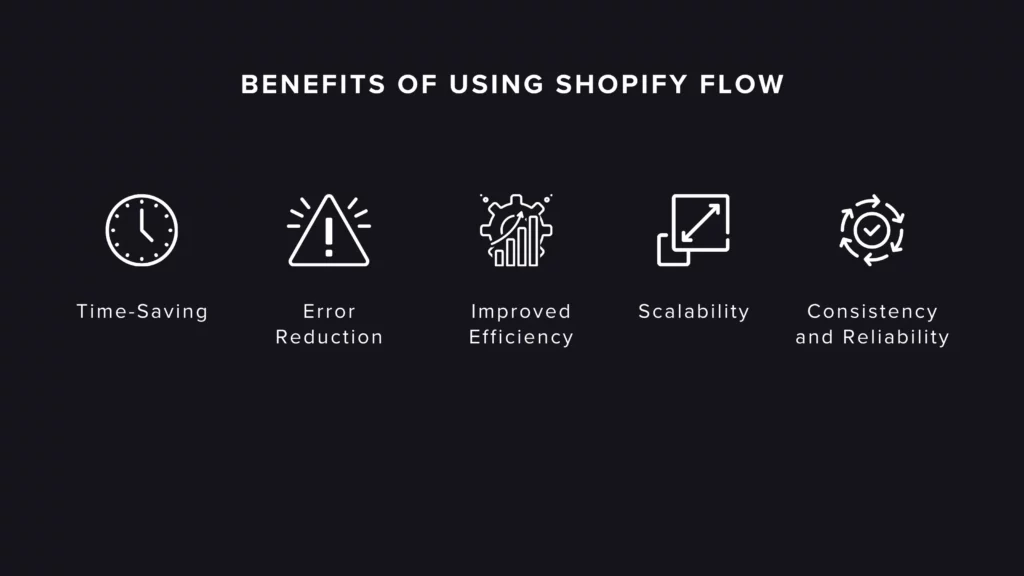
Utilizing Shopify Flow for eCommerce automation offers a multitude of advantages that can significantly enhance business operations. Here are some of them:
Shopify Flow automates repetitive and time-consuming tasks, such as inventory updates, order processing, and customer follow-ups. By automating these processes, you can save valuable time that can be redirected towards strategic activities, such as marketing, product development, and customer engagement.
Manual data entry and repetitive tasks are prone to human error, which can lead to costly mistakes. Shopify Flow minimizes these risks by ensuring that tasks are performed consistently and accurately. Automation reduces the likelihood of errors in critical processes like order fulfillment, inventory management, and customer communications.
Automation streamlines workflows, making business operations more efficient. With Shopify Flow, tasks are executed automatically based on predefined triggers and conditions, eliminating the need for manual intervention. This efficiency leads to faster processing times, better resource allocation, and improved overall productivity.
As your business grows, managing increasing volumes of orders, customers, and data can become challenging. Shopify Flow provides a scalable solution that can handle higher workloads without additional effort. Automated workflows can easily be adjusted and expanded to accommodate growth, ensuring that your business operations remain smooth and efficient as you scale.
Automated workflows ensure that processes are carried out consistently, adhering to the same standards every time. This reliability is crucial for maintaining high levels of customer satisfaction and operational excellence. Consistent execution of tasks also helps in building trust with customers and partners.
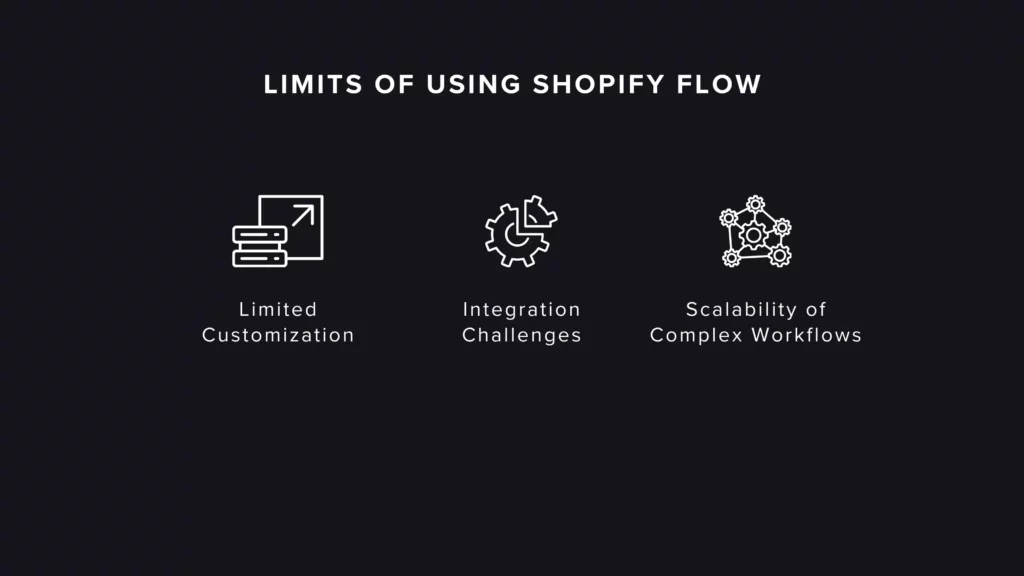
While Shopify Flow is a powerful tool for automating eCommerce operations, it’s important to be aware of its limitations and challenges. Here are some key considerations:
Although Shopify Flow offers a variety of triggers, conditions, and actions, there may be scenarios where the available options do not fully meet specific business needs. Advanced customization might require additional development work or third-party apps to fill in the gaps. This can lead to increased complexity and potential costs.
While Shopify Flow integrates with many third-party apps, there can be limitations in compatibility or functionality with certain tools. Businesses relying on specialized software may find it challenging to create seamless workflows without encountering integration issues. In some cases, additional middleware or custom API development may be necessary.
As businesses grow and their operational needs become more complex, managing a large number of workflows can become challenging. Ensuring that workflows are optimized and do not conflict with each other requires careful planning and ongoing maintenance. Overly complex workflows might also become difficult to troubleshoot and update.
Several successful businesses have leveraged Shopify Flow to streamline their operations and achieve impressive results. Here are a few real-world examples:
Good American, a leading fashion brand co-founded by Khloé Kardashian, uses Shopify Flow to automate various aspects of their eCommerce operations. By implementing workflows that manage inventory levels, segment customers, and trigger personalized marketing campaigns, Good American has been able to enhance efficiency and improve customer engagement. These automations have allowed the brand to focus more on growth and less on manual administrative tasks.
Cozykids, an online retailer specializing in children’s furniture and decor, utilizes Shopify Flow to streamline their order processing and inventory management. Automated workflows ensure that stock levels are updated in real-time, reducing the risk of overselling and improving order fulfillment accuracy. Additionally, Cozykids uses Shopify Flow to send automated follow-up emails to customers, enhancing their post-purchase experience and increasing customer satisfaction.
Mandaue Foam, a furniture and home decor company, has adopted Shopify Flow to manage their complex supply chain and customer service processes. With automated workflows in place, Mandaue Foam can efficiently handle large volumes of orders, track shipments, and manage customer inquiries. This automation not only improves operational efficiency but also provides a seamless shopping experience for their customers, contributing to higher customer retention and satisfaction.
Final Words
In this blog, we explored Shopify Flow’s capabilities, including its automation of workflows and key features such as building blocks, templates, and connector apps. We also discussed its benefits like time-saving and improved efficiency, as well as potential limitations.
Need more advice? Contact SECOMM today!
 2
2
 221
221
 0
0
 1
1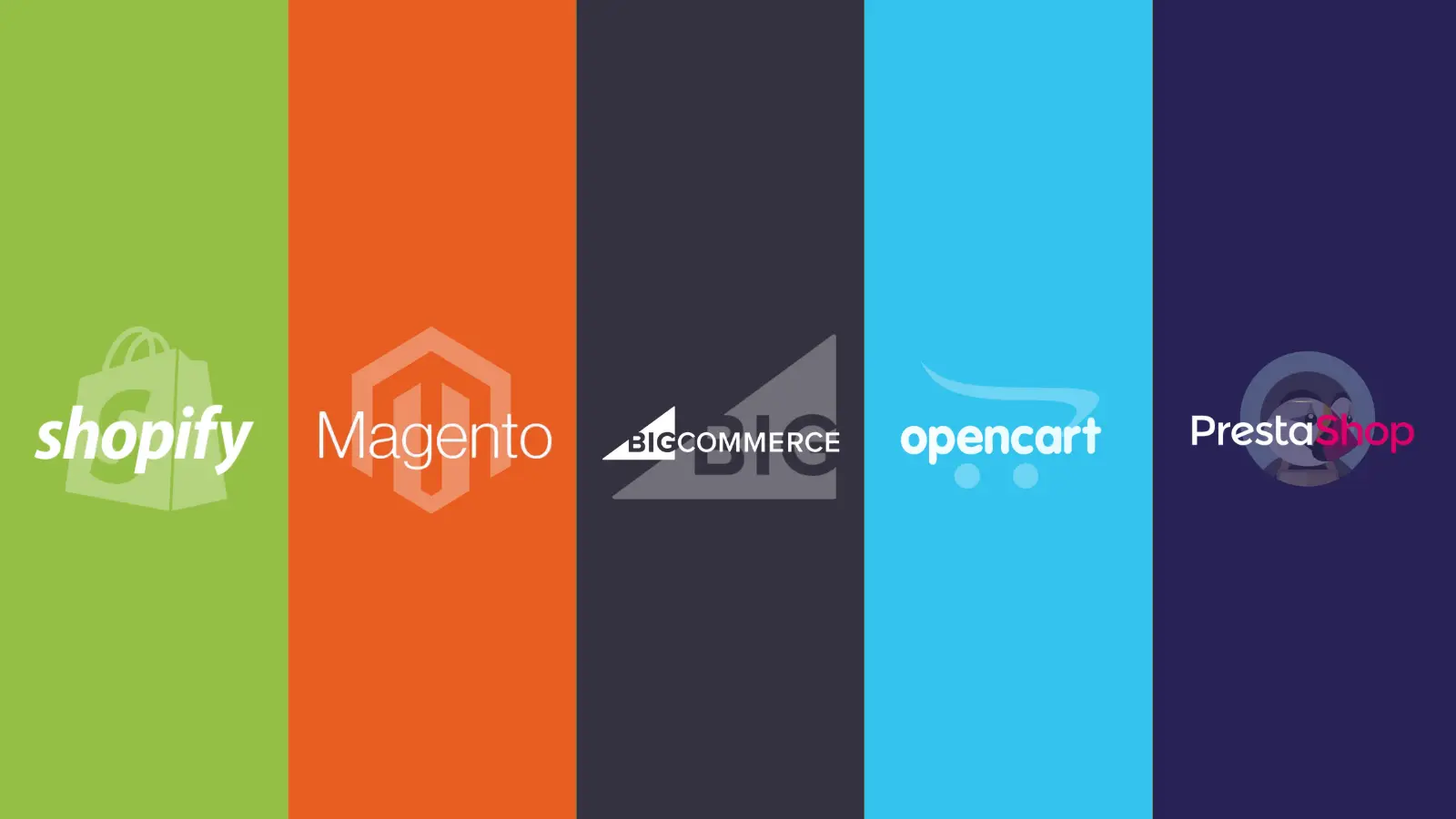
International eCommerce platforms are shaping the shopping trends of modern consumers worldwide, where geographical boundaries are no longer barriers to business activities. With the continuous development of technology and the internet, businesses have the opportunity to reach millions of customers around the globe more easily than ever. However, to succeed in the international market, choosing the right eCommerce platform is crucial.
In this article, let’s explore the top 5 platforms that effectively meet the needs of many businesses for implementing international eCommerce.
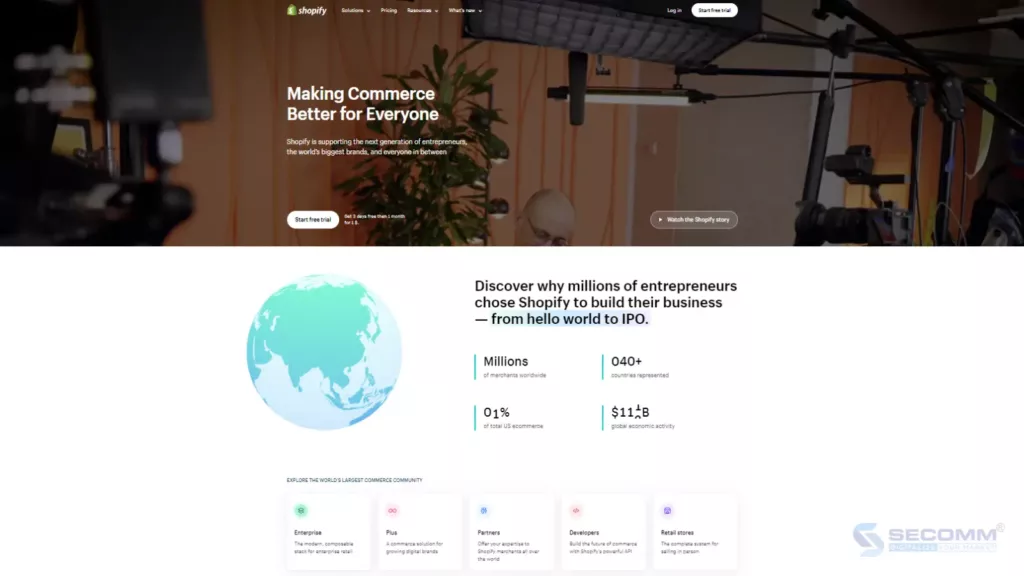
Shopify is a well-known SaaS eCommerce platform for businesses worldwide. It offers an all-in-one solution called Shopify Markets, allowing businesses to start selling in over 150+ different markets and manage efficiently on a single dashboard. Shopify Markets comes in two versions:
Integrated into all Shopify plans, providing core features including:
Fees are incurred per international transaction, including:
Includes all core features plus additional advanced features such as:
The cost of Markets Pro is 6.5% per transaction, including local payment processing fees, so businesses do not need to pay this fee separately. Additionally, businesses will pay 2.5% per transaction for currency conversion fees.
Advantages:
Disadvantages:
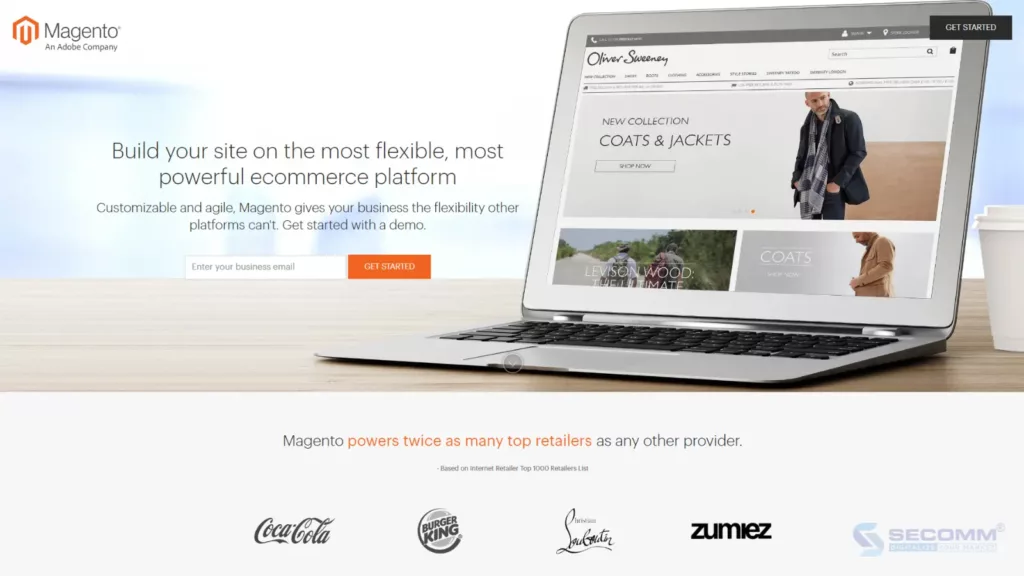
Implementing international eCommerce involves many challenges related to language, currency, and taxes, requiring websites to be optimally customized to provide the most engaging customer experience. This is why Magento is on this list.
Some standout features of Magento that support international commerce include:
Advantages
Disadvantages:
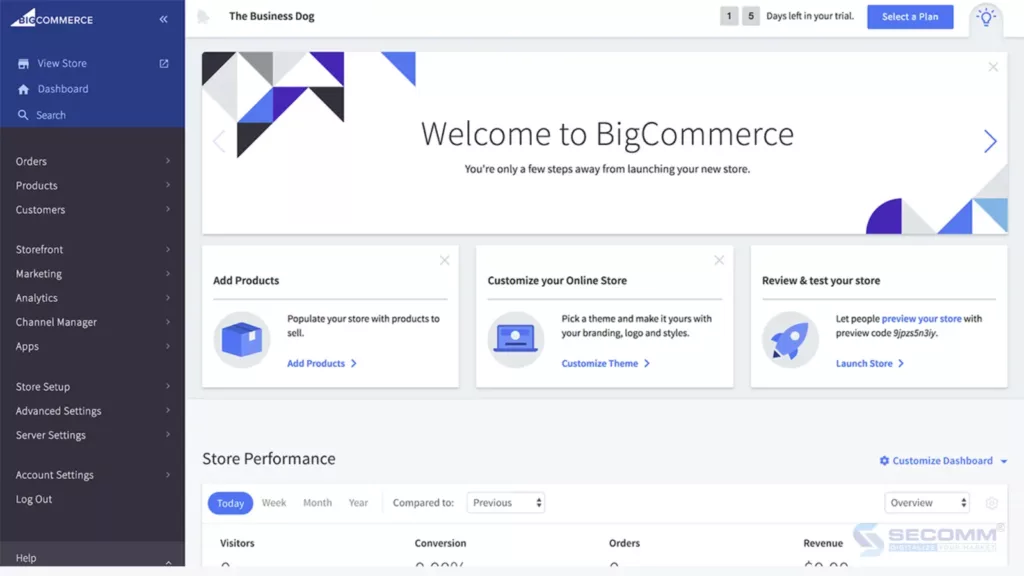
Similar to Shopify, BigCommerce is also a SaaS eCommerce platform that provides international eCommerce solutions. The platform offers features and tools to help businesses expand their operations in the international market simply and effectively.
Some standout features of BigCommerce supporting international eCommerce include:
Advantages:
Disadvantages:
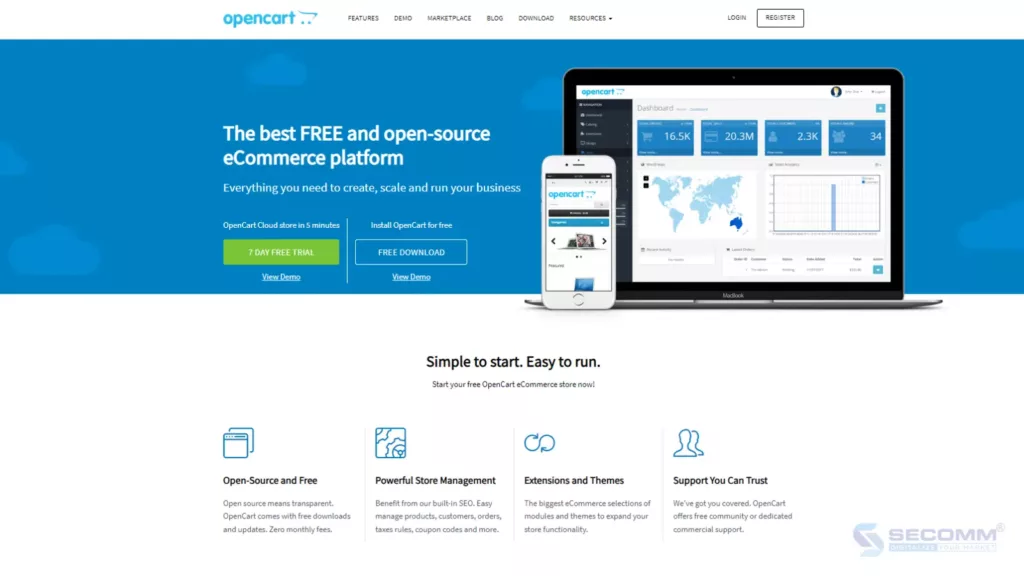
Similar to Magento, OpenCart is a popular open-source eCommerce platform used for international eCommerce implementation. This platform offers many useful features and tools, allowing businesses to better serve global customers.
Some standout features of OpenCart supporting international eCommerce include:
Advantages:
Disadvantages:
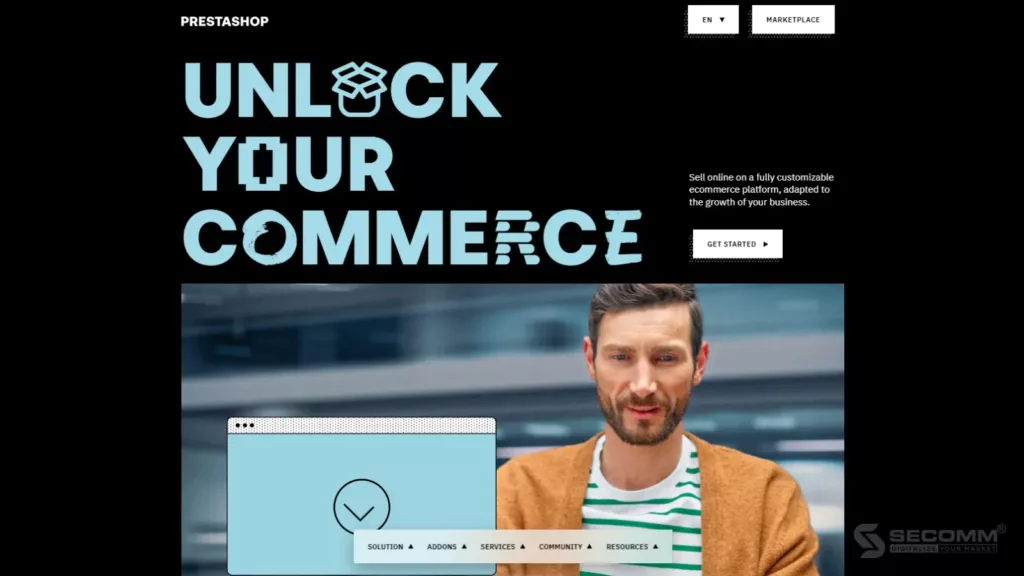
Another widely used open-source eCommerce platform for international e-commerce implementation is PrestaShop. With excellent customization and scalability, as well as outstanding tools and features, PrestaShop is the perfect choice for businesses looking to expand globally.
Some standout features of PrestaShop supporting international eCommerce include:
Advantages:
Disadvantages:
The Bottom Line
The above provides an overview of the top 5 platforms for implementing international eCommerce, each with its advantages and disadvantages. Depending on the scale, budget, and technical requirements, businesses can choose the most suitable platform for themselves.
Regardless of the choice, investing in a robust and flexible eCommerce platform will help businesses effectively reach international markets, increase sales, and expand their scale.
Need advice on implementing international eCommerce? Contact SECOMM today!
 152
152
 339
339
 0
0
 1
1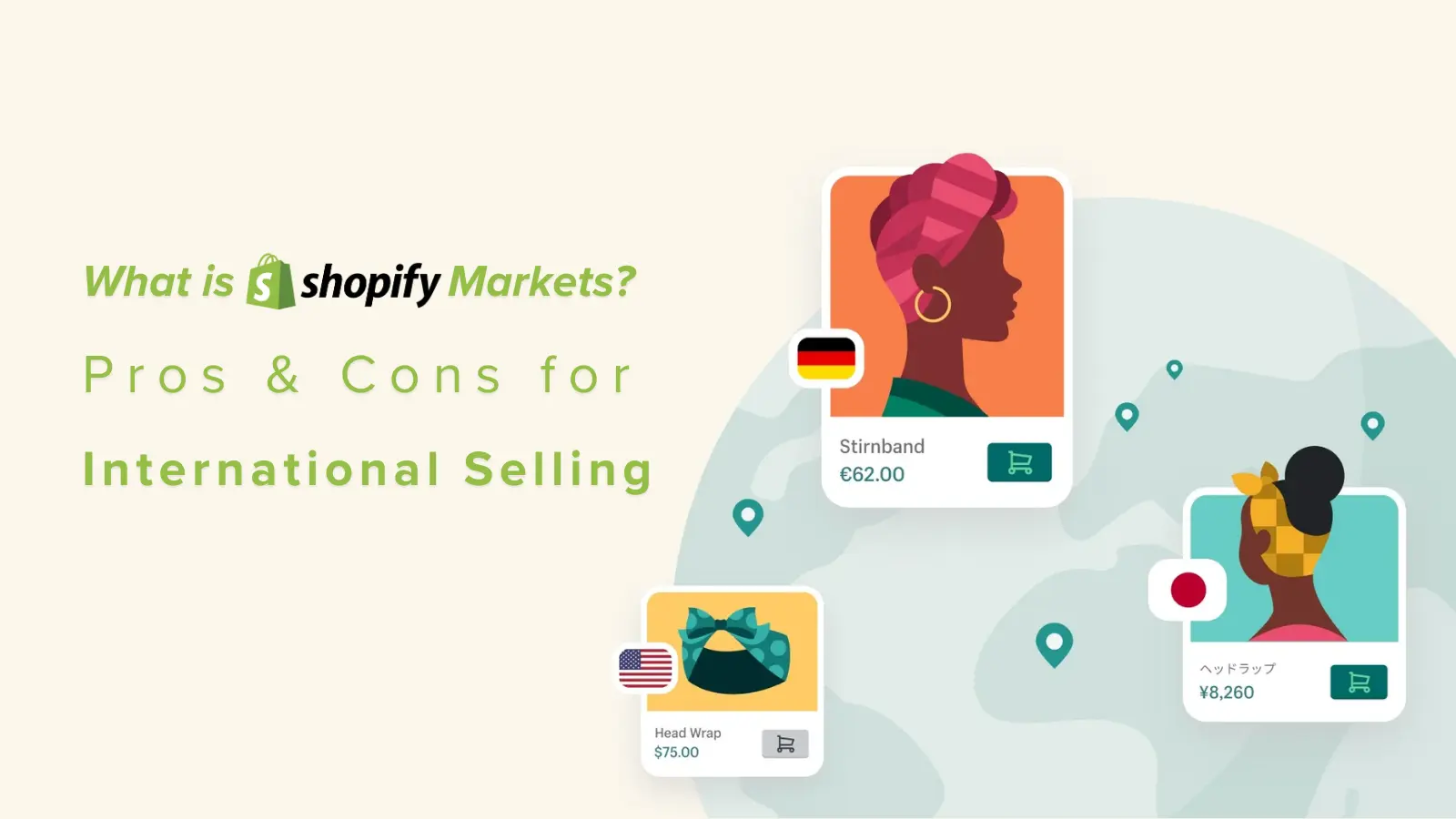
In the digital age, eCommerce is the key to helping businesses quickly and effectively reach global customers. Shopify, a renowned SaaS platform supporting online business, has launched the Shopify Markets solution to assist businesses in expanding into global markets. So, what is Shopify Markets? What benefits and challenges does this solution bring to your business when implementing international eCommerce? Let’s explore in the article below.
Shopify Markets is a new solution from the Shopify platform, designed to help you easily and efficiently expand your business into global markets. This tool allows you to manage multiple stores from a single dashboard, customizing each market with specific settings for language, currency, taxes, and payment methods. Moreover, Shopify Markets integrates with international shipping and logistics services, enabling you to optimize your operations and meet the demands of global customers.
Previously, multi-store setups have been done by using Shopify Plus, allowing merchants to establish and operate separate Shopify stores for each target market. This approach gave merchants full control over individual stores, such as running market-specific marketing campaigns, promotions, and inventory management.
However, this approach had several drawbacks. First, operating multiple standalone stores meant discrepancies in inventory levels, requiring data synchronization between stores. This process was time-consuming and prone to errors. Many merchants addressed this issue by integrating systems like PIM or ERP. Second, the workload increased due to the need to update content for each store individually. Third, many merchants complained about having to pay for the same app or integration across multiple stores, leading to inefficiencies in financial management.
Thus, the advent of Shopify Markets serves as a remedy for these three issues. Now, you can apply multi-language, multi-currency, international pricing, domain or subdirectory, and Geolocation features for the stores, all managed efficiently from a single dashboard.
When deploying international eCommerce, the importance of multi-language support cannot be overstated. According to CSA Research, 76% of online shoppers prefer to purchase products with information displayed in their native language. Meanwhile, 40% will never buy from eCommerce websites in a different language.
By using Shopify Markets and the built-ịn Translate & Adapt app, your website can be automatically translated into the languages of your target markets. Beyond mere translation, Shopify’s Translate & Adapt app can customize store content to better connect with local customers. This ensures that your eCommerce website maintains cultural, regional, and seasonal relevance—even when markets share the same language—the app can adjust for variations in vocabulary, spelling, and messaging.
Global customers want to see product prices in their own currency when shopping on eCommerce websites. A PayPal report supports this, showing that 76% of survey participants prefer to pay in their local currency. Shopify Markets can automatically convert product prices into over 130 different currencies to cater to your target customers. From product pages to shopping carts, and from checkout to refunds, Shopify Markets can create a seamless multi-currency shopping experience for customers, which will boost conversion rates and sales.
Shopify Markets can help create localized domains linked to specific languages and countries. For example, “myshop.com” could be the main site operating in the US, “myshop.ca” for the Canadian market, and “myshop.co.uk” for the UK. This not only increases credibility and optimizes SEO but also enhances brand recognition in each market.
Shopify Markets allows the setup of subdirectories for each language or region under the same main domain, such as “myshop.com/en” for English, “myshop.com/fr” for French, and “myshop.com/de” for German. Using subdirectories helps easily manage local versions of the store, improve user experience, and optimize costs related to maintaining multiple domains.
Payment methods significantly influence purchasing decisions. According to a Worldpay report, 27% of users will abandon the checkout process if they cannot find their preferred payment method.
With Shopify Markets, you can offer your customers a variety of local payment options, alongside familiar choices like credit/debit cards, PayPal, Apple Pay, and Google Pay. Some examples of local payment method integrations include:
When selling in international markets, pricing can be affected by duties and import tax. In many cases, unexpected costs for customers can lead to a negative shopping experience.
The Shopify Markets solution can help address this issue. This tool can calculate taxes based on the shipping address and the legal regulations of each country, including value-added tax (VAT), sales tax, and other import duties. When customers proceed to checkout, the system clearly displays these taxes, helping them understand the total shopping cost and avoid unpleasant surprises.
Shopify Markets also collects and remits these taxes to the appropriate tax authorities, saving your time and effort in handling tax procedures. This feature also integrates with shipping services to ensure all tax-related costs are accurately reflected, allowing you to plan expenses more effectively. Therefore, you can comply with legal regulations, enhance the customer shopping experience, and optimize your operations.
Shopify Markets is included in all Shopify plans, but the features available to merchants vary by plan. Here are the core features that all Shopify merchants can use when embracing Shopify Markets:
For the higher-tier plans, Advanced and Plus, merchants can access exclusive features. This is particularly beneficial for larger enterprises looking to establish and maintain a strong, competitive presence in international markets:
Shopify Markets Pro is the upgraded version of Shopify Markets, designed to offer more advanced features. This solution aims to support large-scale merchants in efficiently and flexibly managing complex international operations. The “Pro” version helps sell in over 150 different markets, providing powerful tools to optimize operations, manage taxes and costs, and enhance the international customer experience.
Some special features exclusive to the Pro version include:
Final Words
Shopify Markets is truly a robust solution for going globally and manage target stores efficiently and flexibly. However, alongside its strengths, this solution also has several notable limitations.
Depending on the scale, number of target stores, and the need to create a customized shopping experience, you can weigh the standard version against the Pro version. Nevertheless, you must carefully consider cost factors and management capabilities to ensure these solutions align with your strategies.
Need more advice? Contact SECOMM today!
 28
28
 382
382
 0
0
 1
1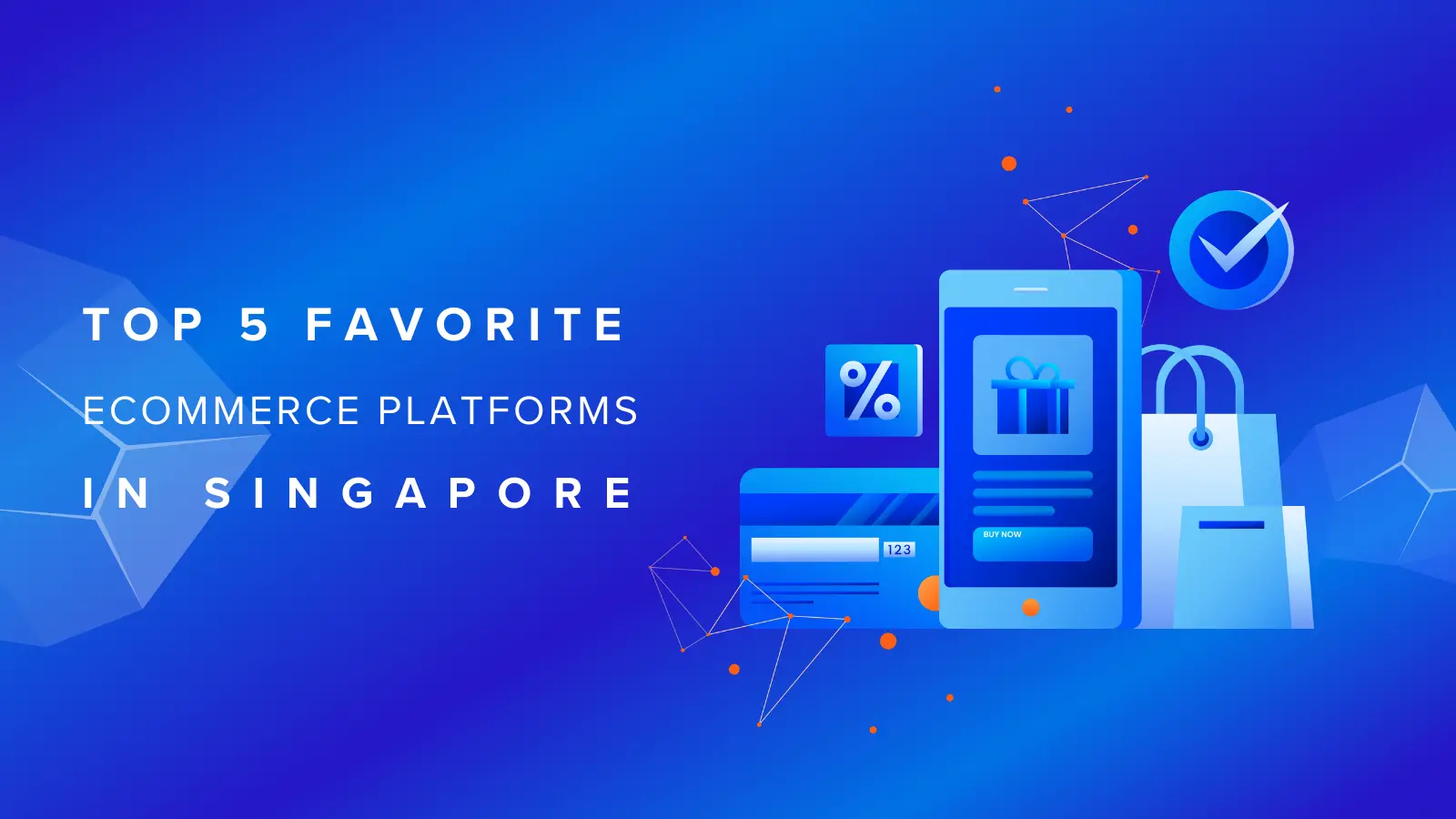
eCommerce in Singapore is continuously evolving with the emergence of new technological solutions. As a result, the options for eCommerce platforms are becoming increasingly abundant and diverse. This presents both opportunities and challenges for every merchant, as selecting the right platform to build an eCommerce website is a crucial first step.
Here are the five most commonly used eCommerce platforms in the Lion City.

Shopify is a popular SaaS eCommerce platform with over 4.8 million active websites. In Australia alone, over 8 thousands live stores are operating on the Shopify platform.
Recently, the premium version of Shopify, ‘Plus,’ has garnered attention from businesses across various sectors in Singapore. These merchants may have previously deployed different eCommerce platforms and later switched to Shopify Plus to seek a superior solution. Some merchants initially launched websites with standard Shopify packages and later upgraded to ‘Plus’ to optimize their operations.
Key features:
Pros:
Cons:
Shopify Pricing

Magento is a globally popular open-source platform, and its prevalence extends to Australia as well. According to BuiltWith, there are currently about 661 e-commerce websites operating on the Magento platform in the Lion Island.
With its high flexibility, merchants can effortlessly tailor features and scale the system according to their unique business requirements.
Presently, Magento provides two versions: Open Source (Free) and Adobe Commerce (Paid).
Key features:
Pros:
Cons:
Pricing:
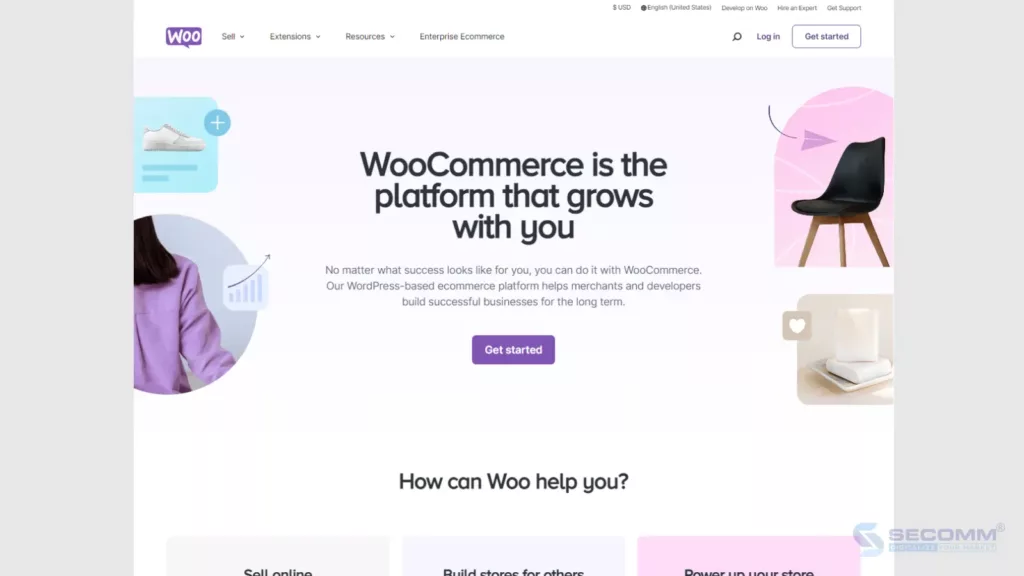
WooCommerce, a free and open-source WordPress plugin, enables brands to integrate eCommerce functionality into their existing WordPress websites. With just a few clicks, the WooCommerce plugin helps convert a standard WordPress site into a fully-featured eCommerce platform, complete with essential features and easy customization. At the time of writing, there are over 13,000 WooCommerce eCommerce websites operating effectively in Singapore.
Key features:
Pros:
Cons:
Pricing: Free to use. However, some integrations with other plugins may incur charges.
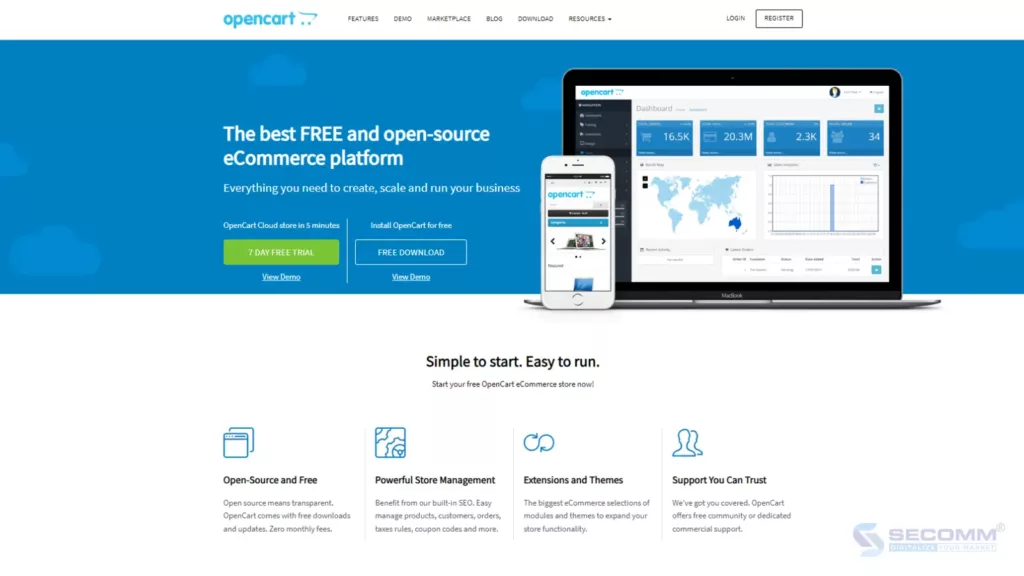
OpenCart is a globally popular open-source eCommerce platform, powering over 900 thousand active websites worldwide. In Singapore, it has gained popularity with more than 1,600 live OpenCart sites, establishing itself as a favored open-source platform in the country, following Magento.
Founded by Daniel Kerr in 1998, OpenCart operates as open-source software, utilizing the PHP programming language. It currently offers two versions: Free (Free-to-use version) and Cloud Store (Paid version).
Key features:
Pros:
Cons:
Pricing:
Free for the Free version. For the Cloud Store version, the specific costs are as follows: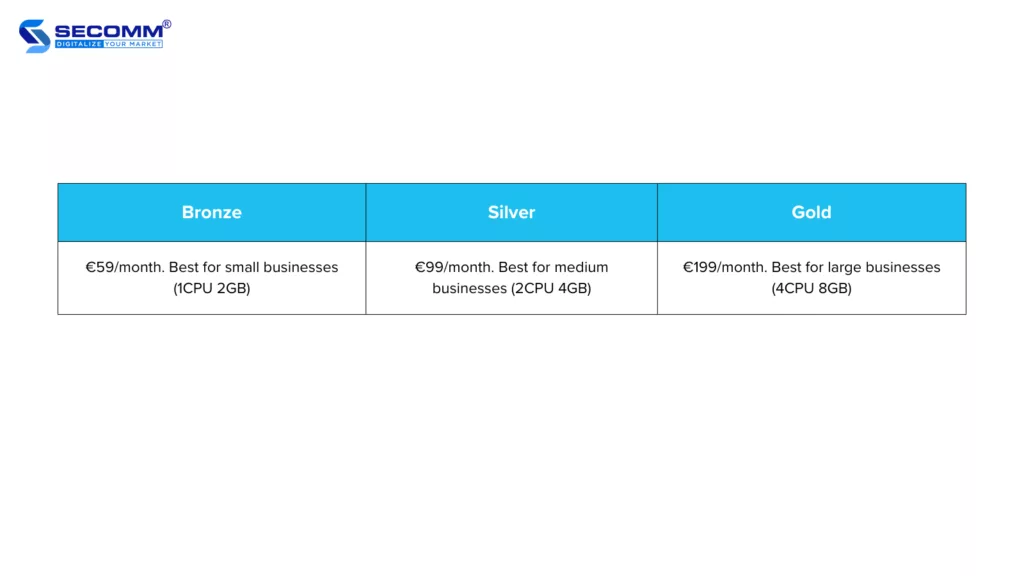
The ‘Cloud Store’ version pricing plan

Another open-source platform that is equally popular in Singapore is PrestaShop, with over 270 eCommerce websites currently in operation. The strength of PrestaShop lies in its flexibility and high customization capabilities, allowing users to easily adjust functionalities and interfaces to meet their specific needs. Additionally, with a vibrant developer community and thousands of available modules and themes, PrestaShop not only provides a comprehensive eCommerce solution but also continuous support to ensure that websites run smoothly and efficiently.
Key features:
Pros:
Cons:
Pricing: Free to use, but charges apply for complex requirements
These are the five popular eCommerce platforms in Singapore that many merchants choose to build their eCommerce websites. Depending on specific implementation needs, businesses can consider the most suitable platform.
Need more advice? Contact SECOMM today!
 2
2
 380
380
 0
0
 1
1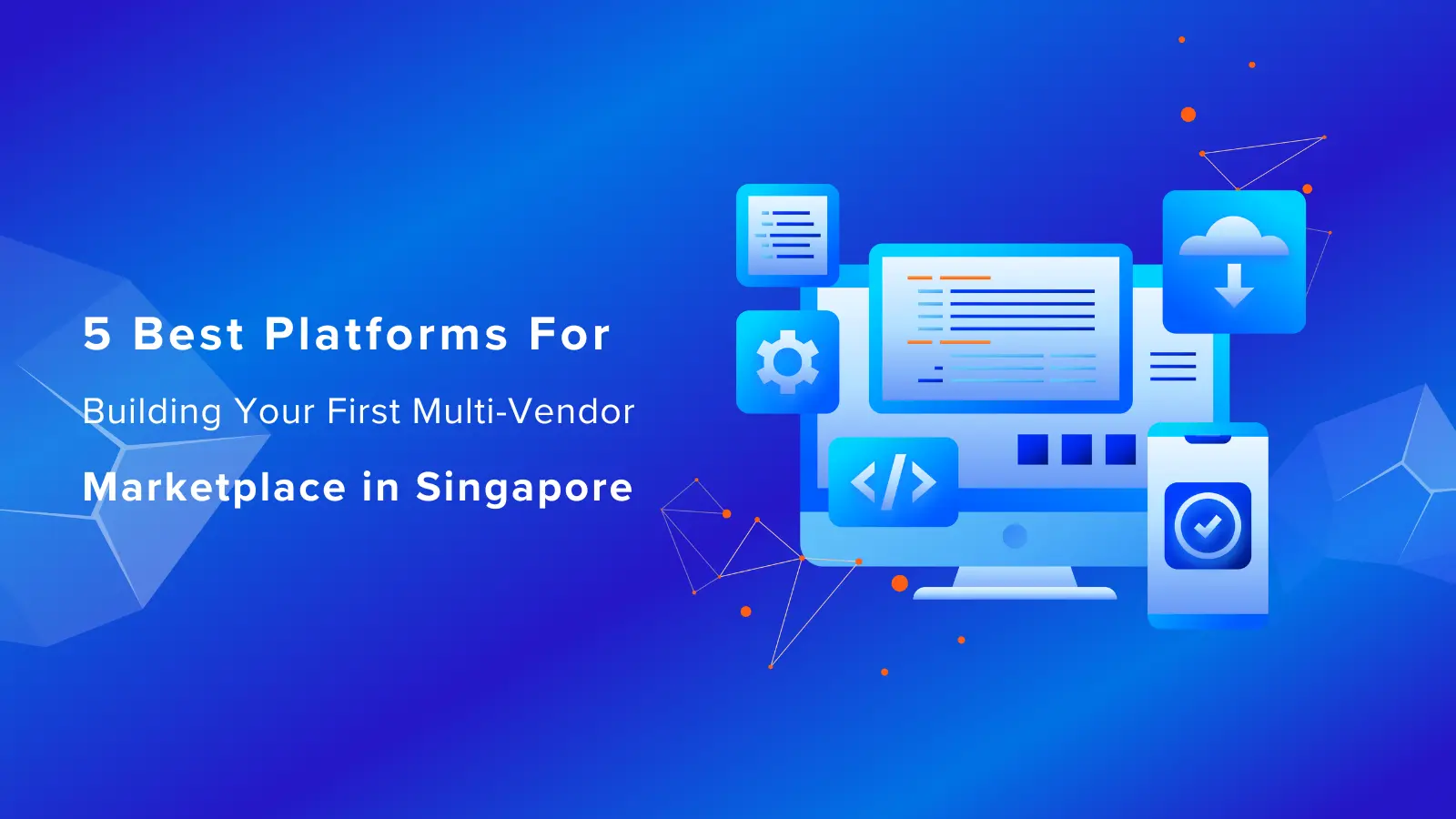
Shopping on multi-vendor marketplaces has become an essential part of modern life, particularly in Singapore, one of the busiest commercial hubs in Asia. As such, building and efficiently managing an eCommerce marketplace is crucial for businesses. However, selecting the right platform can be challenging. This article will introduce the five most reliable platforms that many businesses in Singapore use to build their own.
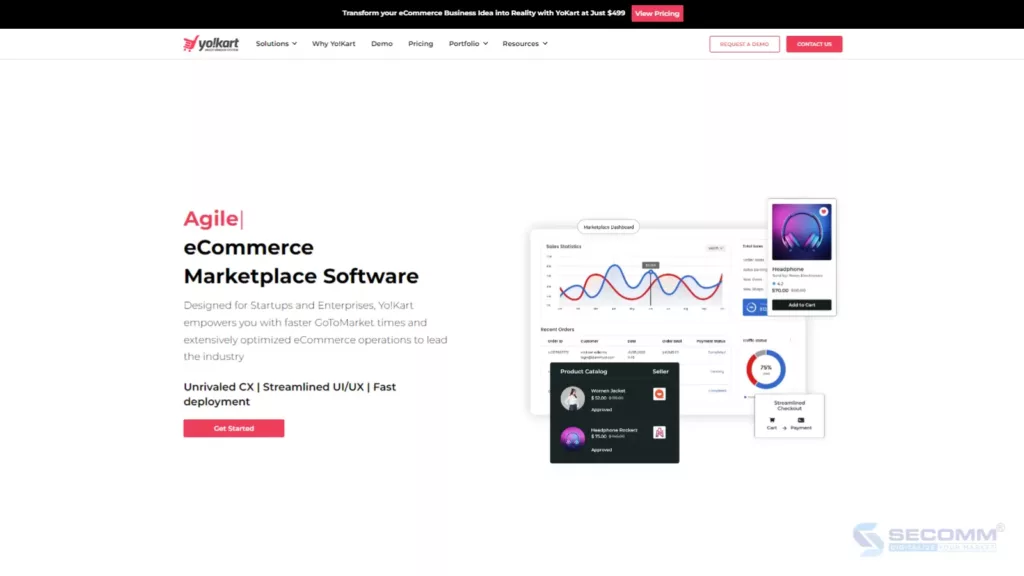
Yo!Kart is a leading self-hosted eCommerce solution that businesses can consider for building a custom multi-vendor marketplace. Designed to be user-friendly, Yo!Kart allows businesses to have full control, customization, and flexible scalability to manage and operate their eCommerce platform more effectively.
Key features:
Pros:
Pros:
Price: Starting from $1099/year. However, costs may vary based on specific requirements.
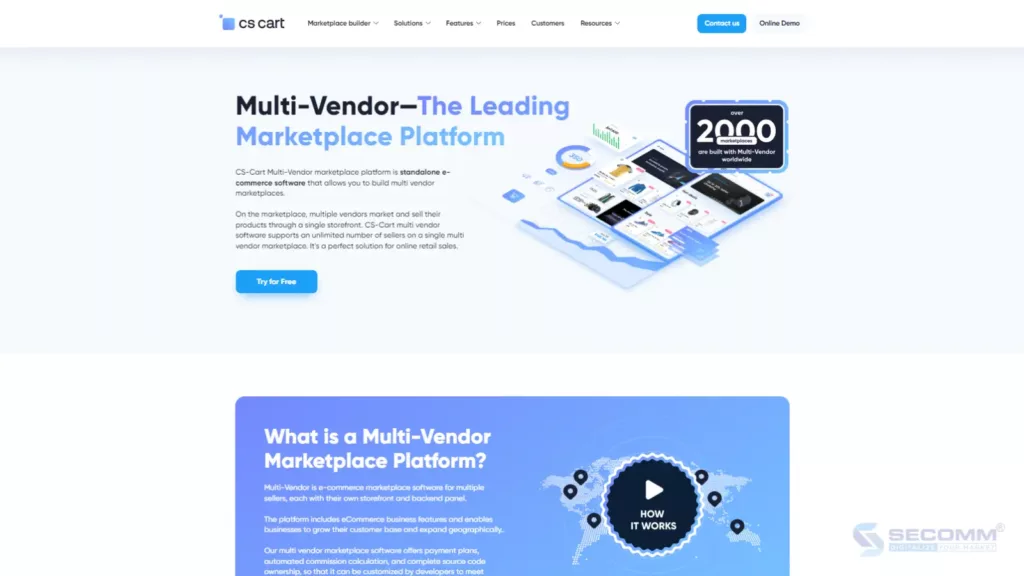
CS-Cart Multi-Vendor is known as a specialized platforms for building multi-vendor marketplaces with robust customization and scalability. With over 26 integrated languages and numerous unique features, this platform is an all-in-one solution suitable for various industries and deployment needsneeds.
Key features:
Pros:
Cons:
Price: Pricing may vary depending on specific needs
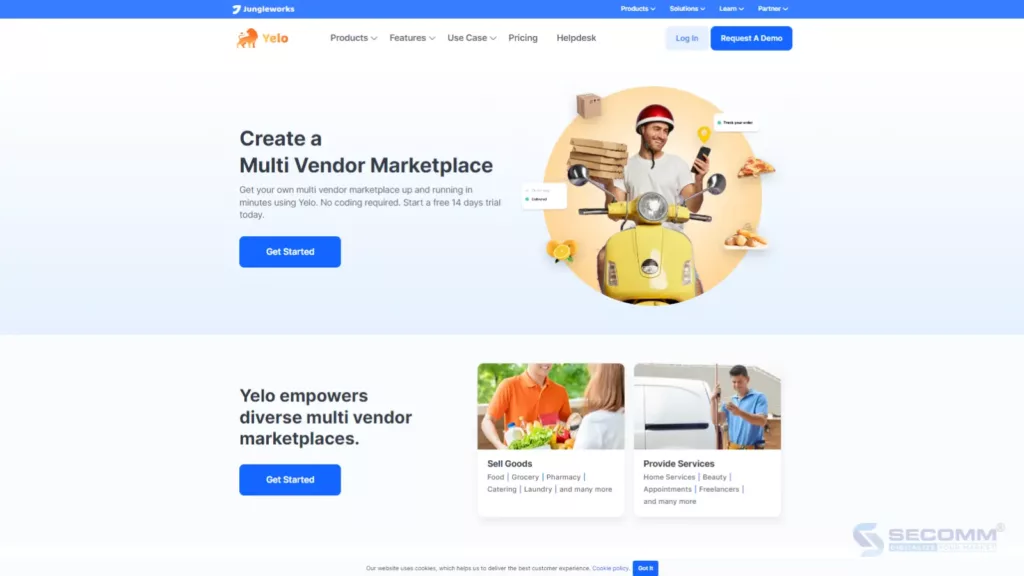
Yelo is flexible multi-vendor marketplace designed to help businesses of all sizes easily create and manage their online store. With Yelo, businesses can quickly build custom eCommerce marketplaces equipped with comprehensive features for administrators, sellers, and buyers.
Key features:
Pros:
Cons:
Giá: Costs start at $12/month
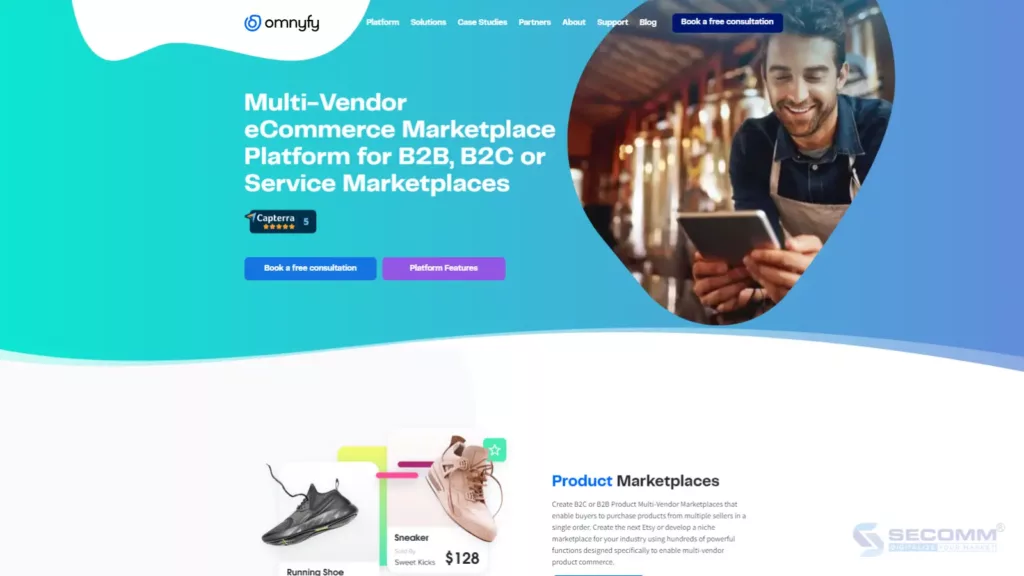
Omnyfy is a powerful multi-vendor marketplace designed to meet the needs of both B2B and B2C businesses. With its multi-channel management support and flexible integrations. Omnyfy enables businesses to create a comprehensive eCommerce ecosystem, from product management to customer service.
Key features:
Pros:
Cons:
Price: Pricing may vary depending on specific needs
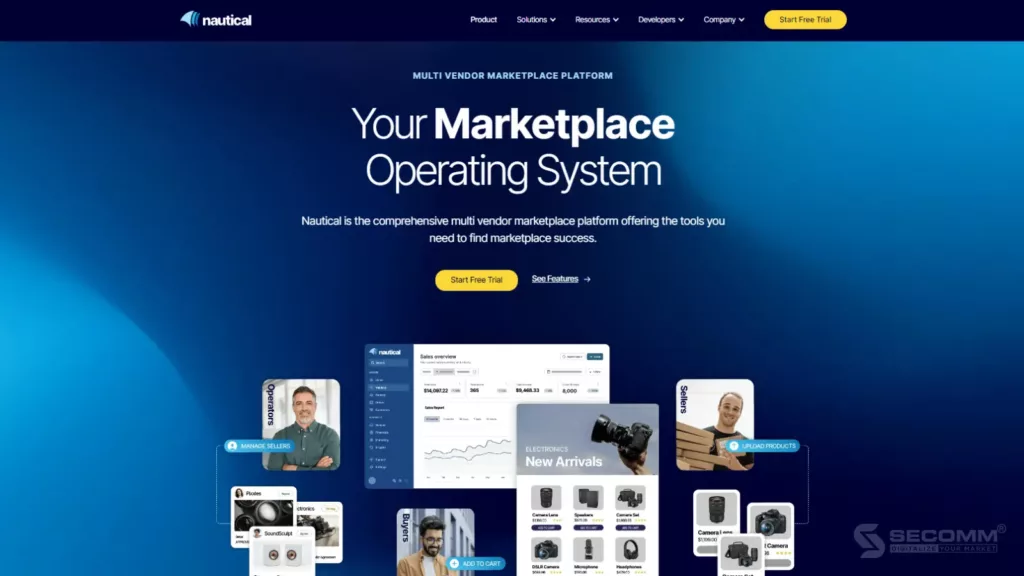
Nautical Commerce is favored by businesses in Singapore for providing a range of comprehensive solutions to make managing and operating multi-vendor marketplaces easier. With Nautical Commerce, businesses can leverage the latest technologies to improve business efficiency and enhance user experience.
Key features:
Pros:
Cons:
Price: Pricing may vary depending on specific needs but 14-day free trial available
Final Words
Here are 10 popular and reliable multi-vendor marketplace platforms widely deployed in Singapore. From Yo!Kart, CS-Cart Multi-Vendor, Yelo to Omnyfy and Nautical Commerce, each platform has its own pros and cons, suitable for different needs.
Need advice on deploying an eCommerce marketplace? Contact SECOMM today!
 2
2
 274
274
 0
0
 1
1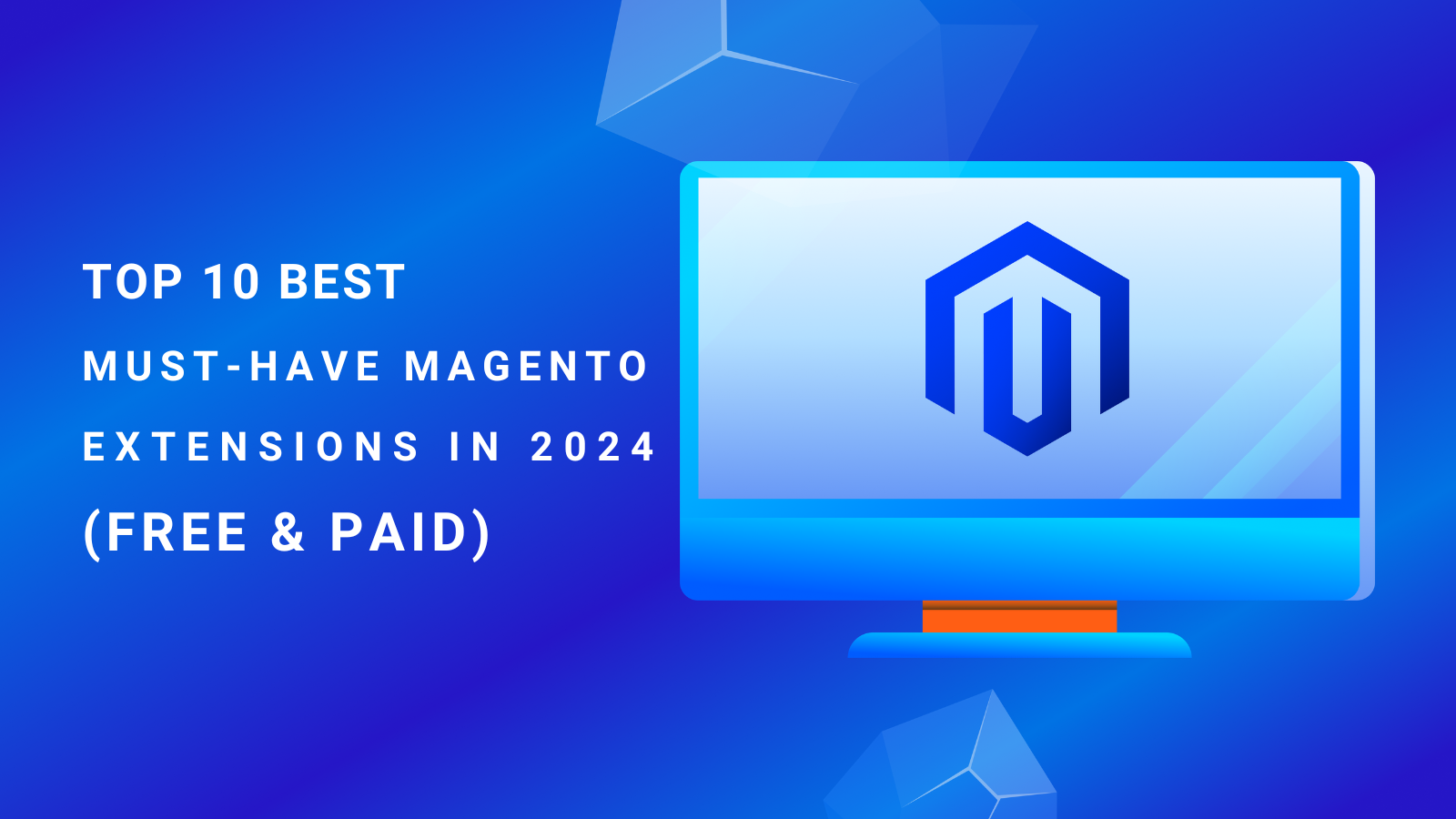
Using Magento extensions isn’t just a trend; it’s a critical factor for the success of an eCommerce website. With the ever-growing market, delivering an optimized online shopping experience has become a must for attracting and retaining customers.
In this context, integrating best-suited Magento extensions into the website system will enhance performance, streamline management, and enrich customer engagement. Let’s explore the top 10 Magento extensions worth integrating to ensure your eCommerce website stands strong amidst fierce competition.
Before delving into the list of top Magento extensions, let’s gain a deeper understanding of this concept. Magento extensions are simply additional software integrated into the Magento platform to extend the functionality and capabilities of Magento websites. These extensions can provide new features, enhance user experience, optimize management, and upgrade core functions such as marketing, payments, shipping, and more.
These extensions are developed by the Magento community, including software development companies and eCommerce service providers. Most of them are available in both free and paid versions. While the free versions typically offer basic features, the paid versions often include advanced features and deeper support services.
Choosing the right Magento extensions is a crucial part of building and managing a successful eCommerce website on the Magento platform. Let’s explore four benefits that using Magento extensions brings:
Extensions help expand the functionality of Magento websites by adding new features and capabilities that the core system doesn’t provide. For example, businesses can integrate advanced search features to make it easier for customers to find products, add filters for customers to sort products based on various criteria, or integrate social features to encourage sharing and interaction on social media. As a result, Magento websites can offer a more engaging shopping experience, retaining and attracting more customers.
One of the significant challenges of managing eCommerce websites in general and Magento websites in particular is efficiently managing inventory, orders, and customer information. Magento extensions provide smart inventory management tools, user-friendly order management interfaces, and integration with customer relationship management (CRM) systems. Thus, businesses can save time and effort in managing daily business operations and focus on more critical development goals.
eCommerce websites are not just places for online shopping but also forums where customers can interact with each other and with the brand. Magento extensions offer interaction features such as product review and rating systems, loyalty points programs for loyal customers, and CRM software, helping businesses create a rich and engaging online shopping space.
Lastly, using Magento extensions helps improve business performance by enhancing conversion rates, increasing sales revenue, and optimizing marketing strategies. Thanks to the flexibility and diversity of these extensions, businesses can customize and adjust their business strategies to meet market needs and achieve sustainable growth.
At the time of writing, the Magento platform offers over 4000 eCommerce extensions across a range of functions including marketing, payment processing, shipping, reporting, and analytics. Here are the top 10 most powerful extensions to consider adding to your Magento website:
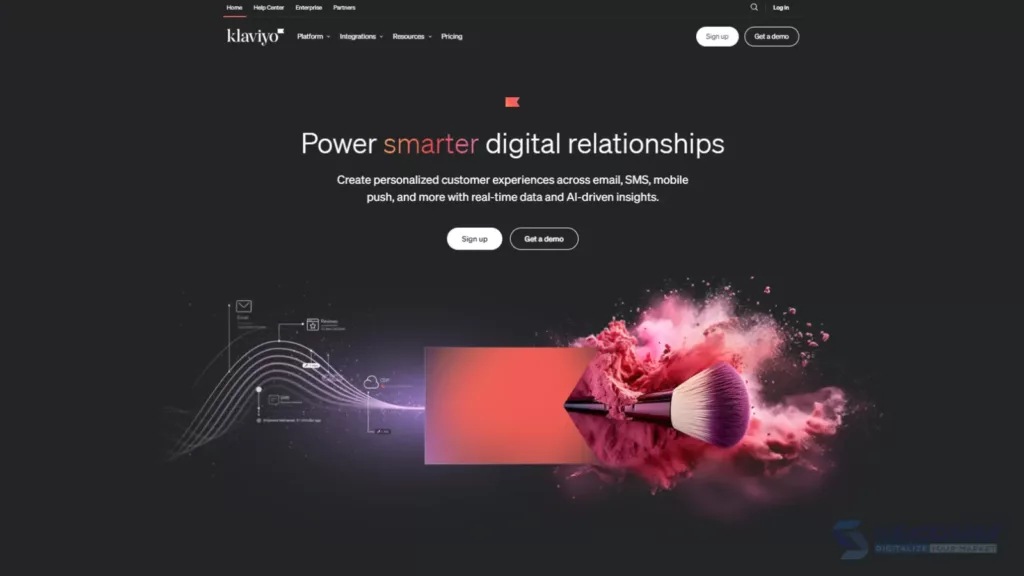
Klaviyo is a powerful tool for email and SMS marketing. With Klaviyo, businesses can create custom and automated email campaigns based on customer behavior, track performance, and interactions to optimize conversion rates and establish closer customer relationships.
Key features:
Pricing:
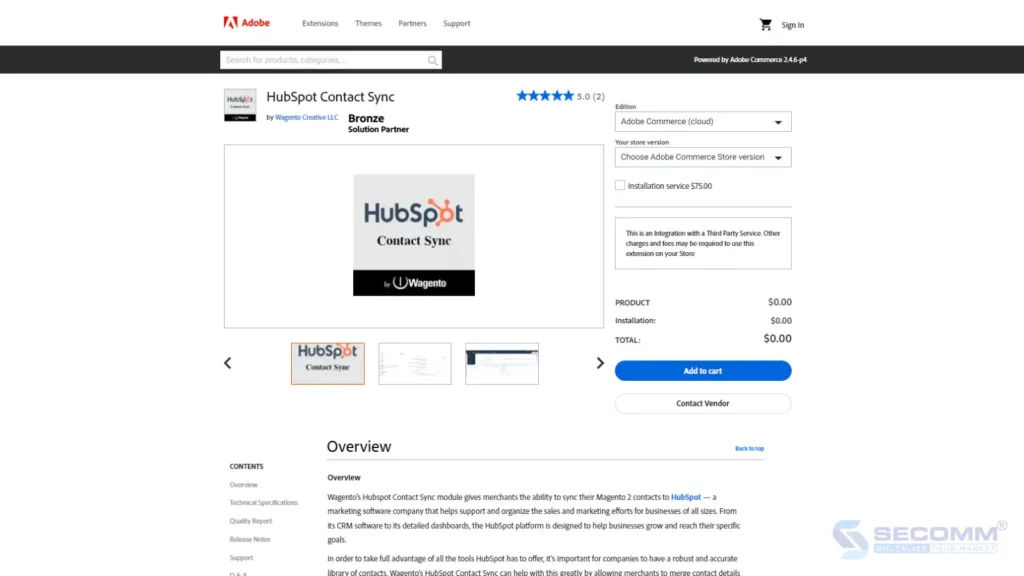
This extension integrates Magento with HubSpot CRM, allowing businesses to automatically synchronize customer information between the two platforms. This facilitates more efficient tracking and management of customer information and enables optimized marketing campaigns.
Key features:
Pricing: Free to use
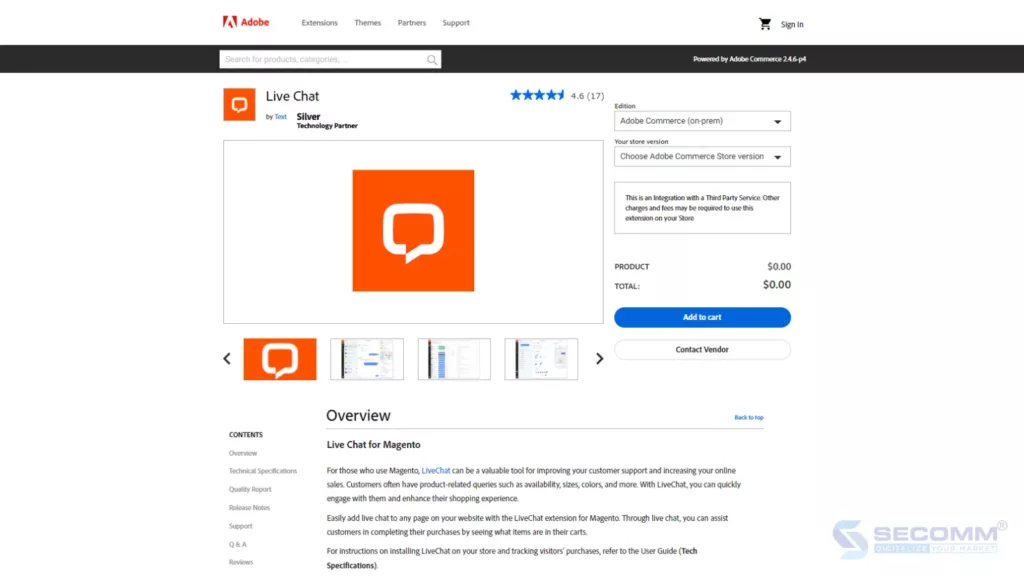
LiveChat is a powerful online customer care solution for Magento. LiveChat helps businesses enhance interaction and provide quick and professional support. This helps businesses improve the shopping experience for customers and increase conversion rates.
Key features:
Pricing:
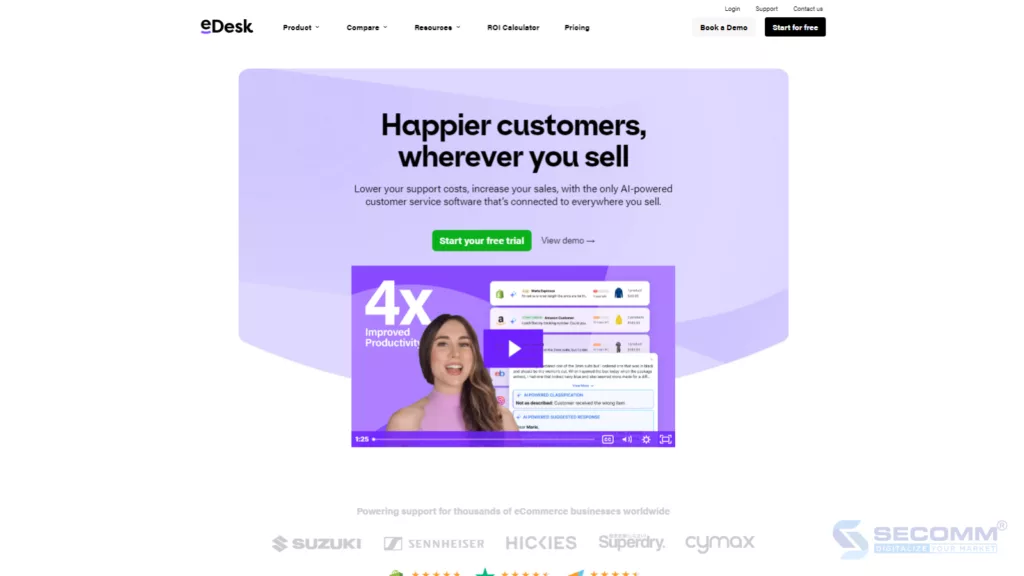
eDesk is a preferred centralized customer service and support management platform by many Magento businesses. This tool helps efficiently manage and respond to customer inquiries in an automated manner. This improves the efficiency of customer service teams and enhances customer satisfaction.
Key features:
Pricing:
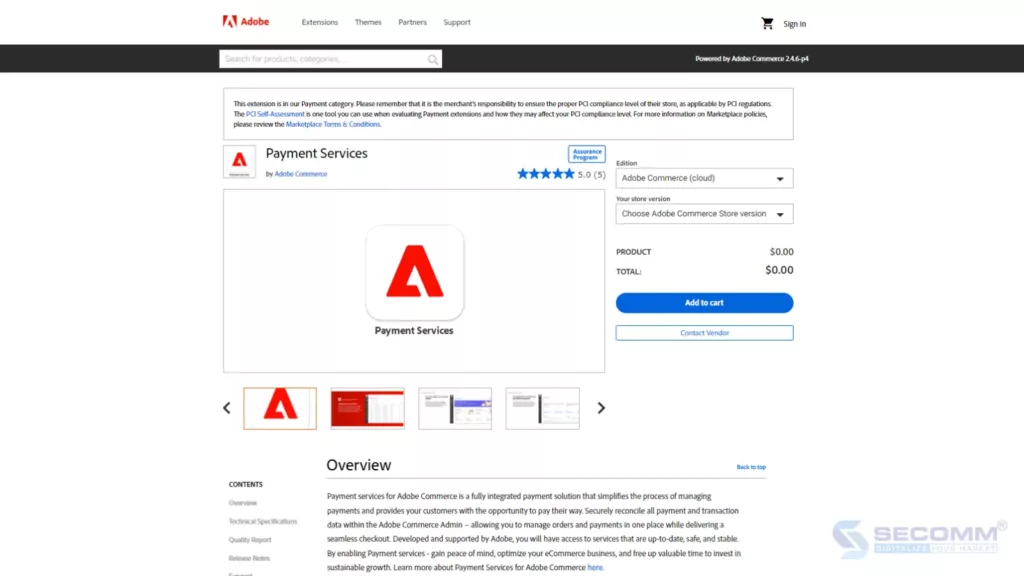
This is an Adobe Commerce extension that simplifies the payment process for businesses and allows customers to pay for orders the way they prefer. This extension ensures security for payment data and transactions, allowing admins to manage orders and payments in one central location while still providing a seamless payment experience.
Key features:
Pricing: Free to use
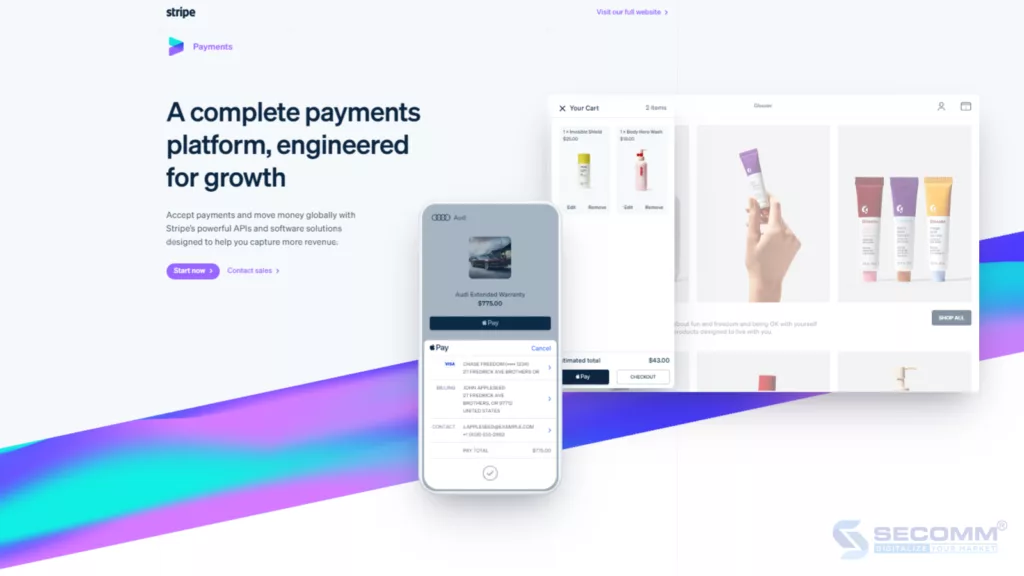
Stripe Payments is a prominent extension of the Magento platform, allowing for easy and secure online payment integration via Stripe, one of the leading payment gateways in the market. Stripe enables businesses to accept various forms of payment, providing convenience and flexibility for both customers and businesses.
Key features:
Pricing:
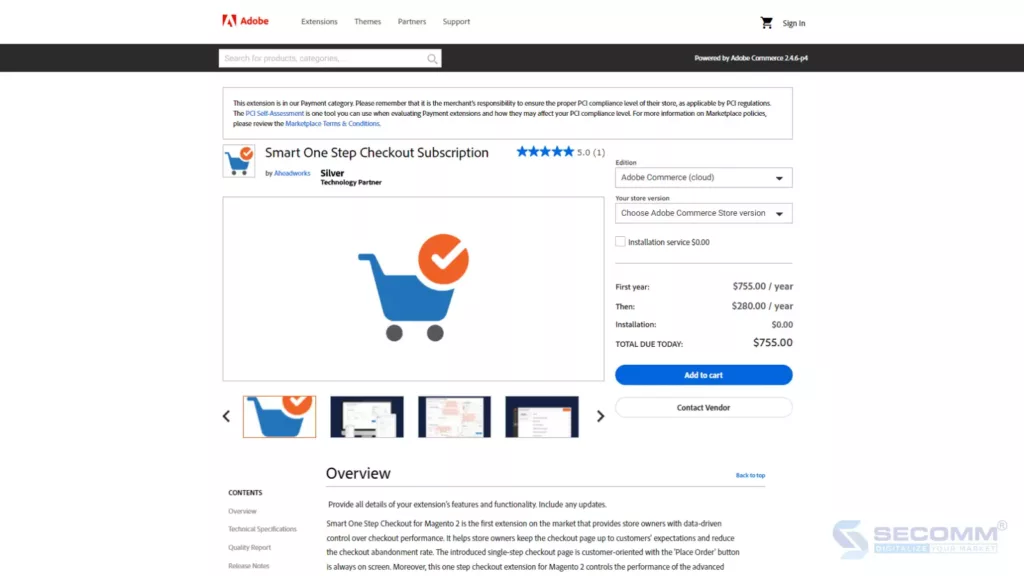
This extension provides a quick and convenient payment experience for customers, helping to reduce the time and steps required to complete an order. This contributes to increasing order completion rates and reducing cart abandonment rates.
Key features:
Price:
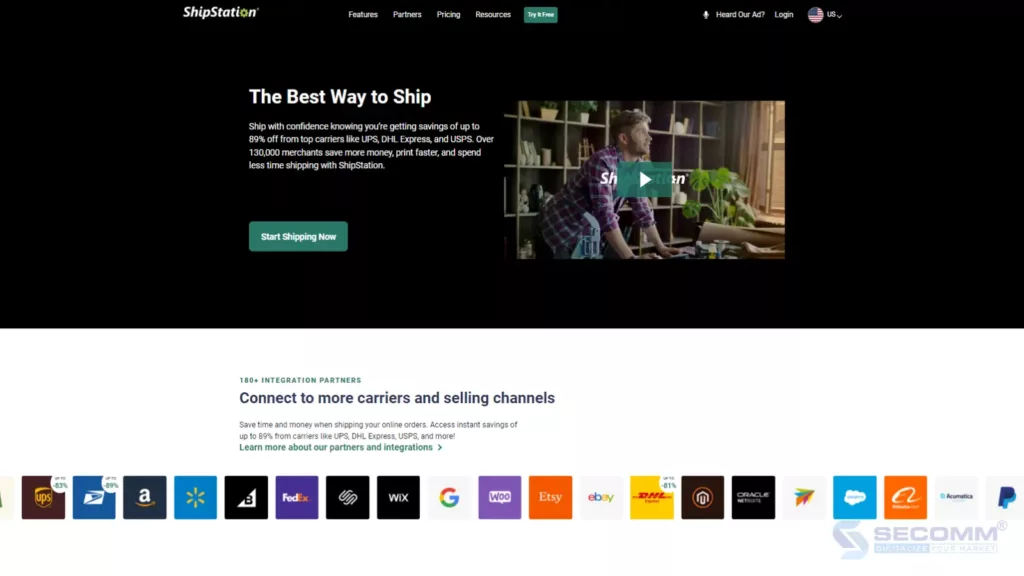
ShipStation is an integrated shipping platform that helps businesses easily manage and ship orders from various sources. By automatically integrating with leading carriers, businesses can save time and effort in processing and shipping orders.
Key features:
Pricing:
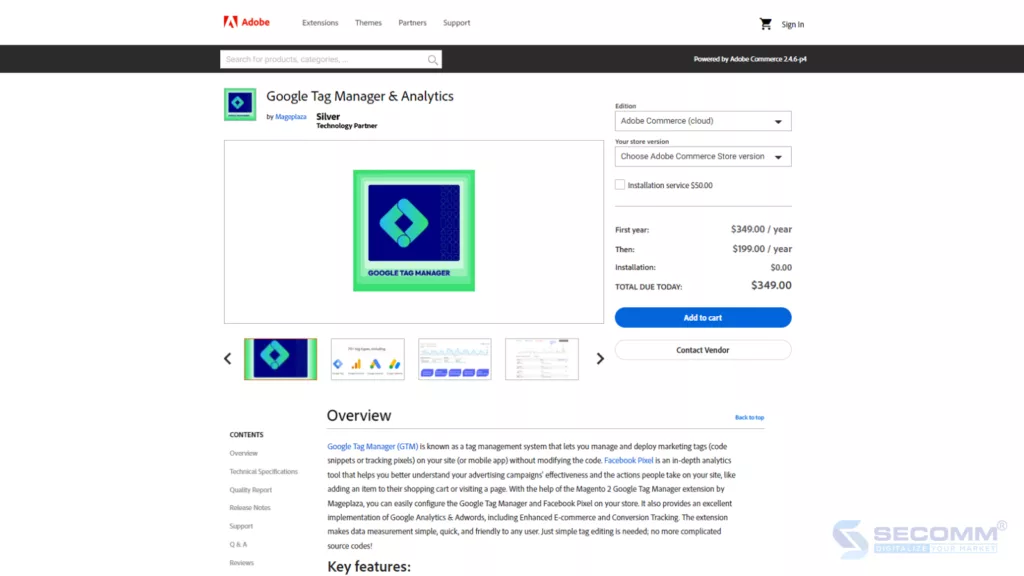
One of the noteworthy Magento extensions to consider integrating is Google Tag Manager & Analytics. This is a Google management and analytics tool that seamlessly integrates with the Magento website system, allowing businesses to track and analyze customer behavior on the website more effectively. With this extension, businesses can easily manage tags and track the performance of marketing campaigns.
Key features:
Pricing:
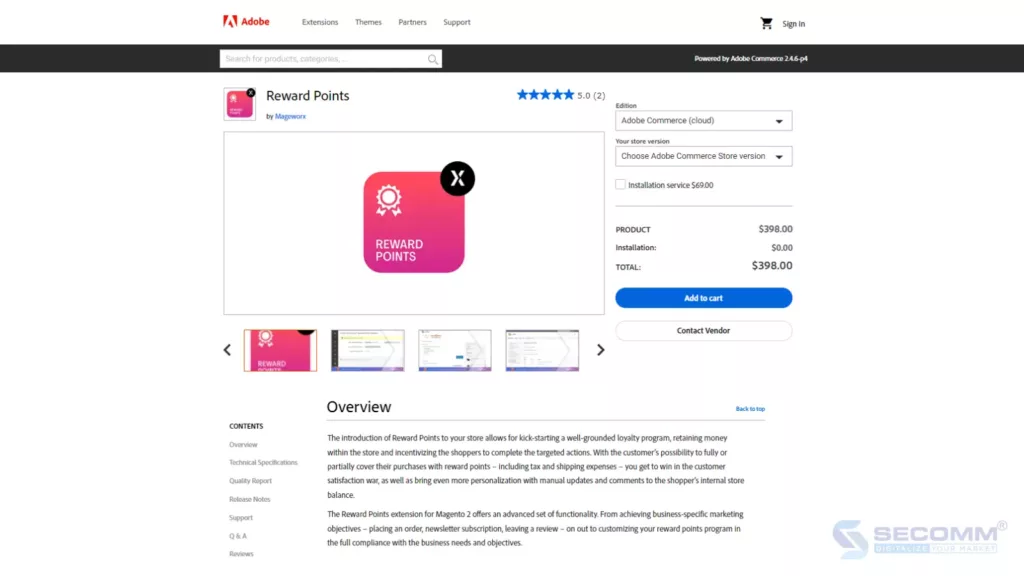
This extension allows businesses to create attractive reward point programs on the Magento website. This contributes to encouraging customer loyalty and increasing conversion rates. By providing rewards for every shopping action, customers are incentivized to return and shop more frequently.
Key features:
Pricing:
Above are the 10 best Magento extensions, ranging from free options to paid solutions. Using extensions provides many opportunities to improve business performance and create the best shopping experience for customers.
Need advice on choosing the best-suited extensions for your Magento store? Contact SECOMM today!
 2
2
 921
921
 0
0
 1
1
Online shopping has become an indispensable trend in Singapore. Therefore, consumers in this city have set higher demands for their online shopping experience, driving businesses to strive for optimizing their eCommerce websites to provide a unique and best shopping experience for customers.
Below are 10 brands heavily investing in the online shopping experience in Singapore, as collected by SECOMM from BuiltWith, AfterShip, and Similarweb.

Charles & Keith, a leading fashion brand in Singapore, was founded in 1996 by two brothers Charles and Keith Wong. Focusing on footwear, handbags, and fashion accessories, Charles & Keith quickly gained attention in the market for its modern, youthful fashion style at affordable prices.
Charles & Keith has chosen Salesforce Commerce Cloud to build its website. Thus, Charles & Keith’s website features a range of functions to create the most convenient and comfortable online shopping experience for users. These include advanced search with filtering and sorting, detailed product views with high-quality images and customer ratings, secure shopping cart and payment, along with order tracking and purchase history. Additionally, customers can enjoy loyalty rewards, seek customer support, read fashion blogs, and connect on social media to stay updated on the latest trends. With this diversity and convenience, Charles & Keith’s eCommerce website in Singapore has provided an excellent online shopping experience for users.
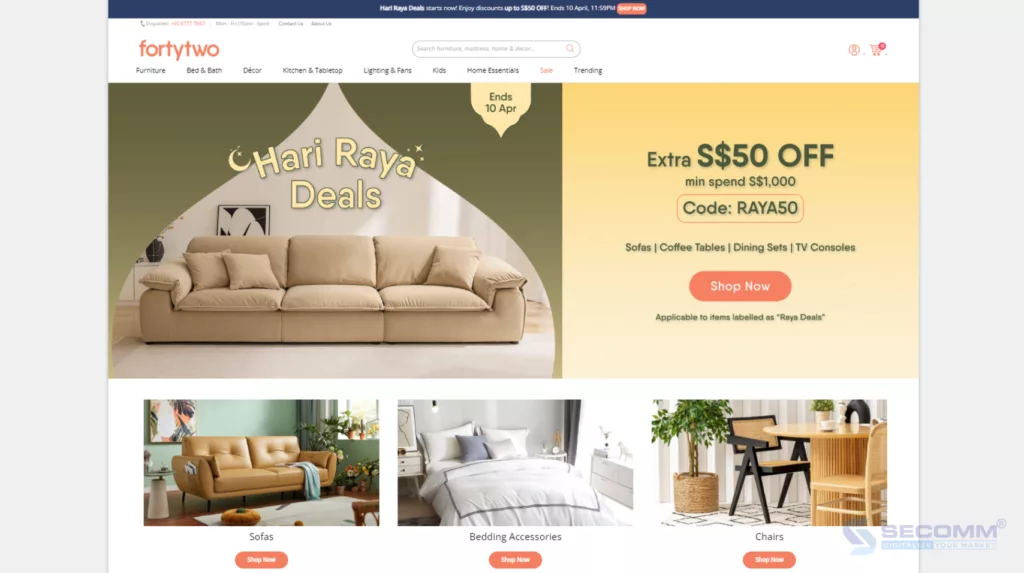
FortyTwo is a furniture and home accessories brand established in Singapore in 2007. FortyTwo offers a range of products from bedroom furniture, living room, kitchen to household items and interior decoration. The brand is known for providing quality products at competitive prices with fast delivery and attentive customer service. FortyTwo regularly updates and expands its product portfolio to meet diverse customer needs.
FortyTwo’s website is built on the Magento Open Source platform (Adobe Commerce free version). With this website, users can easily search and filter products, explore a variety of product categories from furniture to household items. Additionally, the website offers the ability to integrate attractive promotional campaigns and customer support, along with fast and secure delivery services.
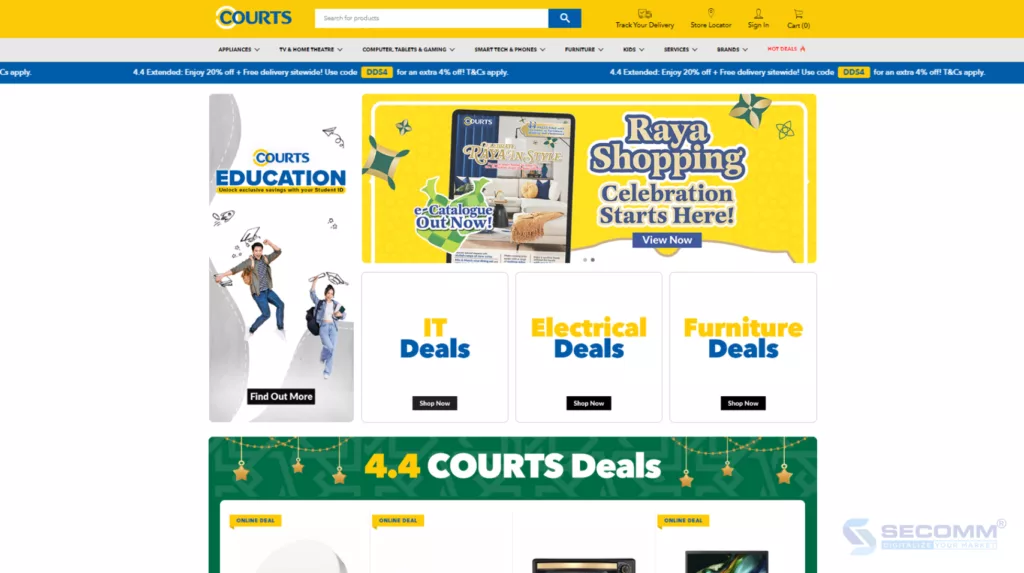
COURTS is a leading electronics retailer in Singapore, Malaysia, and Indonesia. With over 40 years of experience, COURTS offers customers a wide range of product choices, convenient services, and competitive prices.
COURTS uses Magento Open Source to build its eCommerce website. This website provides diverse and convenient online shopping experiences for users with functions such as product categories, specific product search, store information, and order tracking on the website. COURTS also provides support services and information about promotional programs and product news.
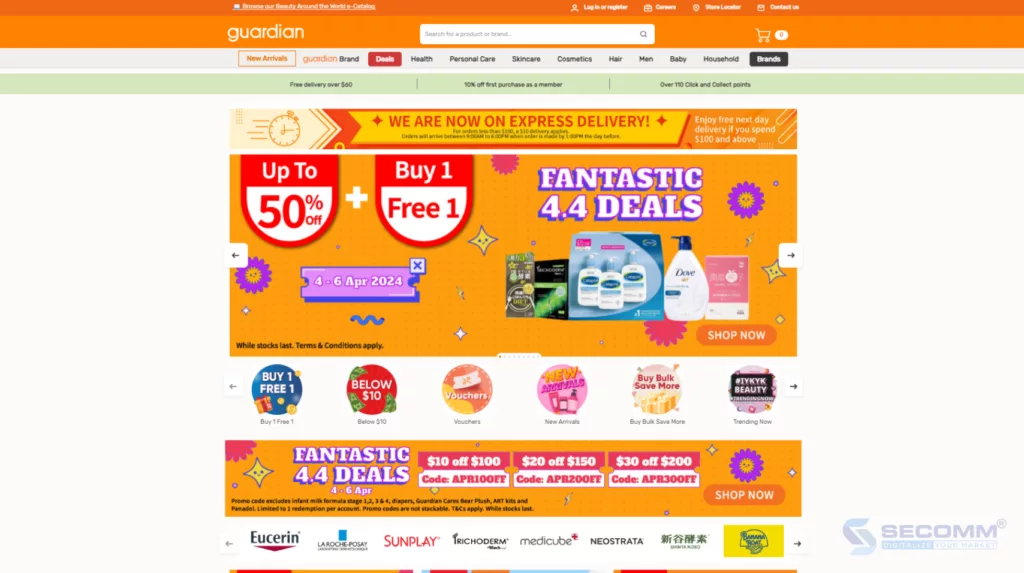
Guardian is a retail chain specializing in health care, cosmetics, and other consumer products. Guardian has a presence in many countries and regions around the world, including Singapore, with a range of products from famous and reliable brands.
Guardian’s website is built on the SAP Commerce Cloud platform, offering many useful features for users. Customers can easily search and purchase products, manage their shopping carts, and make convenient payments. At the same time, the website offers promotions and online support services to help customers have a comfortable and safe online shopping experience. Moreover, customers can also rate and provide feedback on products, providing useful information for other users.
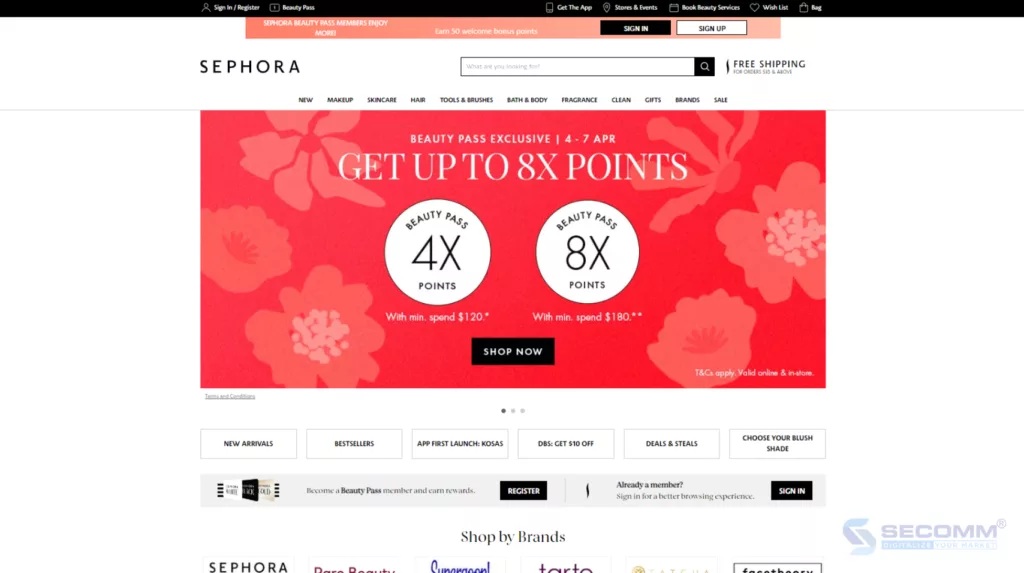
Similar to Guardian, Sephora is a global retail chain of cosmetics and beauty products, known for offering a range of cosmetics, skincare, and beauty products from leading brands worldwide. Currently, Sephora has a presence in the Singapore market with physical stores in major shopping centers and an eCommerce system, including a website and app for customers. Sephora is favored for its product diversity, customer care services, and innovation in the online cosmetics shopping experience.
Sephora’s eCommerce system in Singapore is built on the Vue.js and Nuxt.js programming languages. With this system, Sephora customers can quickly search and explore products through smart search and various filters. The online shopping experience is optimized with detailed product information, sharp images, and customer reviews.
Sephora’s app is also highly rated, making shopping easier for customers with features like “Virtual Artist” and receiving notifications about promotions. In general, Sephora offers a range of features and services to meet customers’ cosmetics shopping needs, creating a professional and convenient online shopping experience.
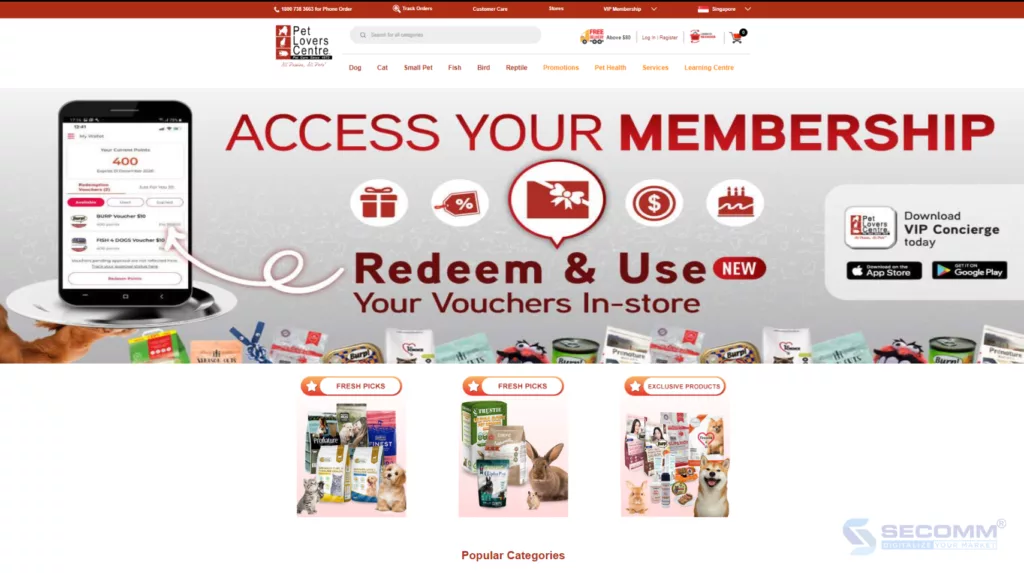
Pet Lovers Centre is a leading pet products and services retailer in Asia. Established in 1973 in Singapore, Pet Lovers Centre now has over 160 stores in 5 countries: Singapore, Malaysia, Thailand, the Philippines, and Vietnam. Pet Lovers Centre is committed to providing quality products and services from reputable brands at competitive prices.
The Pet Lovers Centre website is built using PHP programming language and has outstanding features to provide users with a convenient online shopping experience. Users can search for products based on various criteria and use filters to select suitable products. The multi-layered product categories are classified by pet type, ensuring diversity and richness. The VIP Member program brings benefits to customer loyalty strategies. Integrating customer reviews on Google Maps helps users evaluate the quality of products and services provided by Pet Lovers Centre. Additionally, the website builds a quick shopping function to save time, customer management feature, and reorder support to efficiently manage customer information and orders.

HipVan is an online retail website specializing in furniture and home decor, headquartered in Singapore. The brand was founded in 2013 with the aim of providing customers with high-quality furniture products at affordable prices, along with a convenient shopping experience and excellent customer service.
HipVan’s website is built using the Ruby on Rails and React framework, with Ruby being the primary programming language. Its notable features include building a community for sharing interior design ideas, image-based product search, and allowing customers to upload images of desired products. Particularly, the augmented reality (AR) feature enables customers to view products in their real-life space before making a purchase. Additionally, HipVan offers free interior planning services to help customers conveniently plan and design their living space.
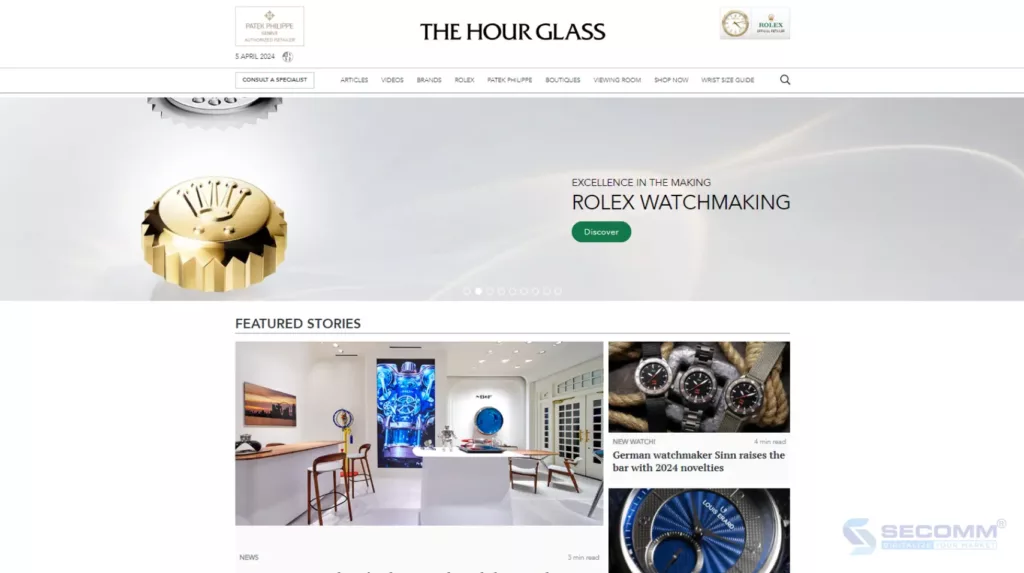
The Hour Glass is a premium watch retailer in Singapore founded in 1974. Currently, The Hour Glass has over 50 stores worldwide and is an authorized distributor for many leading watch brands such as Rolex, Patek Philippe, Audemars Piguet, Omega, Cartier, and more.
The Hour Glass’s online store is built on the WooCommerce platform and CMS WordPress, providing a convenient platform for customers to explore and purchase watches from renowned brands like Rolex, Patek Philippe, Audemars Piguet, and other luxury brands. In addition to product offerings, the website also provides detailed information about the services offered by The Hour Glass, including repairs, maintenance, and polishing of watches, to help customers maintain and preserve their products effectively. Furthermore, the website continuously updates the latest news in the watch industry along with special events organized by The Hour Glass, creating a comprehensive and immersive experience for users.
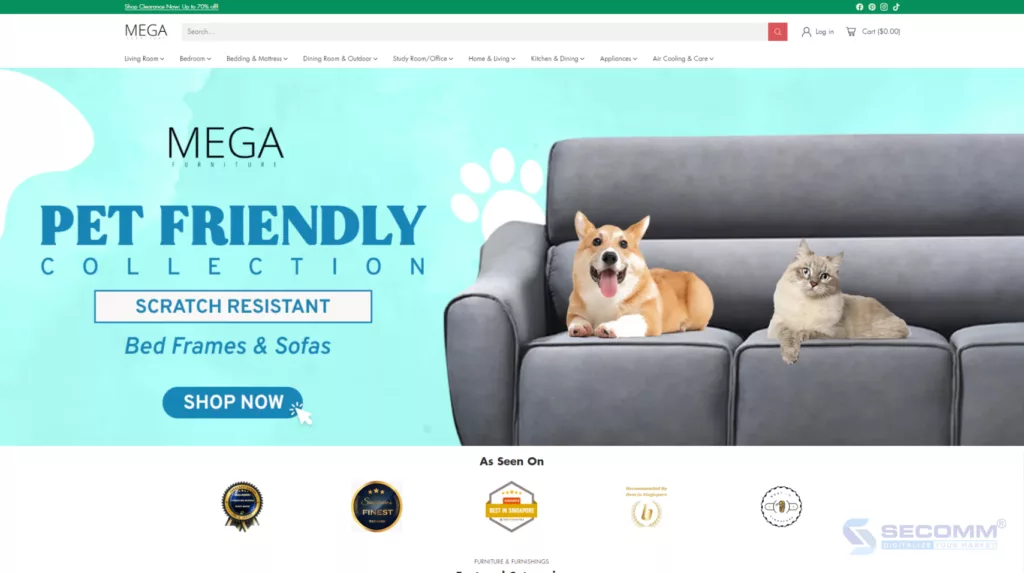
Megafurniture is a furniture retail company in Singapore, specializing in providing a range of furniture products for living rooms, bedrooms, dining rooms, and various other spaces in homes. Megafurniture is known for offering affordable and high-quality products, attracting the interest of many consumers. Additionally, the furniture brand is also renowned for its early investment in the online store, allowing customers to conveniently shop for furniture online.
Megafurniture’s website is built on the leading Shopify Plus platform, with basic and advanced features optimized for the furniture industry. The purchasing process is designed to be simple and straightforward, providing a convenient online shopping experience for customers. Secure online payment support through various methods increases flexibility for consumers. Megafurniture also offers multiple delivery and installation options to meet customer needs. Moreover, features like quick product view and product comparison assist users in making smart and efficient purchasing decisions. This, combined with fast checkout features, significantly enhances the online shopping experience.
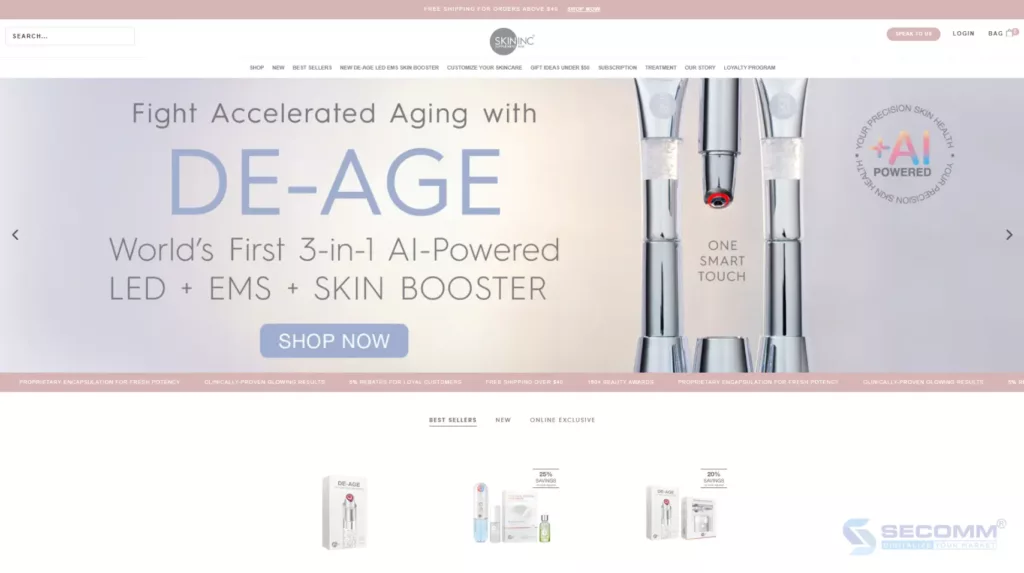
Skin Inc is a skincare brand specializing in manufacturing and distributing high-quality skincare products. The company focuses on providing skincare solutions, including brightening, moisturizing, anti-aging, and treating various skin concerns.
Skin Inc transitioned from the Magento platform to Shopify Plus in 2019, aiming to enhance the customer experience by deploying multiple website versions for different markets and customer segments. Using the LaunchPad feature, Skin Inc employees can create sales events without developer assistance. Additionally, Shopify Plus seamlessly integrates with marketing tools and loyalty programs, enabling personalized communication and data-driven marketing strategies.
Conclusion
The above is a list of the top 10 eCommerce websites in Singapore. By implementing leading platforms such as Magento Open Source, Shopify Plus, and various others, these brands provide optimized online shopping experiences, attracting the interest of customers both domestically and internationally.
During its development process, SECOMM has collaborated with numerous clients from Singapore to create notable eCommerce websites, with the most prominent being the project to develop an online liquor supply system at Changi Airport.
 2
2
 849
849
 0
0
 1
1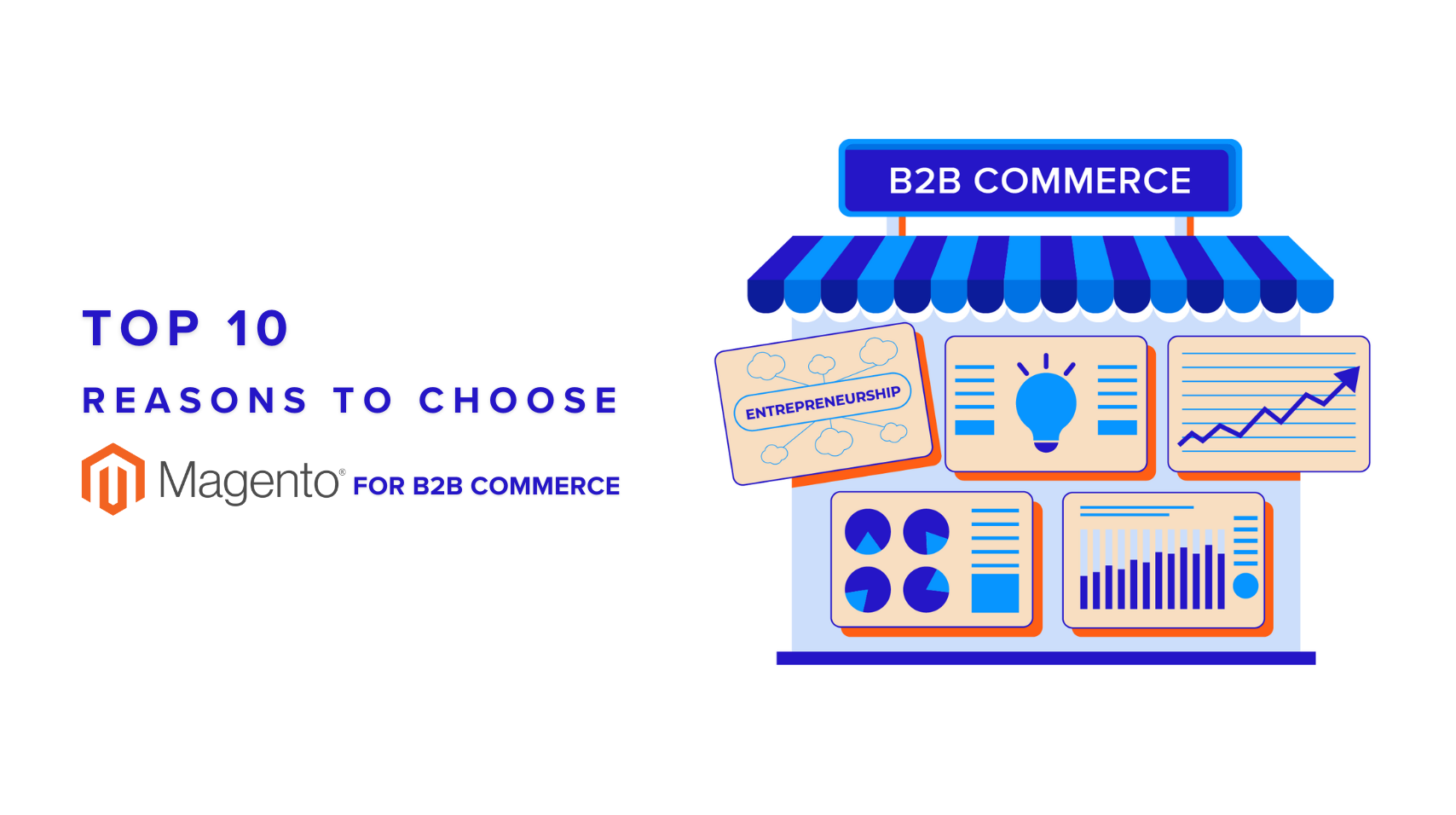
Over the past decade, Magento has solidified its position as one of the leading eCommerce platforms in the market. With its robust capabilities, the platform serves not only B2C businesses but is also a popular choice for enterprises.
By combining Magento’s strength with the specific requirements of B2B Commerce, you can leverage this platform’s powerful benefits. In the following part of the article, let’s explore 10 reasons why Magento is the ideal choice for deploying this great business model.
Business-to-business commerce (B2B Commerce) refers to the buying and selling of goods or services between businesses rather than between a business and end consumers (B2C). In the B2B environment, transactions often occur on a large scale and involve large orders, long-term contracts, and strategic partnerships.
This business model has distinct characteristics and requirements compared to B2C Commerce. In the B2B world, businesses typically have more complex demands regarding product management, order management, customer management, and compatibility with enterprise resource planning (ERP), customer relationship management (CRM), and other systems.
Additionally, the business model often requires features such as order confirmation, complex payment processes, batch ordering, and wholesale pricing. For B2B enterprises, choosing a suitable eCommerce platform is crucial to ensuring business efficiency and delivering the best user experience for their partners and customers.
Magento is a powerful and flexible eCommerce platform developed by Magento Inc., a subsidiary of Adobe. Launched in 2008, it quickly became one of the top choices for you looking to build and operate professional online stores.
It allows you to create custom eCommerce websites. This platform provides a range of features, including product management, order management, payment integration, customer management, and many others, enabling you to easily manage and operate your online stores efficiently.
It is built on open-source code, meaning that you can access and customize the platform’s source code based on specific technical requirements.
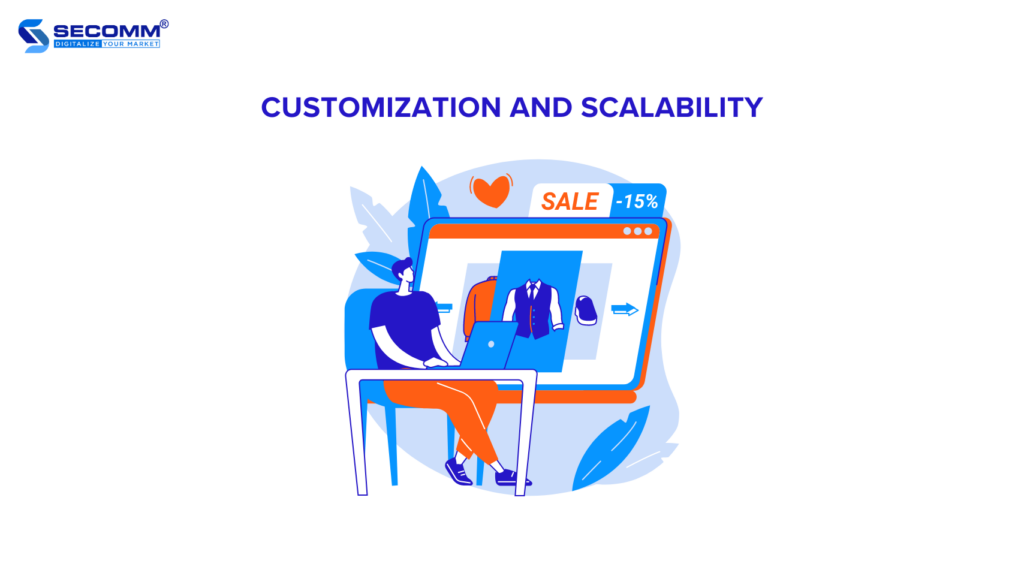
Magento’s open-source platform characteristic enables businesses to easily and effectively expand their business scale. This is particularly important as businesses grow and must enhance the system’s scalability.
Additionally, the platform provides high customization capabilities, allowing businesses to adjust to their specific business needs flexibly. This also means that the shopping experience can be customized to become unique and tailored to the target customers.
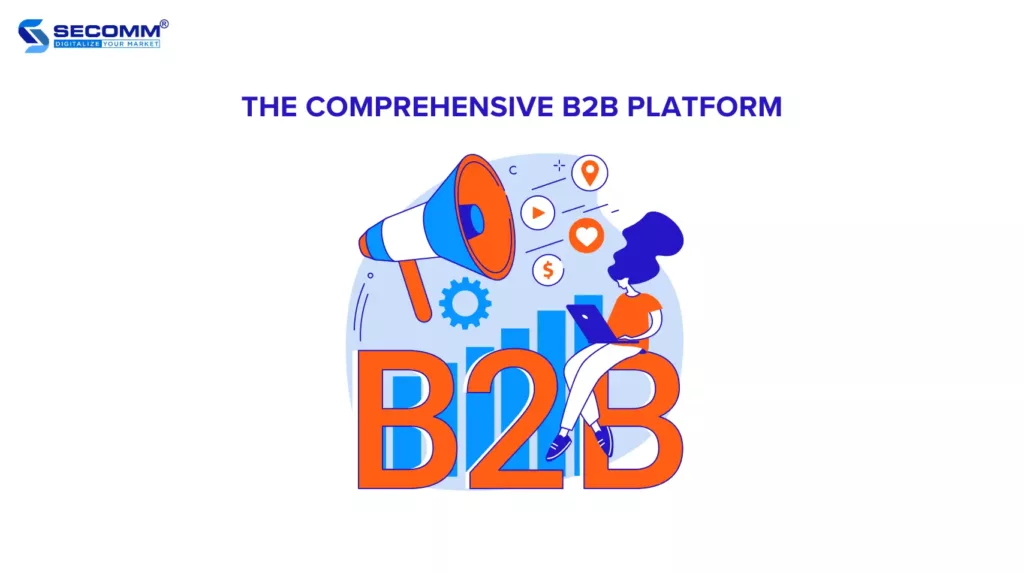
In addition to offering built-in Magento B2B features, the platform allows businesses to seamlessly and quickly integrate with many third-party applications and systems, thereby creating a comprehensive and automated eCommerce system. Some integrated systems may include:
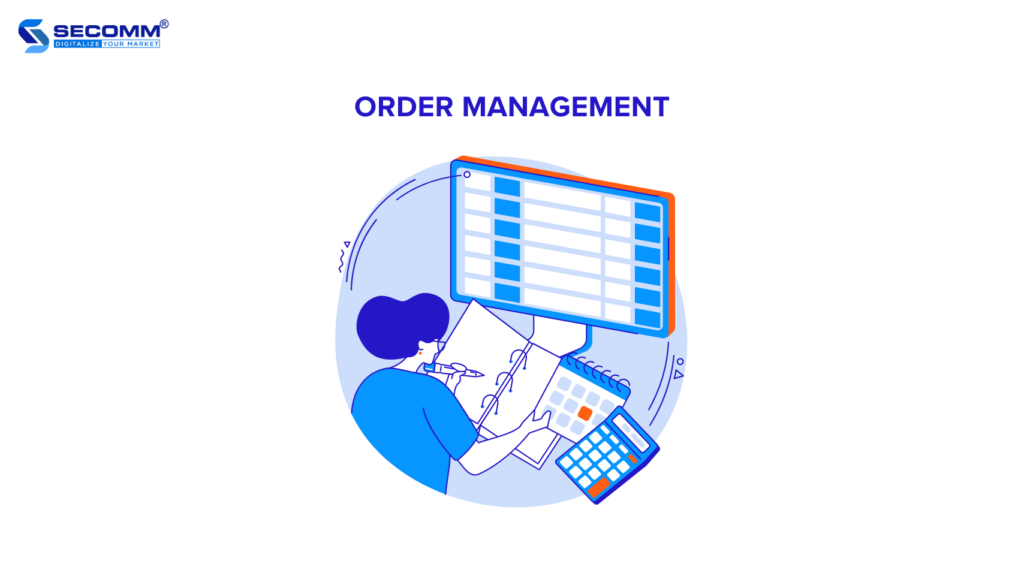
Magento B2B provides a variety of order management features, from creating and editing orders to tracking and processing orders efficiently. This helps B2B businesses easily monitor and manage their orders accurately and consistently.
Additionally, it offers tools and features that allow tracking and analysing their orders’ performance. From generating overview reports to tracking order history and purchasing trends, the eCommerce model deployed, you can better understand your activities and make informed strategic decisions.
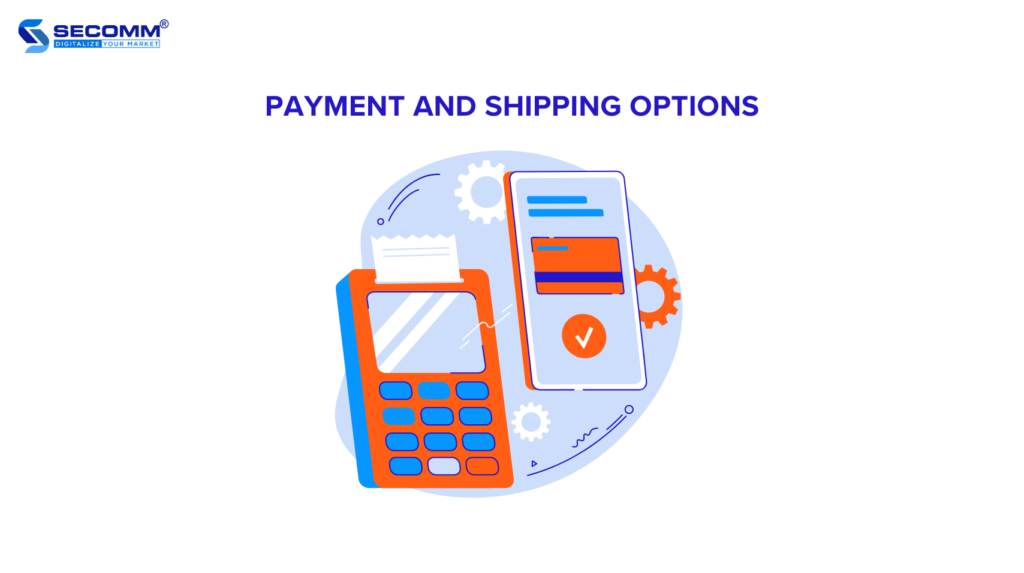
Implementing Magento B2B allows you to offer more payment methods to customers, from online payments through electronic payment gateways to cash on delivery (COD).
Additionally, you can integrate various payment gateways through Magento, such as PayPal, Stripe, Authorize.Net, and many more. This ensures security and convenience in the payment process for both businesses and customers.
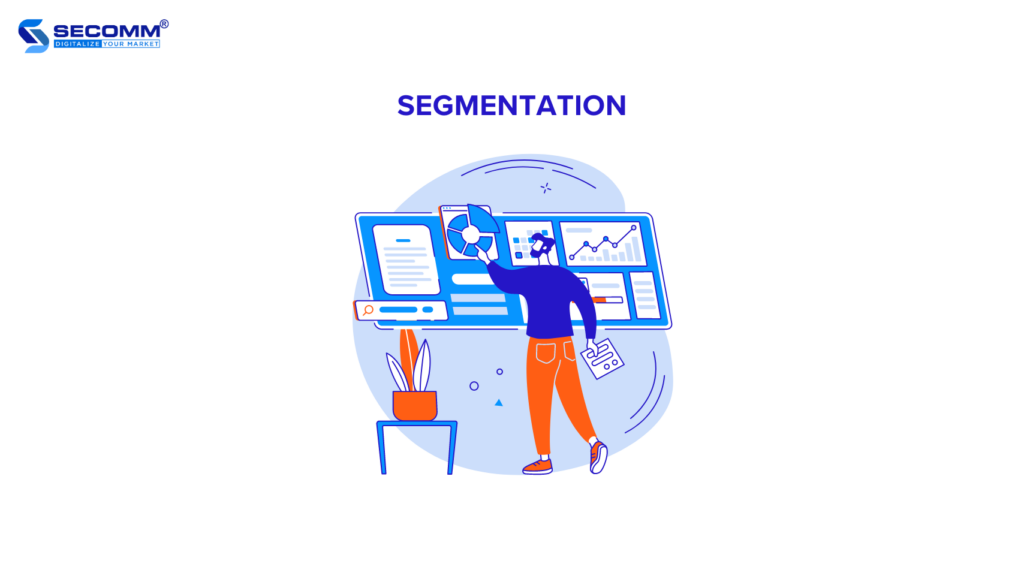
Magento B2B provides features and tools to implement customer segmentation strategies effectively. Among these, the most notable is the Advanced Reporting feature, which provides a dashboard for tracking and analyzing sales data.
With this feature, businesses can segment customers and customize experiences based on web browsing behavior, purchase history, and various other criteria.
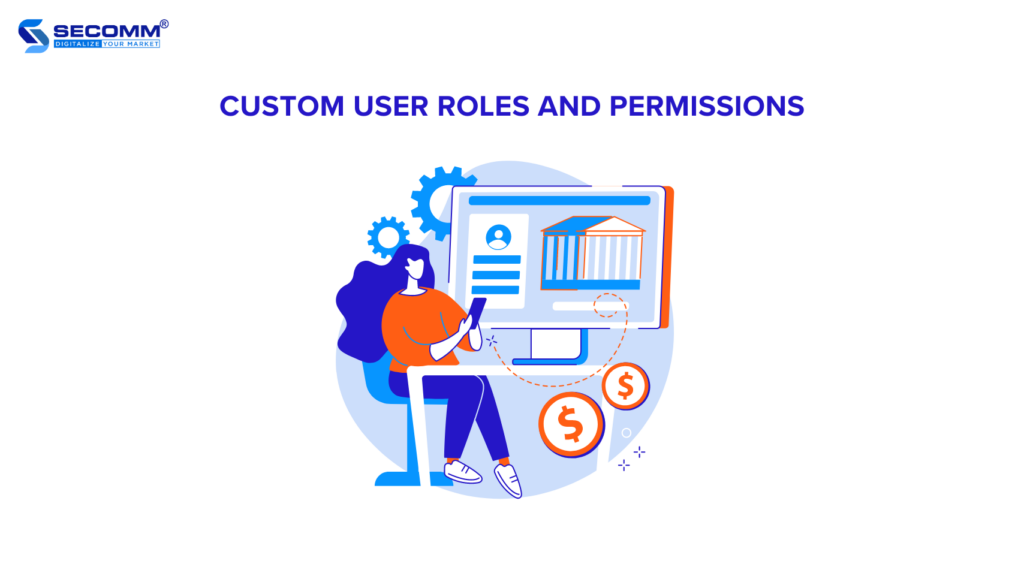
Customizing user roles and permissions is an important part of optimizing the B2B purchasing process. This feature allows B2B customers to create multiple accounts with different contact details for purchasing, ordering, quoting, negotiating, and payment. Additionally, Magento B2B allows sellers to create and assign admin accounts to manage specific customers.
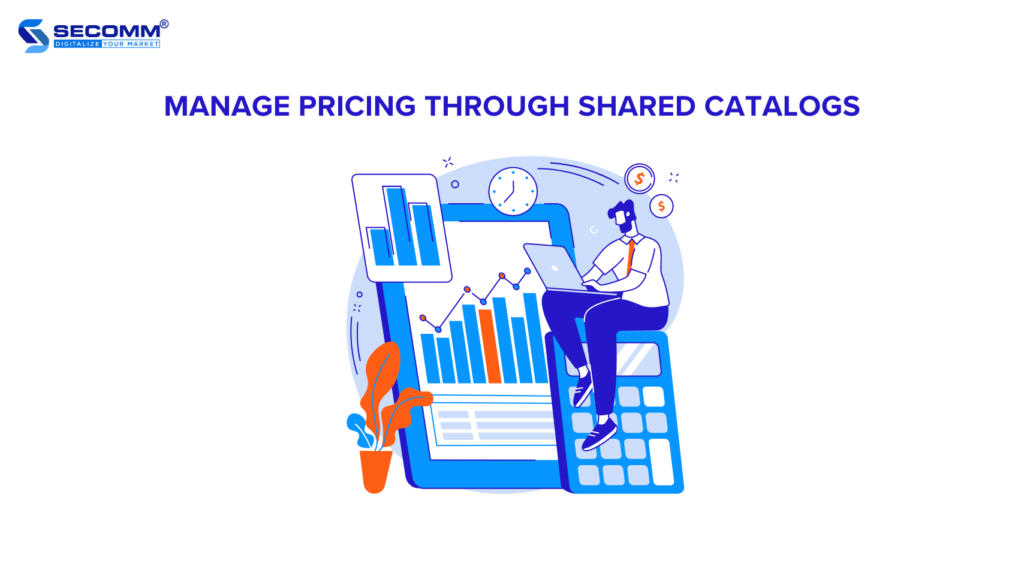
In B2B Commerce, Magento helps manage quotations through shared catalogs, which effectively provides product information and prices to B2B partners and customers. These catalogs can be created based on criteria such as product type, product group, or other suitable business needs.
Within each shared catalog, administrators can define prices and special conditions for each product or product group. This helps create customized quotations that meet the specific requirements of each customer.
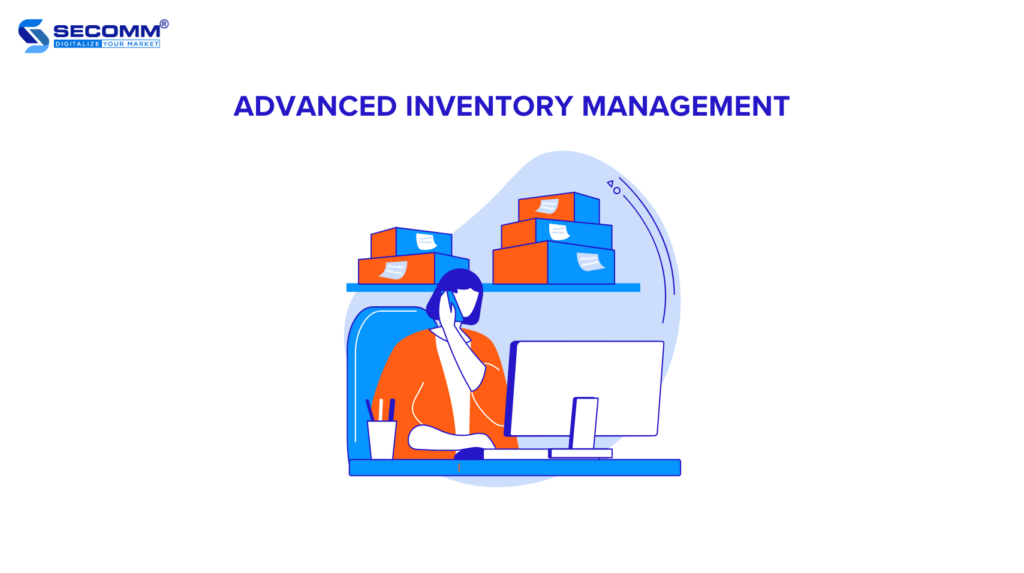
Inventory management is a challenging task for businesses implementing B2B Commerce. The eCommerce platform provides advanced features to effectively manage and control your inventory levels. These features allow administrators to track inventory quantities and forecast future inventory needs.
Additionally, Magento B2B helps manage special types of inventory such as damaged goods, special inventory items, or batch inventory.

Security is an important issue when building and developing online stores in general. Magento provides many advanced features to help B2B businesses to secure their eCommerce systems. Among these, PCI Compliance, 2FA, WAF, DDoS protection, and preventing CSRF and XSS attacks are notable.
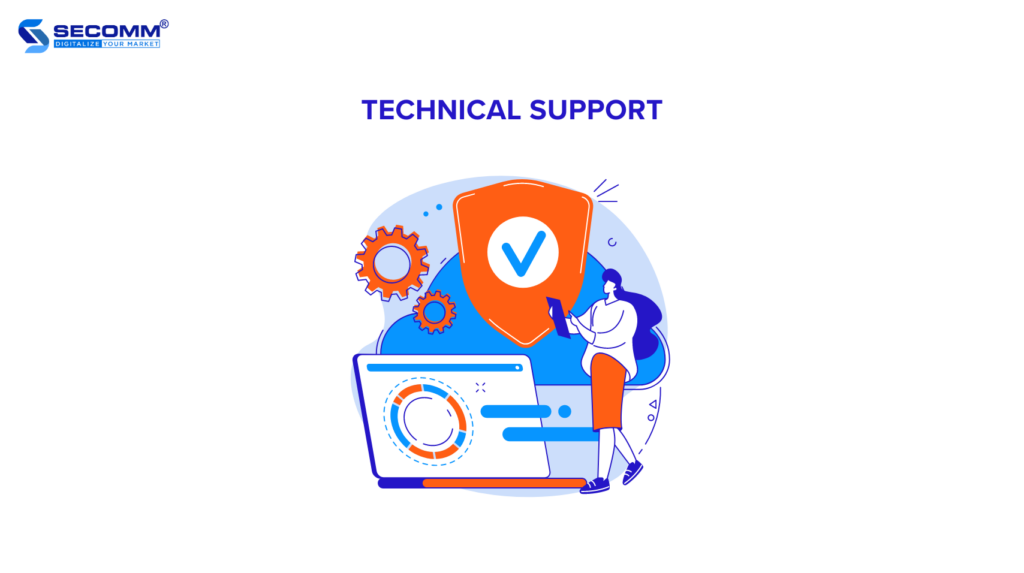
Technical support plays a crucial role in maintaining and operating an efficient online store. Magento B2B provides tools and support services to help users address technical issues and optimize the performance of their eCommerce websites.
This includes expert support via phone, email, or online. Additionally, Magento has a large and vibrant community of developers, experts, and end-users. You can search and ask questions on the forum to receive assistance from the community.
Build your first Magento B2B site today!
In the context of the increasingly developing and fiercely competitive eCommerce market, using a powerful eCommerce platform is extremely important to ensure the success. With its unique features and superior flexibility, Magento has proven to be a top choice for building and developing B2B stores.
Need more deep advice? Contact SECOMM or call (+84)28 7108 9908 now!
 2
2
 1,899
1,899
 1
1
 1
1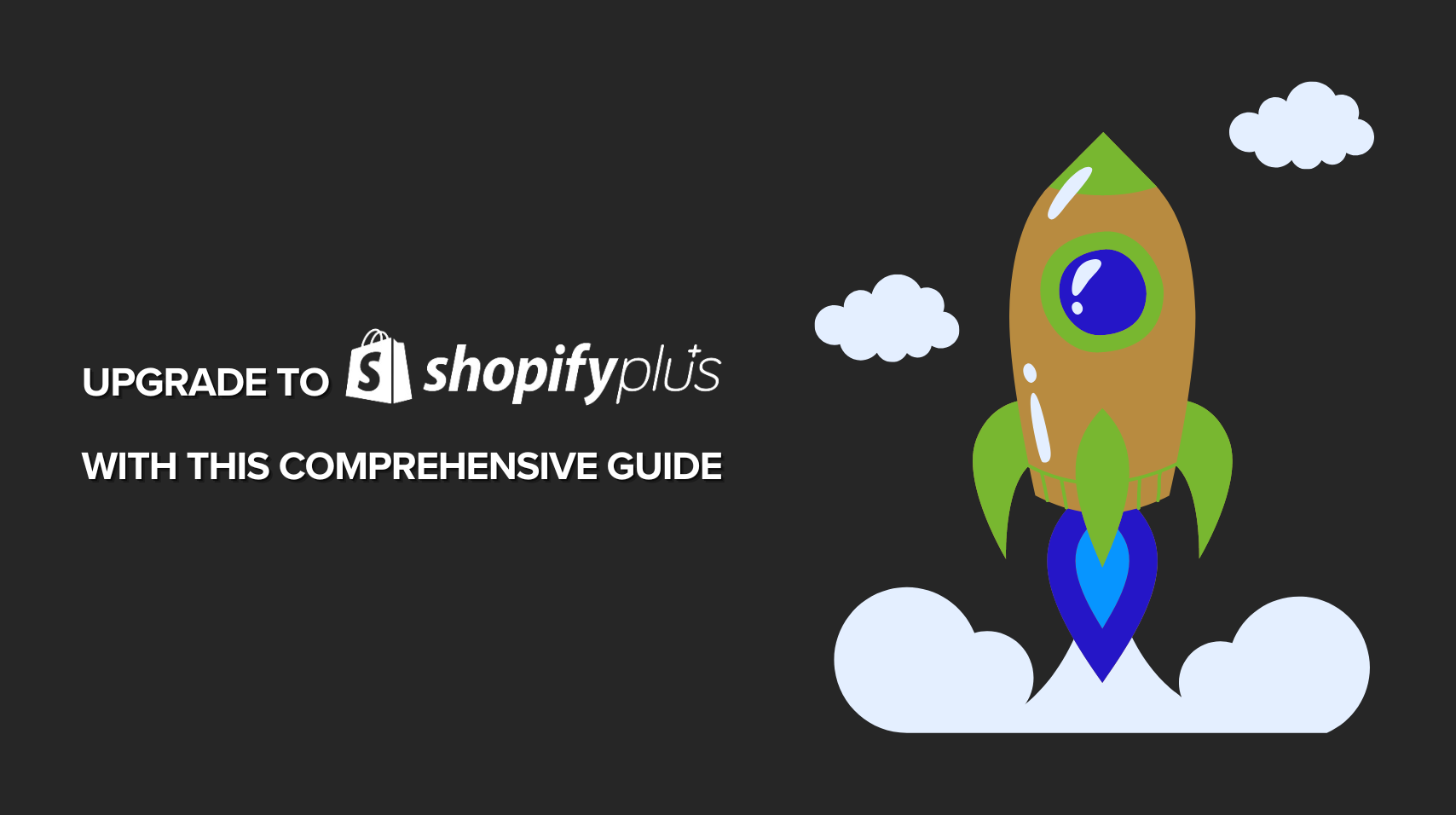
Upgrading to Shopify Plus is a strategic decision for growing ecommerce enterprises. Many merchants have encountered the challenges and opportunities this upgrade brings along their journey.
From optimizing business performance to expanding operations globally, upgrading to Shopify Plus isn’t just a technical step but also an opportunity to transform ecommerce activities into a springboard for market breakthroughs.
In this article, let’s explore the steps to upgrade to Shopify Plus and some critical considerations.
This is the premium version of the Shopify platform, specially designed to meet the needs of large and rapidly growing ecommerce businesses. With Shopify Plus, you can experience many powerful features and services that help optimize operations, expand scale, and enhance customer experiences.
One notable aspect of Shopify Plus is its flexibility and ease of customization. You can leverage features such as multi-store management, integration with ERP and CRM systems, creating multilingual and multi-channel websites, as well as adjusting interfaces and features according to your specific needs.
In particular, Shopify Plus provides a secure and easily scalable infrastructure that is capable of handling large volumes of traffic and online transactions robustly. With Plus, you can ensure that your website operates smoothly and seamlessly, even during peak shopping seasons.
Upgrading from the standard versions of the Shopify platform to the Plus version is a significant milestone in the transformation of ecommerce businesses. Below are eight benefits and also eight main reasons driving businesses to undergo the transition:
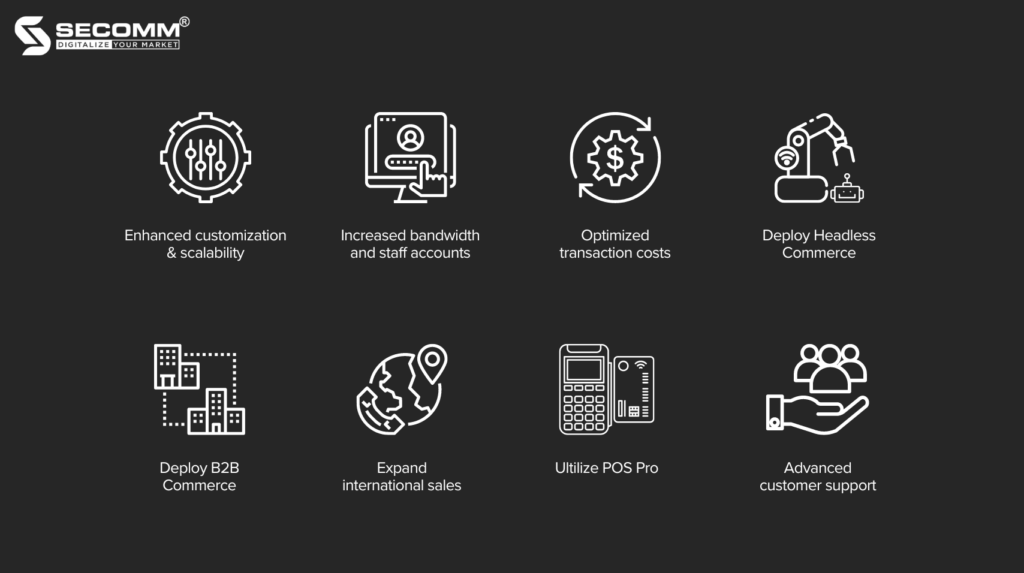
Shopify Plus offers a range of powerful features and tools to customize and expand ecommerce websites flexibly and efficiently. These include customizing checkout pages, personalizing customer experiences, and customizing product displays.
Additionally, you can utilize some exclusive solutions, such as LaunchPad, Shopify Scripts, and Shopify Functions, to customize shopping experiences and automate sales processes.
High traffic volumes will require a large amount of bandwidth to maintain a stable website. Shopify Plus allows you to access unlimited bandwidth, 200TB of storage, and unlimited staff accounts to handle large transaction volumes efficiently.
Upgrading to Shopify Plus can help optimize transaction costs. If you use Shopify Payments, transaction fees are the lowest in all Shopify pricing plans but will be customized based on geographical regions. Conversely, Plus merchants must pay 0.2% per transaction for security and compliance costs.
In the Plus version, you’ll be provided with tools and solutions to build a Headless ecommerce website. Through the Hydrogen + Oxygen solution, you can leverage the power of Headless architecture to create more customized and flexible customer experiences.
Shopify Plus provides features and tools to expand your B2B operations. The recent Shopify Editions Winter ’24 update introduced new features to optimize B2B Commerce activities.
From Headless B2B and advanced order management to integrated payment systems and unique features for B2B customers, Shopify Plus helps you streamline your operations and enhance customer relationships.
With Shopify Plus’s multilingual and multi-channel capabilities, you can efficiently expand your operations to international markets. Shopify Plus provides tools and features to customize websites according to each market’s needs, from handling currencies to managing orders and shipping.
The Plus merchants can utilize the exclusive POS Pro system for free. With advanced features, POS Pro allows seamless integration of multi-channel sales operations into the website, enables unlimited staff account access, and provides professional retail reports. This helps enhance customers’ shopping experience and optimize your offline and online sales activities.
When upgrading, you can expect more in-depth customer support services, especially in terms of consultation and technical support by a team of experts. Through hotlines, emails, and live chat, you can access the 24/7 support team.
Additionally, to help clients better understand this platform, Shopify offers a free learning program called Shopify Plus Academy. There, you can access detailed tutorials on setting up stores, customizing store interfaces, and much more.
You currently on one of Shopify’s standard pricing plans may consider upgrading to Shopify Plus under the following circumstances:
Before deciding to upgrade to Shopify Plus, there are four important steps that businesses need to take to ensure a smooth and effective upgrade process:
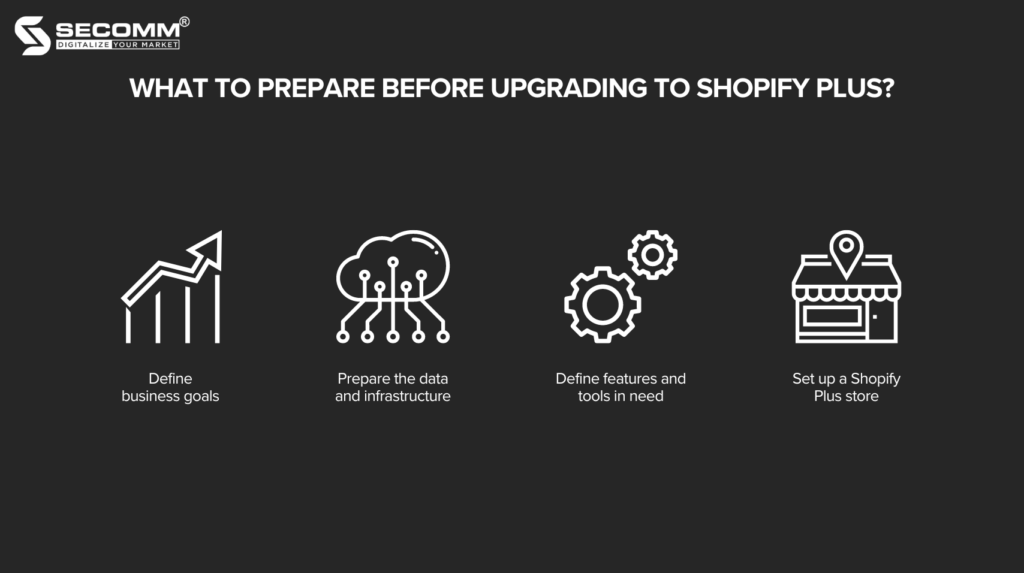
Firstly, you have to clarify your needs and wants. This includes evaluating the current and future growth of the business, as well as the necessary features to meet specific needs.
Next, you’ll need to prepare data and technical infrastructure for the transition process. This may involve backing up current data, checking the compatibility of current applications and features, as well as ensuring that the technical infrastructure is robust enough to satisfy your requirements.
Finally, you’ll identify the specific features and services you desire from Plus. This may include considering features such as multi-store management, integration with ERP and CRM systems, multi-language and multi-currency support, as well as special features like deploying Headless Commerce and accessing POS Pro systems.
Setting up a Plus store will differ from deploying previous standard pricing plans. Plus usage fees start from $2,300 per month, and this price isn’t fixed but customized based on each case’s specific needs. Therefore, you’ll need to contact the Shopify Plus team for advice. When collaborating with a Shopify Plus agency, the developer will work with the platform to provide a specific pricing quote.
Below are six specific steps for the entire process of upgrading your ecommerce website system from a lower version to Shopify Plus:
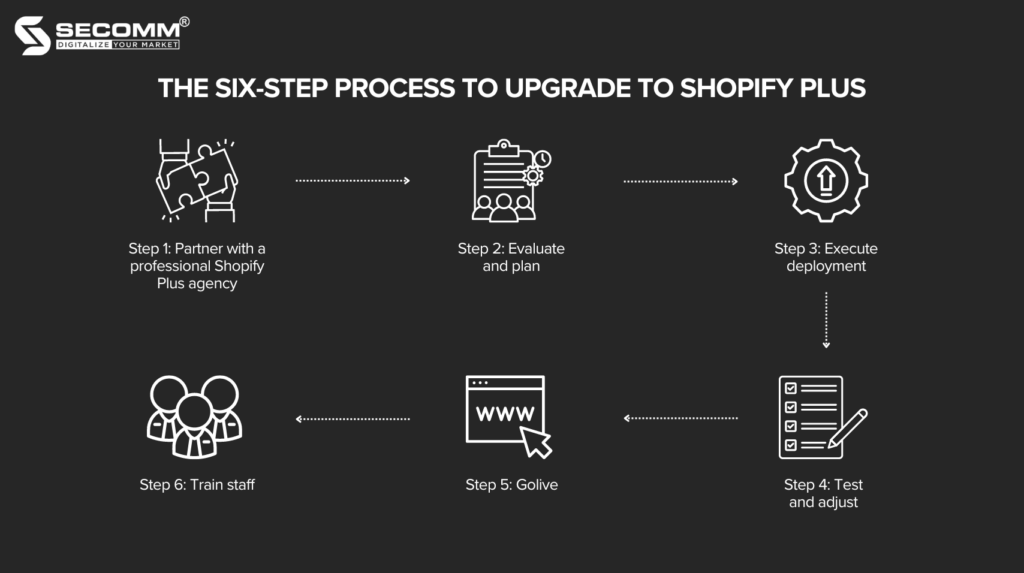
The first and most important step is collaborating with experienced teams specialising in Shopify Plus to optimize the upgrade process and post-operation, especially concerning costs.
To select a suitable Shopify Plus development partner, you should consider previous Shopify Plus projects they have completed, how they identify and solve problems in each project, and feedback from previous clients regarding those projects.
The next step is equally important as it determines the effectiveness of the conversion and future operations. You and your development partners need to clarify business goals, identify necessary features and data to be transferred, and develop a specific deployment schedule based on these goals.
You’ll also need to ensure data backup and updates are safely conducted to avoid data loss during the conversion process.
After assessment and planning, proceed with upgrading to Shopify Plus. The development partner will set up and configure new features, migrate data from the old platform to the new one, and test compatibility to ensure the website operates smoothly.
After deployment, test and adjust the Shopify Plus website to ensure all features and functions work correctly. The development partner’s QA/QC team will collaborate with you to check the quality of the website experience as actual end-users and correct any issues that arise.
Once testing is complete, the new ecommerce website will be launched into the market, and promotional campaigns will be deployed to attract initial traffic and orders.
Finally, employees should be trained to use and manage the new website on the Shopify Plus platform. You’ll provide detailed instructions on new features and how to use them to optimize the performance. Additionally, since Plus has unlimited staff accounts, personnel allocation should be reasonable and planned accordingly.
While upgrading to Shopify Plus can be complex, it significantly benefits business growth. From high flexibility and customization to scalability and deep customer service, Shopify Plus is the perfect choice for expansion.
Various insights and a systematic 6-step deployment process make the upgrade process more manageable. However, to increase efficiency and maintain the stability of the new website, businesses need a professional development partner to accompany them.
Contact SECOMM or call us at (+84)28 7108 9908 to plan your deployment today!
 2
2
 1,944
1,944
 0
0
 1
1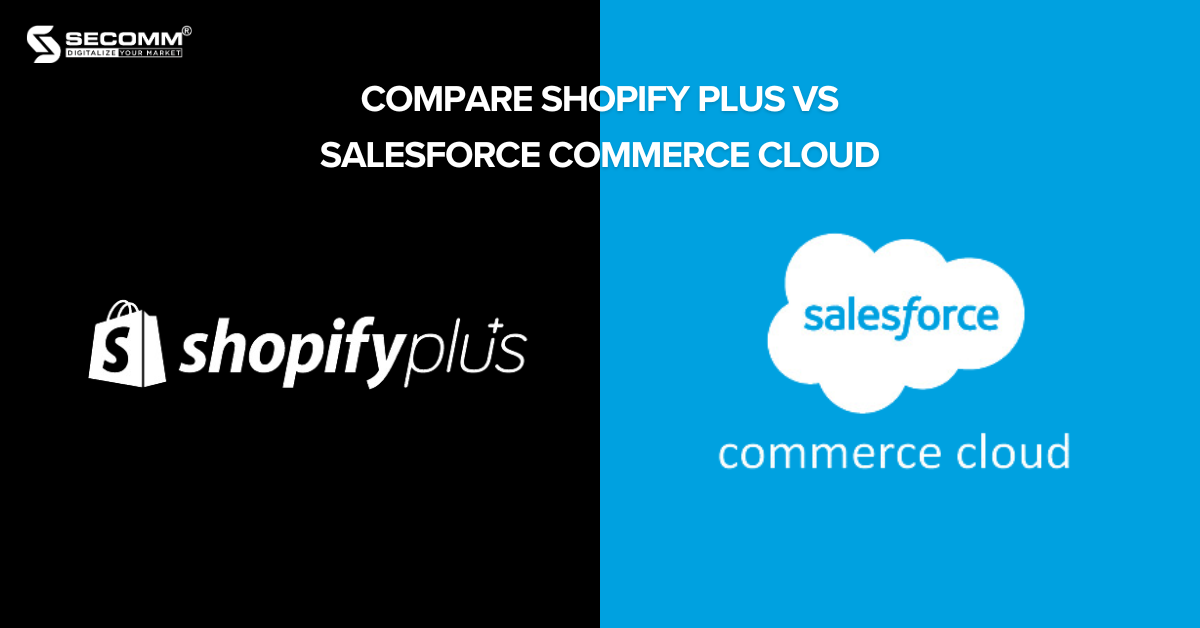
Shopify Plus vs Salesforce Commerce Cloud are two leading platforms chosen by large enterprises worldwide to build eCommerce websites. Each platform has its advantages, from the flexibility and user-friendliness of Shopify Plus to the comprehensive solutions offered by SFCC.
Understanding each system’s differences and strengths is crucial before deciding between these two platforms. Let’s explore and compare the capabilities of Shopify Plus and SFCC in detail to make the most suitable decision.
Read more: Shopify Plus vs Advanced: Which one is right for you?
Shopify Plus is a premium scalable platform version tailor-made for large enterprises. Launched in 2014, It rapidly emerged as the preferred option for those seeking efficient and adaptable expansion of their online operations. Unlike a fixed pricing model, Shopify Plus is customized according to specific deployment needs.
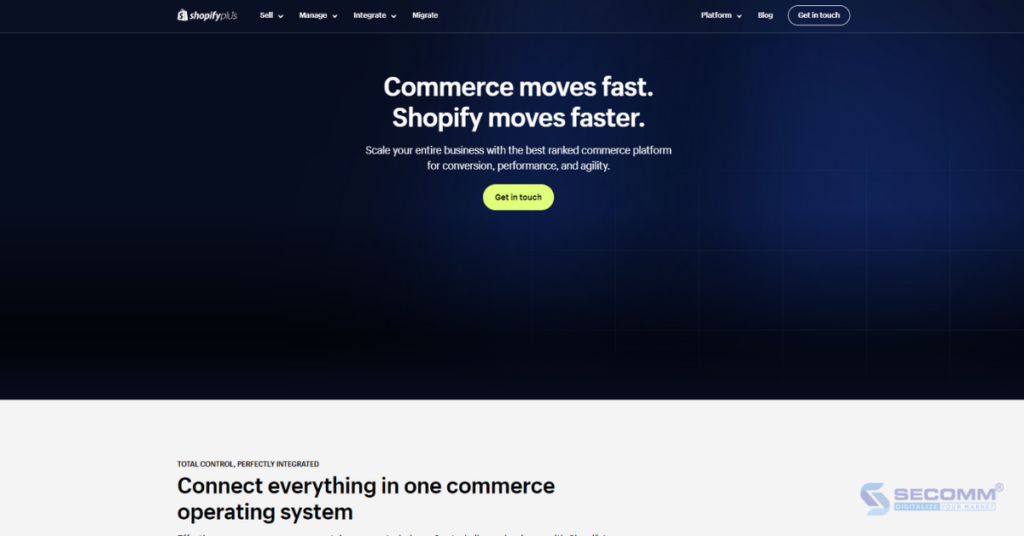
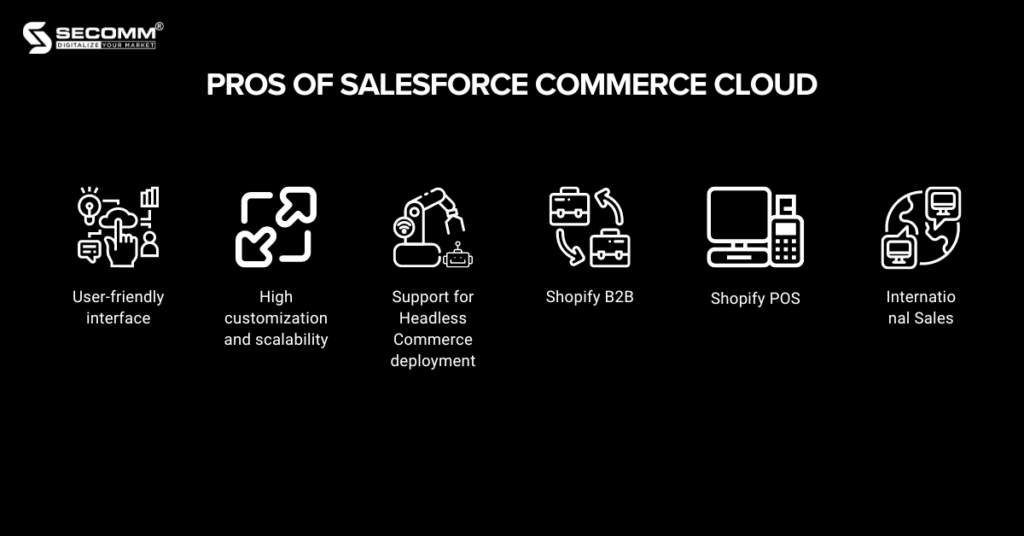
Salesforce Commerce Cloud (formerly known as Demandware) is a robust cloud-based eCommerce platform built on Salesforce’s infrastructure, one of the world’s largest CRM software companies.
SFCC provides a comprehensive system for operating online stores, from building and deploying shopping websites to managing orders, marketing, and customer service. With robust integration capabilities and intelligent analytics tools, SFCC helps businesses create unique online shopping experiences and enhance customer interaction.
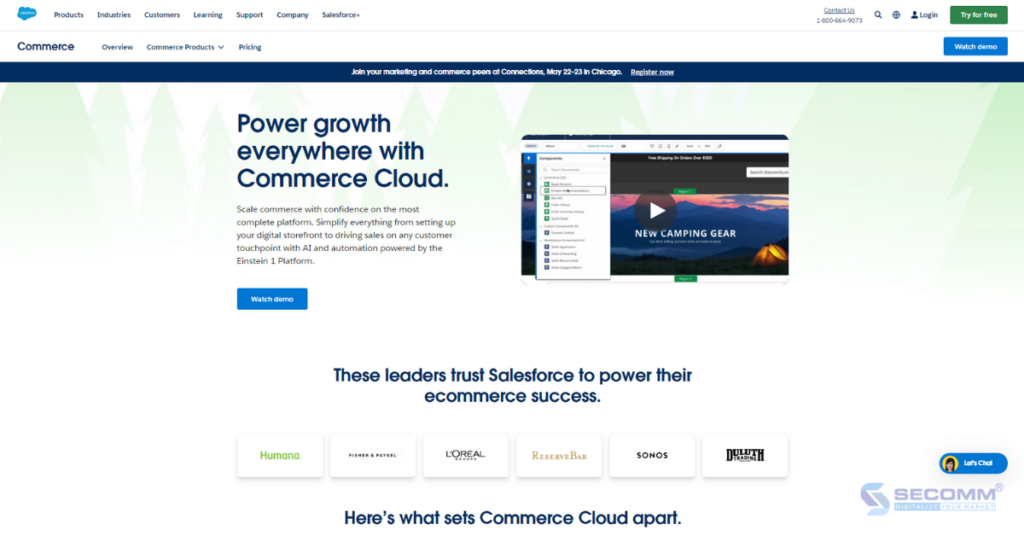
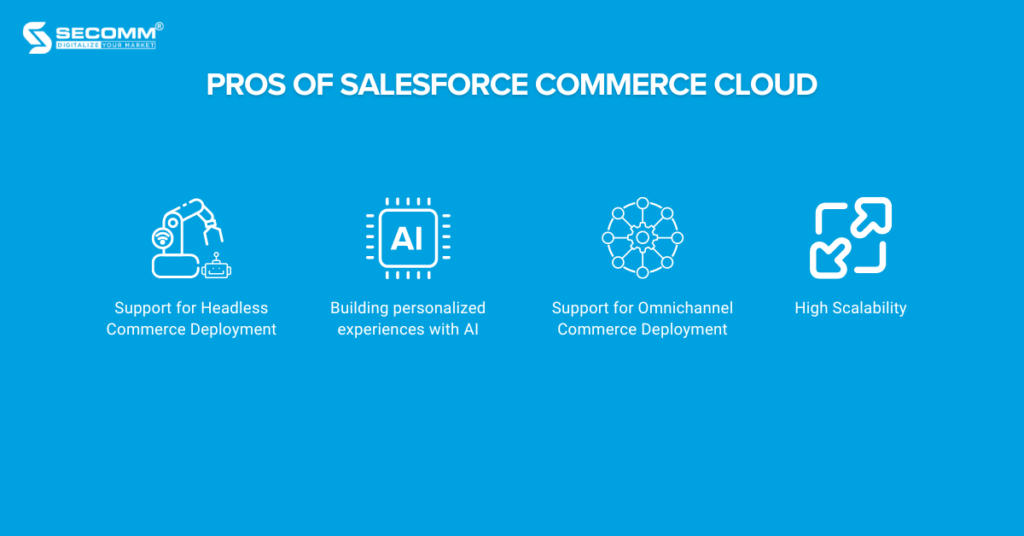
The Plus version costs from $2300/month but is not fixed and will be customized based on specific needs. For merchants reaching a revenue threshold of $800,000/month, the Plus usage fee will gradually increase based on GMV (0.25% GMV for months with revenue exceeding $800,000). Merchants often must spend an additional $1K – $5K/month to integrate third-party applications.
There are no exact figures for SFCC, as the cost is determined based on each merchant’s requirements. However, SFCC merchants with revenues around $20 million may have to pay about $200,000 – $600,000/year. Larger-scale enterprises with higher revenues may have platform fees totalling millions annually.
+ Customizes unique storefront with Hydrogen.
+ Seamless third-party integrations
+ Ultilize cutting-edge technologies like AI, VR/AR for enhanced customer experience
+ Offers flexibility for complex customizations
+ Requires expertise in SFCC and specific technical skills
+ Easily scales without slowing down website performance.
+ Provides a clear roadmap with over 100 product updates released twice a year
+ Continuously improves to keep your business ahead in eCommerce
+ Integrates seamlessly with other Salesforce systems but struggles with third-party apps
+ Updates regularly but at a slower pace compared to Shopify
Both platforms have rich features, differing mainly in focus and approach
Plus focuses on flexibility and ease of use, providing merchants with a more intuitive interface than SFCC. This platform is renowned for its seamless integration with various payment options, marketing tools, and sales channels. This flexibility has made Plus attractive and accessible to most merchants.
Additionally, Shopify Plus offers their merchants exclusive and custom solutions to effectively handle various aspects of eCommerce, such as Shopify POS, Shopify Market, Shopify Hydrogen, Shopify Checkouts, B2B on Shopify, and more.
SFCC, on the other hand, emphasises enterprise-level features such as integrated sales management tools, advanced search, order management, and promotion creation. Additionally, this platform excels in supporting international sales, advanced customer segmentation and personalization, as well as real-time dashboards and reports.
All of these features help businesses optimize eCommerce operations and drive growth.
Shopify Plus will be the ideal choice in the following cases:
Plus is designed specifically for large retailers with high demands for scale. With a range of exclusive solutions developed and continuously updated, this flexible eCommerce platform can effectively meet growth needs, allowing for easy scalability and customization.
With lower license fees compared to SFCC and the ability for quick deployment, Shopify Plus is a suitable option for businesses with moderate budgets or those needing to implement projects in a short time frame.
Plus is known for its user-friendly interface and high flexibility. Its drag-and-drop builder ensures that users of all technical levels can easily and efficiently set up an online store.
Shopify Plus’s infrastructure provides a seamless integration system with third-party applications and tools. This is a significant advantage if you need to integrate quickly with CRM applications, marketing tools, or other online sales channels.
If customer experience is a top priority, Shopify Plus offers many tools and features to easily and effectively optimize shopping experiences and customer interactions.
SFCC is a suite of solutions your eCommerce system needs to grow rapidly. If the following criteria apply, SFCC may be the more suitable choice:
If you have already used other Salesforce products and services such as Salesforce CRM, Marketing Cloud, or Service Cloud, choosing SFCC will optimize workflows and integrate customer data across your entire system.
SFCC is often the top choice for large enterprises with high deployment demands requiring flexibility in managing online stores. The platform provides powerful tools and features for customizing interfaces, managing complex product catalogs, and integrating with distinct business processes.
Built on the infrastructure of Salesforce, one of the world’s largest cloud technology service providers, SFCC offers high levels of security and reliability, best for those with important customer data and information.
SFCC provides tools to help you better understand customer shopping behavior and optimize business strategies. This enhances the shopping experience and increases sales revenue.
In today’s highly competitive eCommerce landscape, selecting the appropriate platform is crucial for your business success. This article has provided an overview of the top two choices, Shopify Plus and SFCC.
When it comes to making a decision, careful consideration of the specific needs is essential, from scale and goals to budget and technical requirements, to make the most appropriate choice.
Need help making the right decision? Contact SECOMM or call (028) 7108 9908 immediately!
 4
4
 2,105
2,105
 0
0
 2
2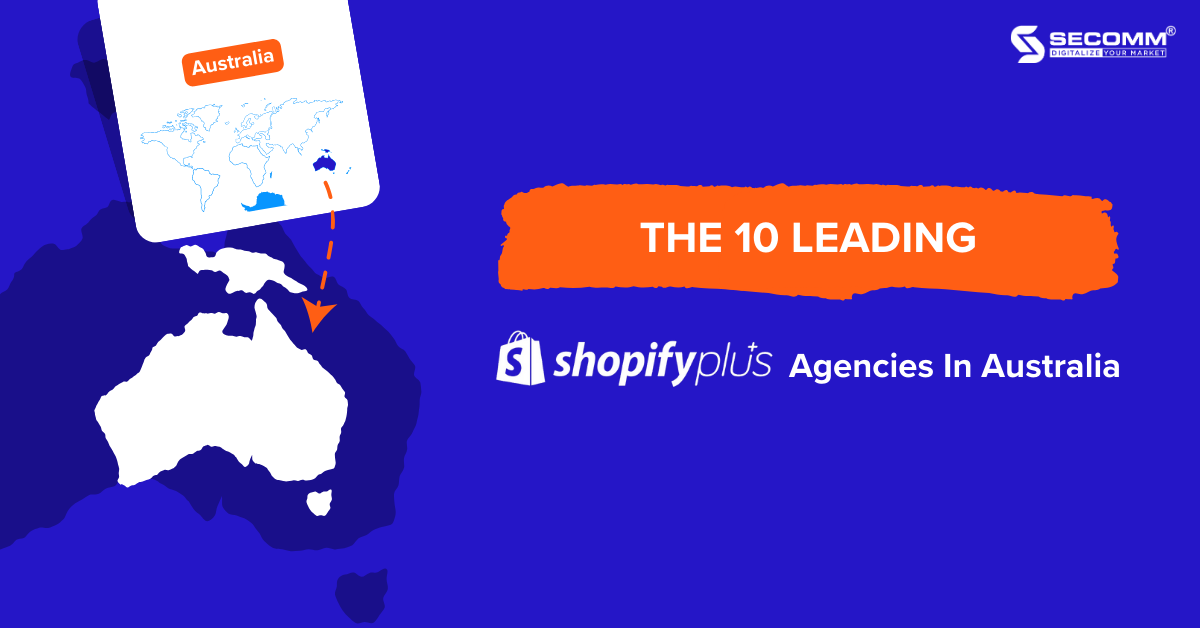
The Shopify Plus agencies in Australia are more than just experts in this eCommerce platform; they’re also dependable allies in your online business growth. The Australian eCommerce market has experienced significant expansion in recent years, so choosing the right Shopify Plus development partner is a pivotal strategic move.
In this article, we’ll outline Australia’s top 10 premier Shopify Plus developers and the criteria for selecting the ideal partner for your eCommerce development project.
Read more: Top 10 Shopify Plus eCommerce websites in Australia
Shopify Plus is an advanced eCommerce platform tailored for large enterprises that aim to expand their business operations and elevate their customers’ online shopping experience. It offers a robust infrastructure for building custom eCommerce websites and flexible scalability for seamless integration with third-party applications.
Moreover, the platform continuously evolves and enhances its exclusive solutions, empowering businesses to operate more efficiently and deliver an exceptional customer experience.
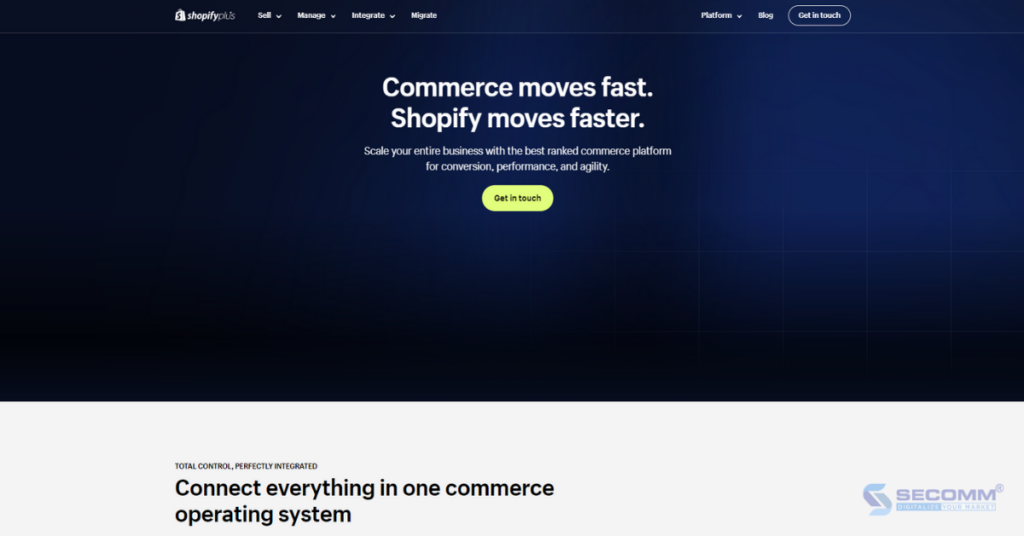
Read more: 15 reasons to migrate to Shopify Plus
This is an important question that many businesses often ask when starting their eCommerce projects. Below are some reasons why collaborating with a Shopify Plus development company:
Shopify Plus developers typically have teams of experts highly skilled in this platform. Most companies will participate in the Shopify Plus Partners program, receiving technical support, educational resources, commissions, and branding.
Moreover, these developers must demonstrate that they meet the standards to become official Shopify Plus partners. Therefore, collaborating with them will help businesses launch their eCommerce websites quickly while utilizing features and integrations to optimize business performance.
Partnering with Shopify Plus agencies can save time and costs compared to independently building and managing an eCommerce website.
Collaboration becomes even more valuable when tight deadlines and rapid online store deployment are required. These developers already have the tools, processes, and experience to efficiently and swiftly deploy projects.
It is crucial to ensure smooth and stable website operation after launch. Shopify Plus developers often provide continuous support services after the project is completed.
This involves the ongoing maintenance and management of the website, along with technical assistance, to ensure seamless operation and constant alignment with Shopify Plus’s latest features.
Read more: Shopify Plus and Advanced: Which one is right for you?
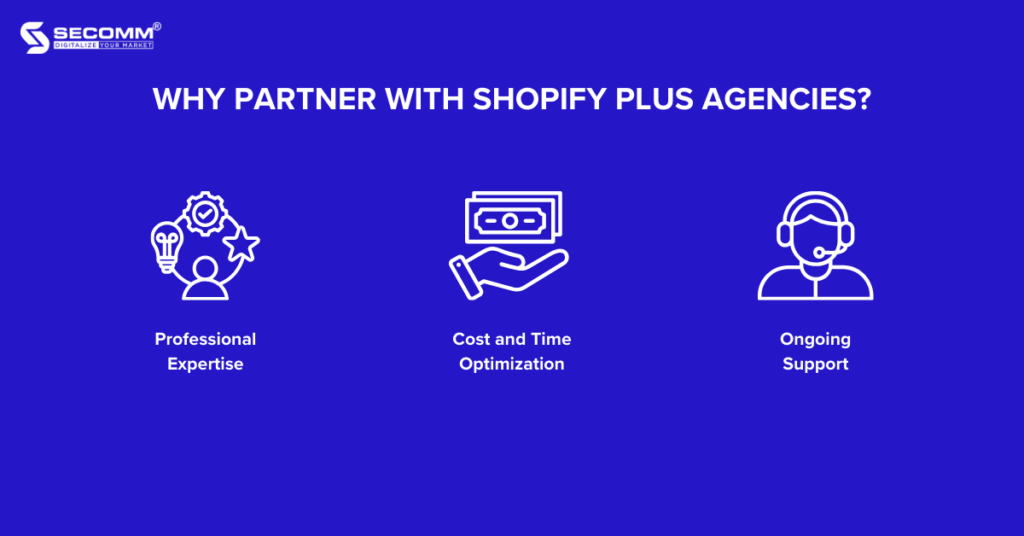
Partnering with any development company in Australia can greatly influence the success or failure of a Shopify Plus implementation project. Here are four key criteria to consider when seeking a suitable developer:
A thorough understanding and experience with this platform are essential when developing an eCommerce project with Shopify Plus. Therefore, this is the primary point to evaluate any potential development agency.
You must ensure that the chosen developer has the knowledge and skills to implement the Shopify Plus platform. They need a team of capable experts to build, customize, and optimize eCommerce websites based on specific.
Designing and building a website with a customized shopping experience tailored to the needs of Australian consumers isn’t an easy task. This requires technical skills and expertise in the Shopify Plus platform and a deep understanding of how the Australian eCommerce market operates.
Therefore, developers need to understand the target audience, their shopping behaviours, legal regulations, and other factors related to the distinctive business culture in this country.
Evaluating feedback from previous clients can be valuable in the decision-making process. You can check reviews from various sources and clients to ensure objectivity and transparency. The Shopify Plus developer must have the necessary skills and experience to complete the eCommerce project as required.
When your Shopify Plus website is done and launched, you must pay attention to technical support and maintenance. That’s why should opt for a development agency dedicated to providing prompt support and ongoing maintenance after completing the project.
This ensures the website’s stability, swift resolution of technical glitches, and consistent security updates to keep the site current with the latest platform versions.
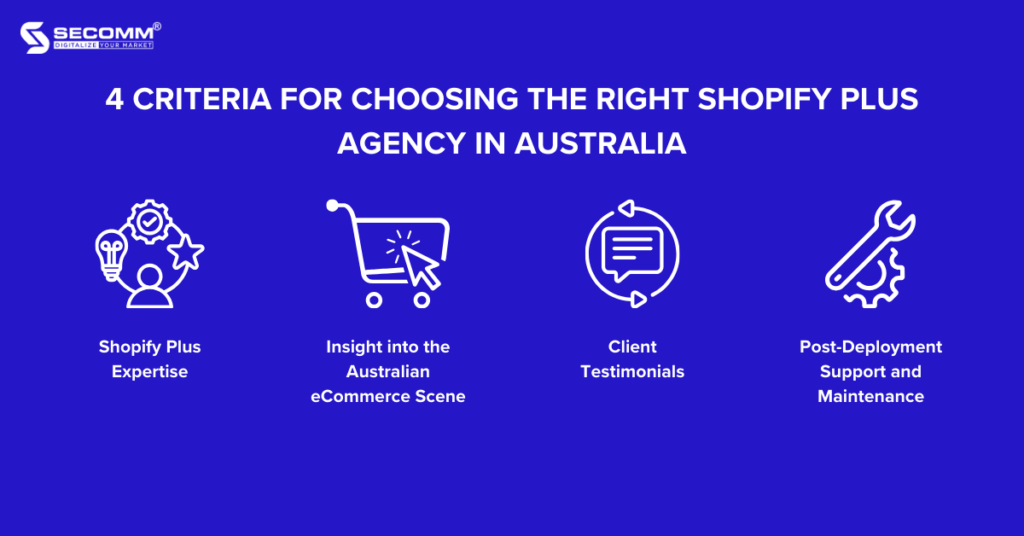
The continuous growth of the Australian eCommerce market has led to an increasing demand for collaboration with top-notch developers, especially those specializing in the Shopify Plus platform. Below are the top 10 Shopify Plus development companies in Australia:
With over 10 years of experience in the eCommerce industry, SECOMM is one of the trustworthy Shopify Plus developers in Australia. SECOMM can design and build Shopify Plus eCommerce websites, implement Headless Shopify Hydrogen, migrate platforms to Shopify Plus, and provide related services.
Moreover, the company offers various custom solutions based on different technology platforms such as Magento, WordPress, WooCommerce, and commercetools. With a team of talented and professional experts, SECOMM ensures the success of eCommerce projects collaborating with Australian clients. Notable among these are Laybyland, Trentham Estate, The Rod Shop, and Seconds Deals.
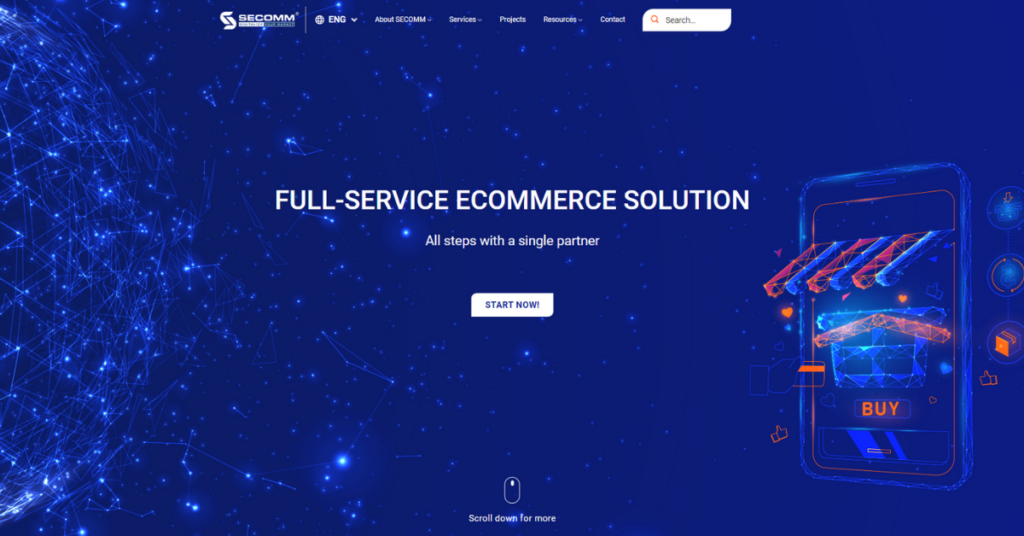
Dive Digital provides eCommerce consulting services, UI/UX design, and Shopify website development. Its solutions optimise customers’ online shopping experiences and enhance business performance.
10SQ aims to become the leading Shopify Plus development company in Australia, making it easy for businesses to access specialized services for this platform. Here, businesses can find customized solutions to expand and enhance their eCommerce systems efficiently.
Aron gathers highly skilled eCommerce developers proficient in various platforms and technologies, including Shopify Plus. The company has expanded its operations to many countries beyond Australia, such as the United States, the United Kingdom, and India.
Clean Commit is a reliable partner with high expertise in developing and optimizing websites on the Shopify Plus platform. They are committed to providing effective and sustainable solutions for businesses.
Magneto IT Solutions is a Shopify Plus developer with diverse industry experience. They offer customized and professional solutions to meet the specific requirements of businesses.
In Australia, Acidgreen is renowned as a leading developer of eCommerce websites, excelling in Magento and Shopify Plus. The team’s experience and expertise in open-source and SaaS platforms are sufficient to maintain the company’s position in the market
This company develops solutions for businesses in Australia and New Zealand looking to implement eCommerce with Shopify Plus. Additionally, they provide continuous support even after the project is completed.
Pipelabs’ solutions aim to deploy Omnichannel eCommerce on the Shopify Plus platform. Numerous projects’ success and positive reviews from previous clients attest to Pipelabs’ capabilities.
Moustache Republic is among the clients looking to implement Shopify Plus and BigCommerce. They provide solutions for eCommerce deployment based on these two platforms and offer seamless and efficient platform migration solutions.
The partners mentioned above are just a few of Australia’s skilled and trustworthy Shopify Plus developers. Choosing the most suitable partner to ensure your eCommerce objectives’ success and sustainable growth depends on your project’s specific requirements.
Start with Shopify Plus today with specialised solutions from SECOMM. Contact us or call (+84)28 7108 9908 for a free consultation!
 2
2
 1,983
1,983
 0
0
 1
1Subscribe to get the latest eBook!
Hotline